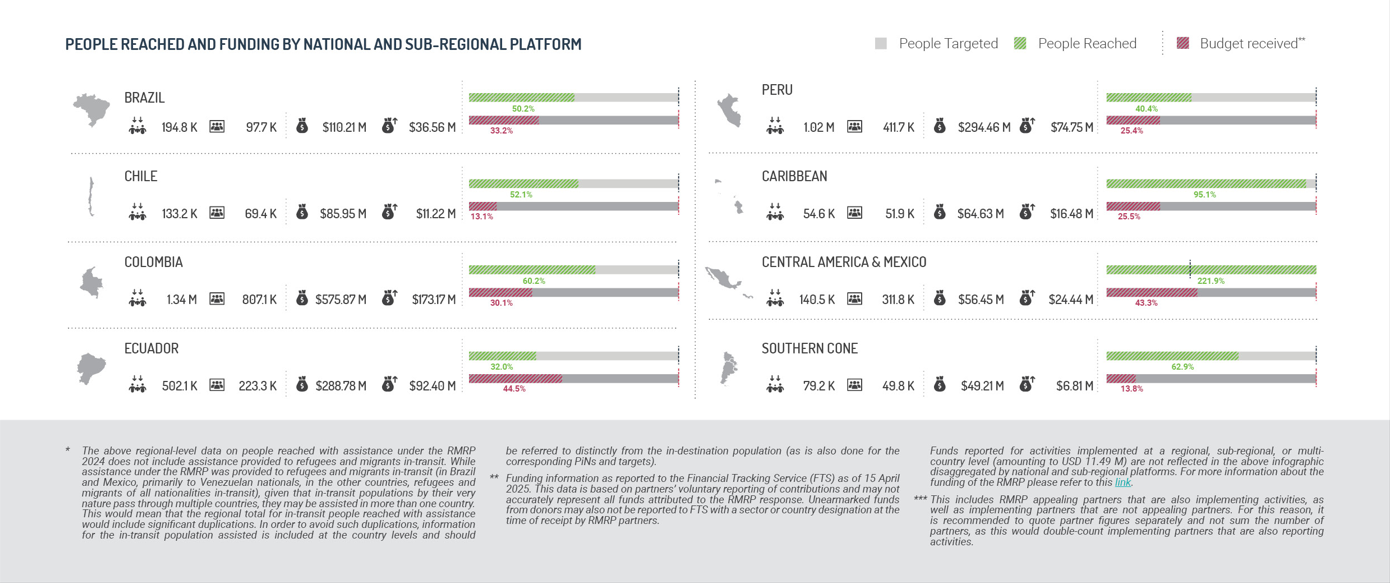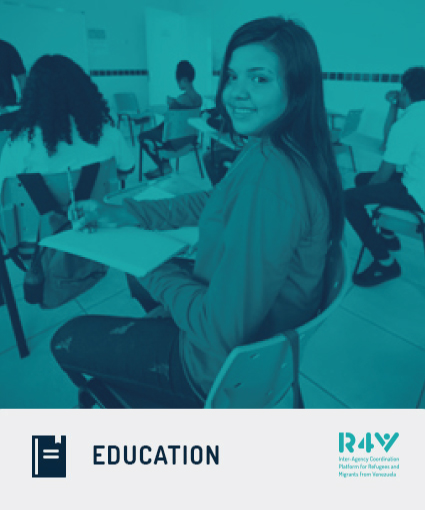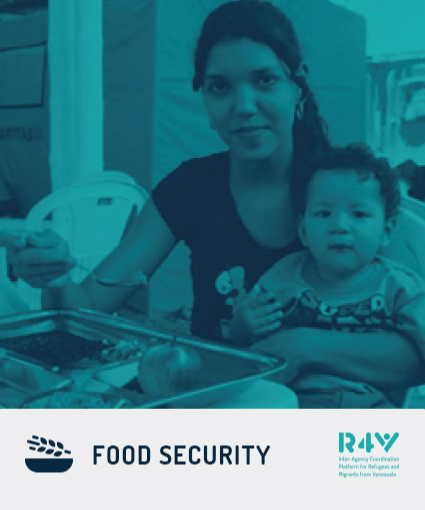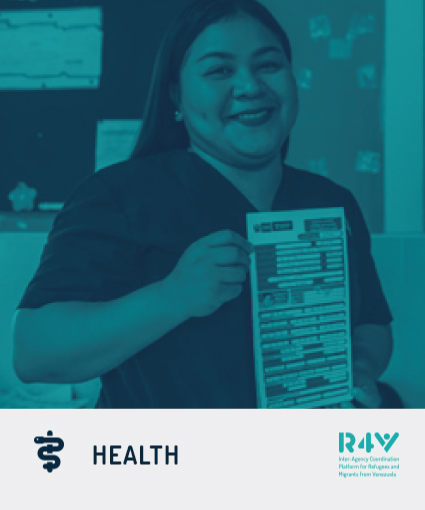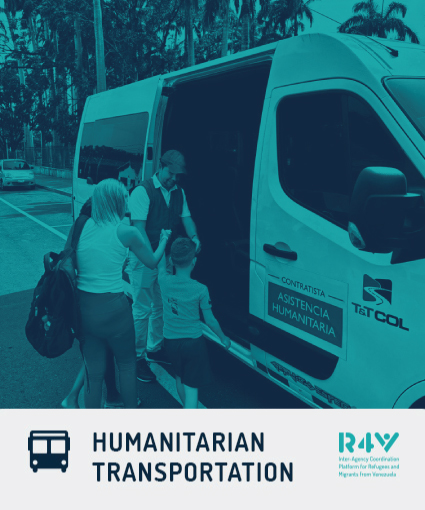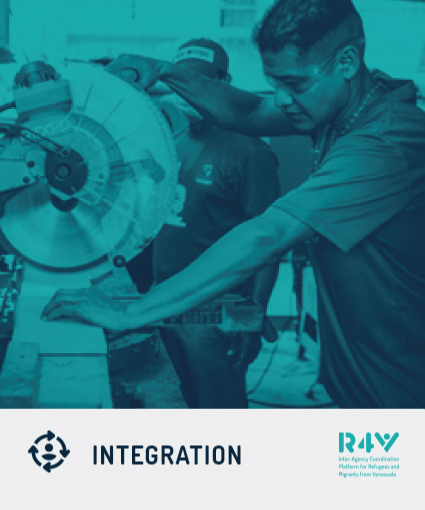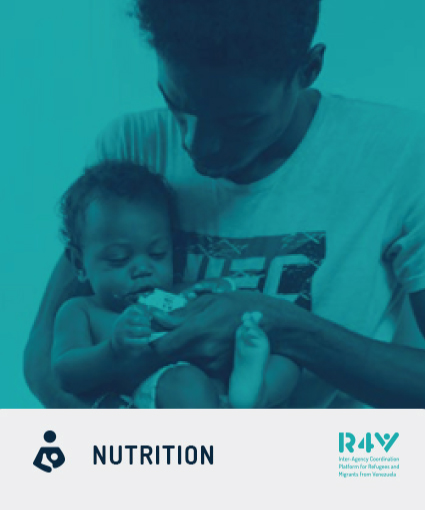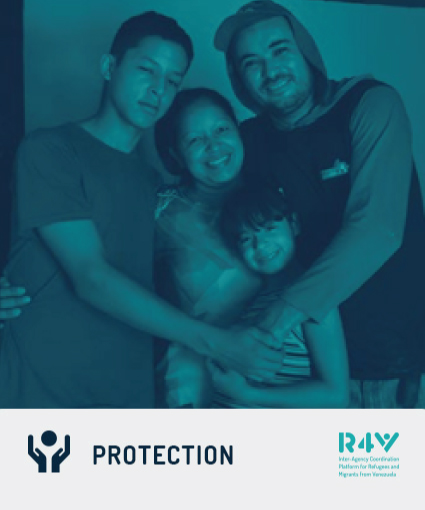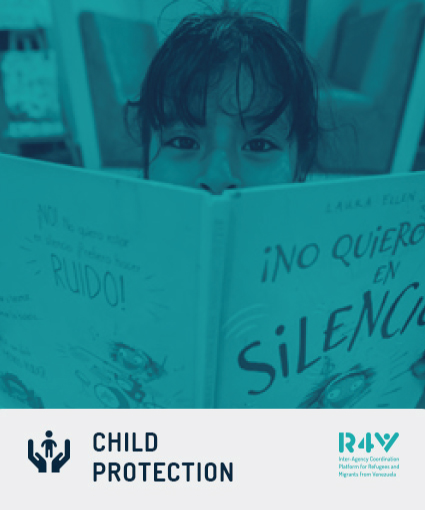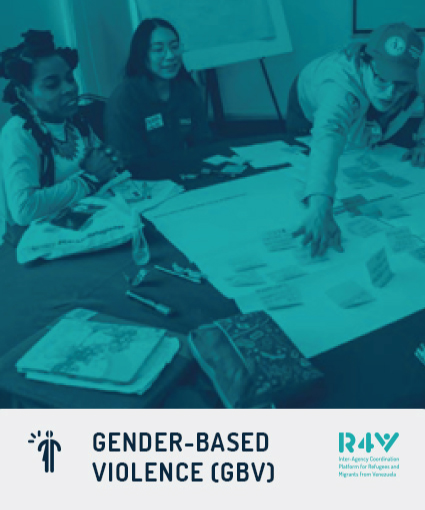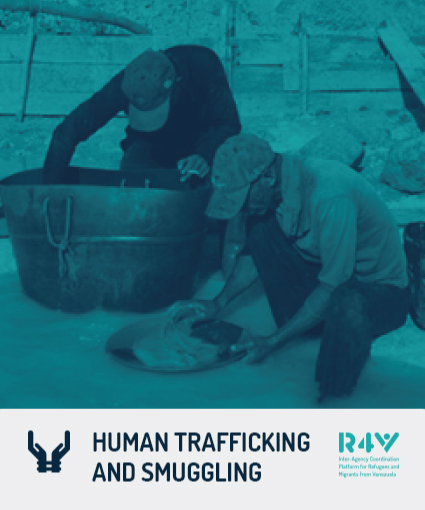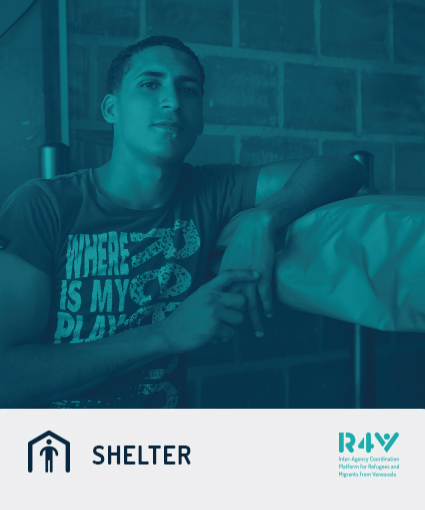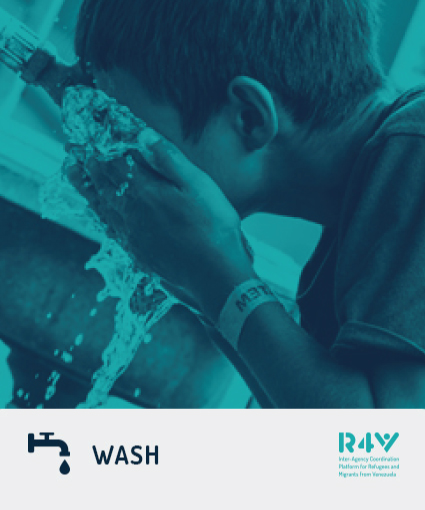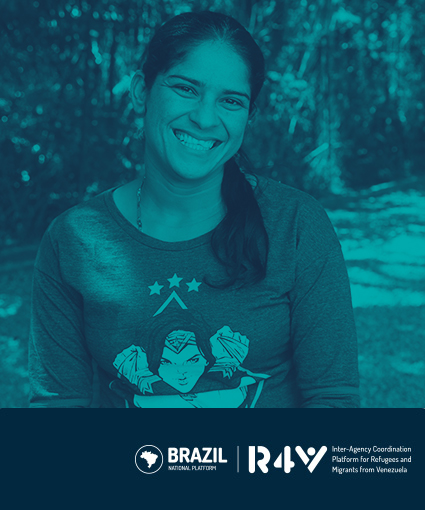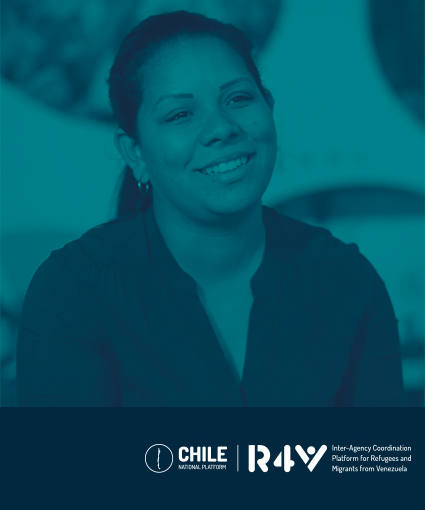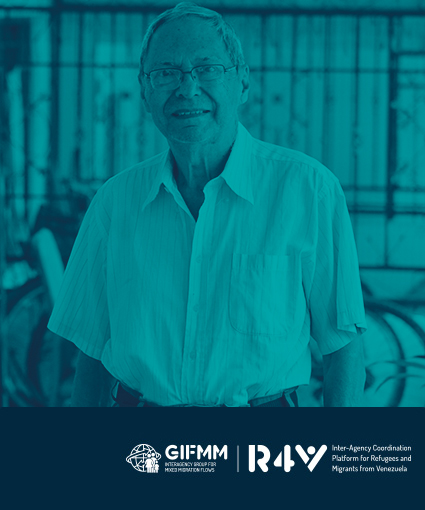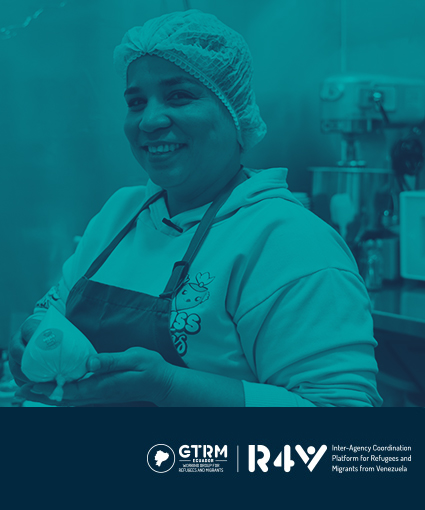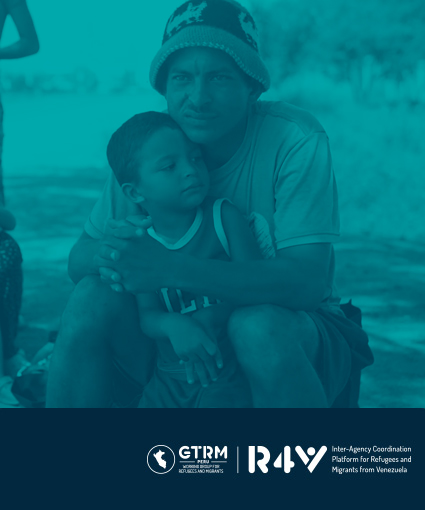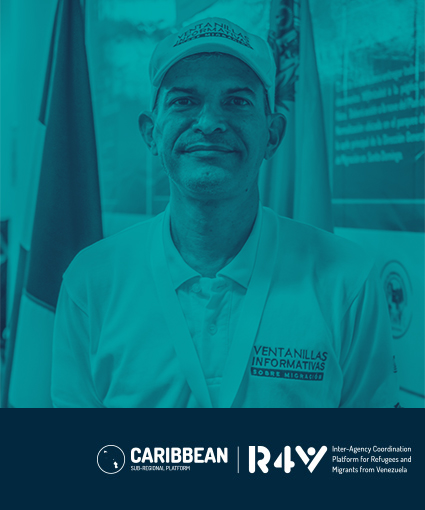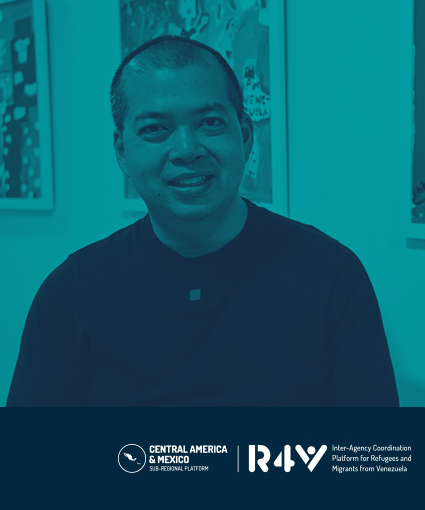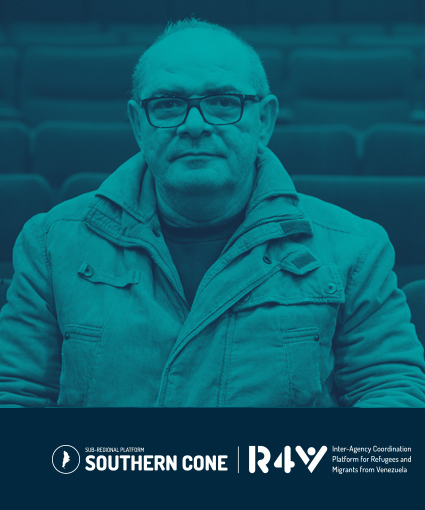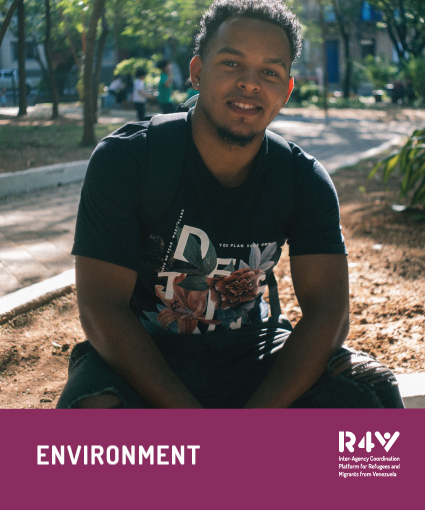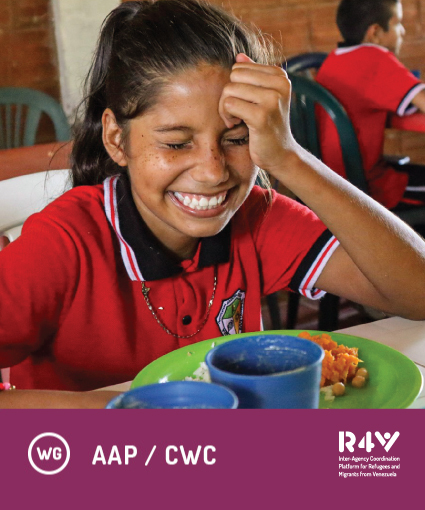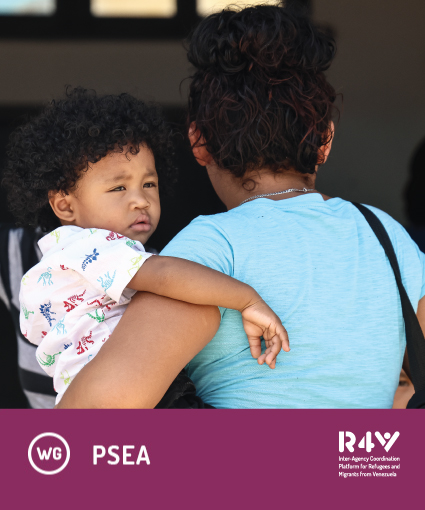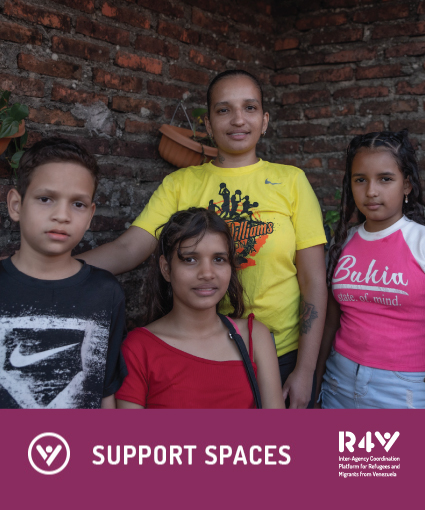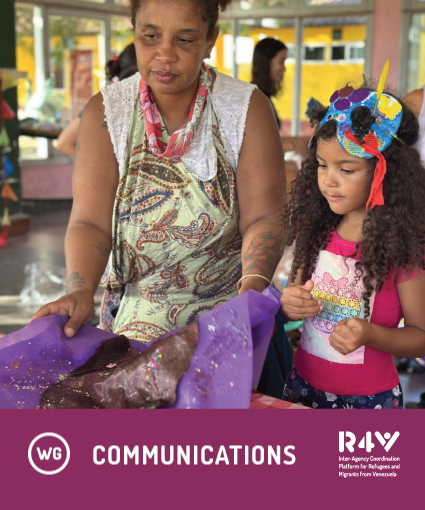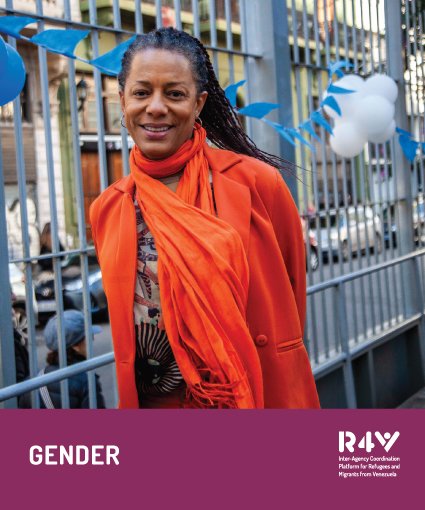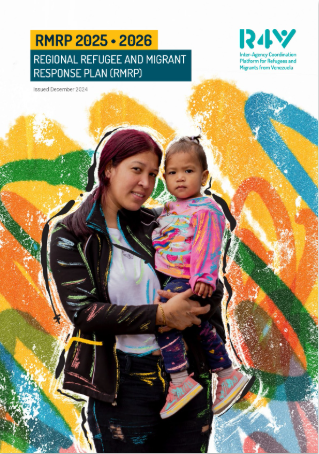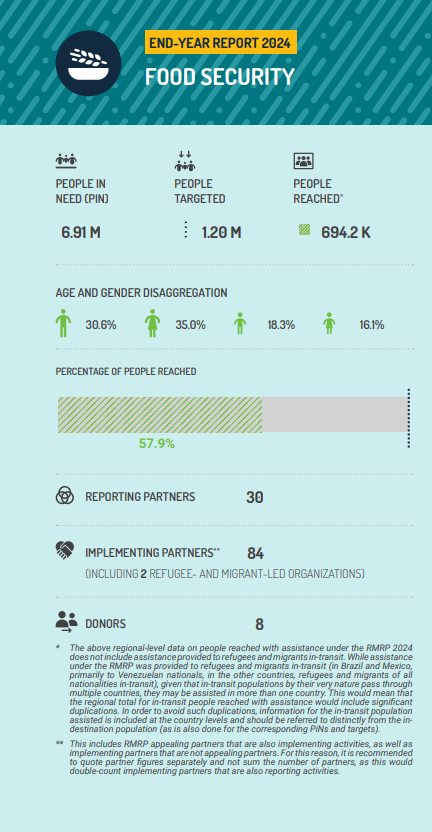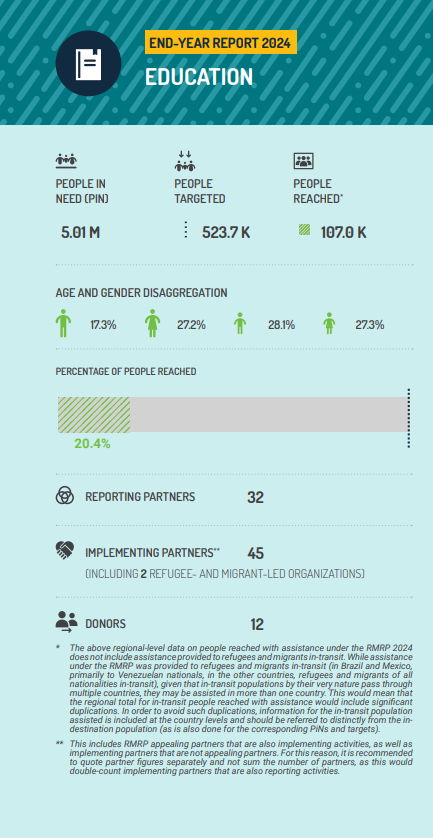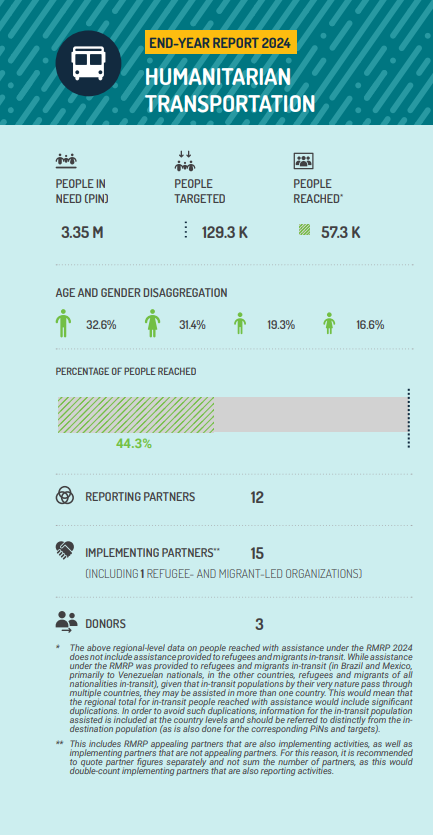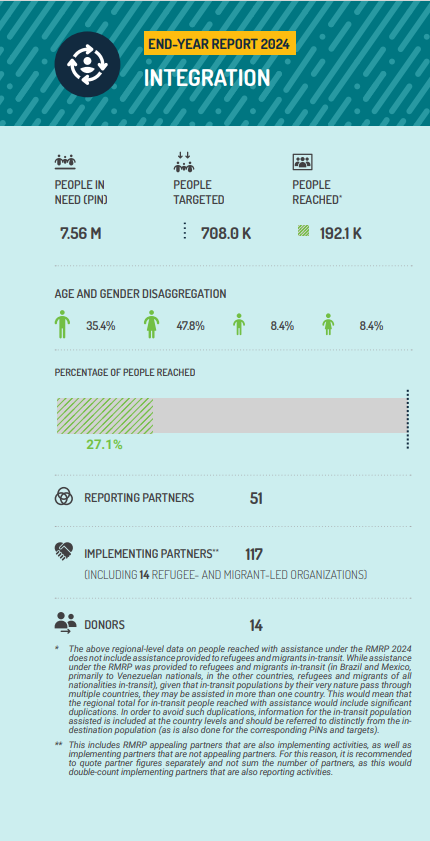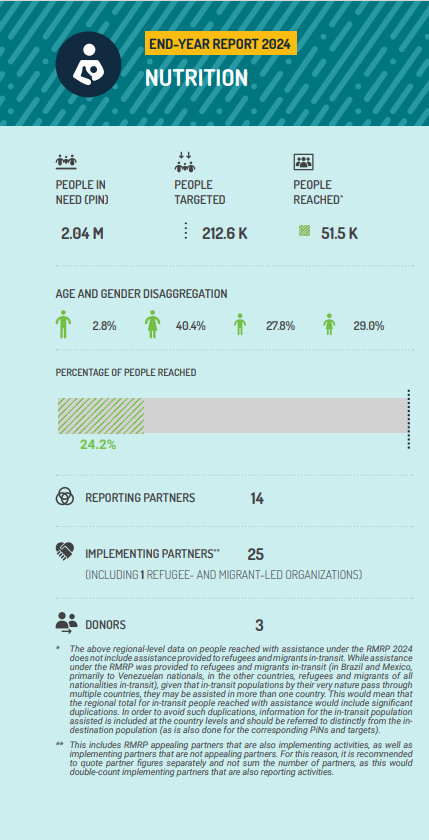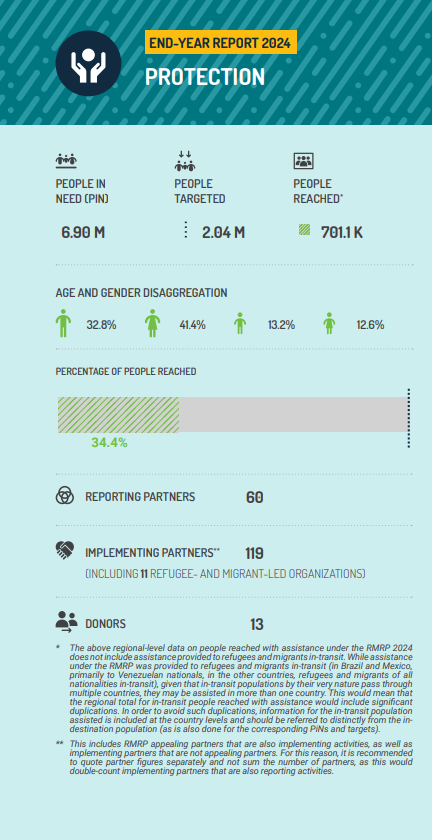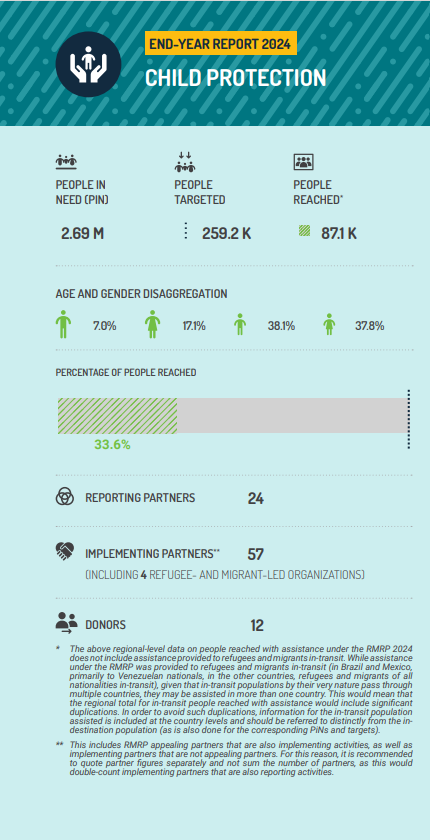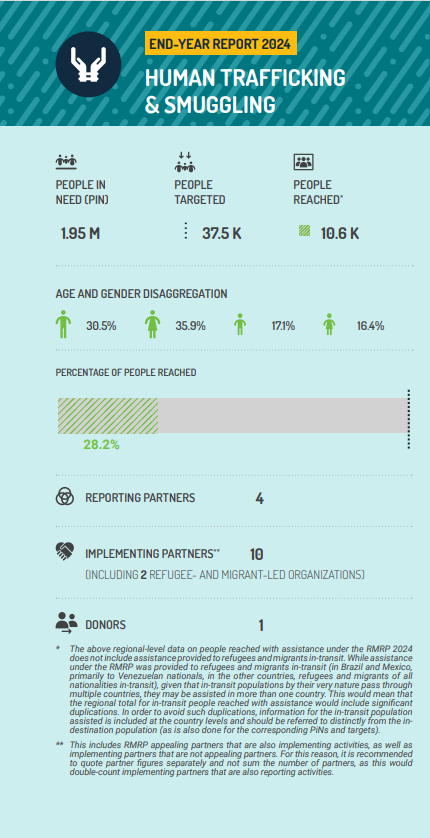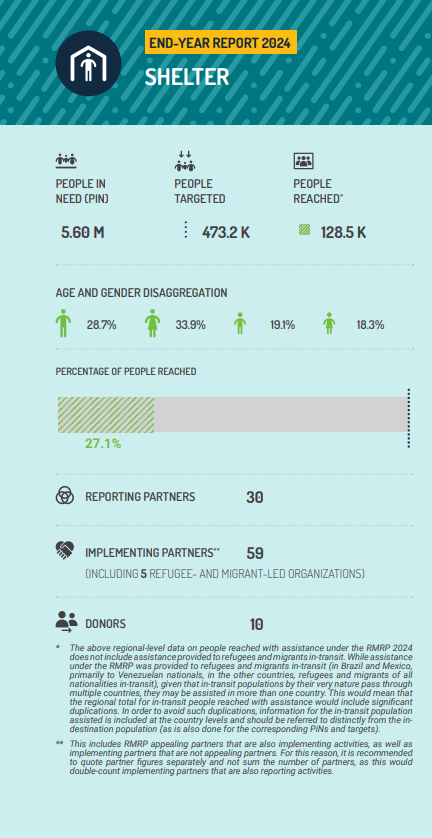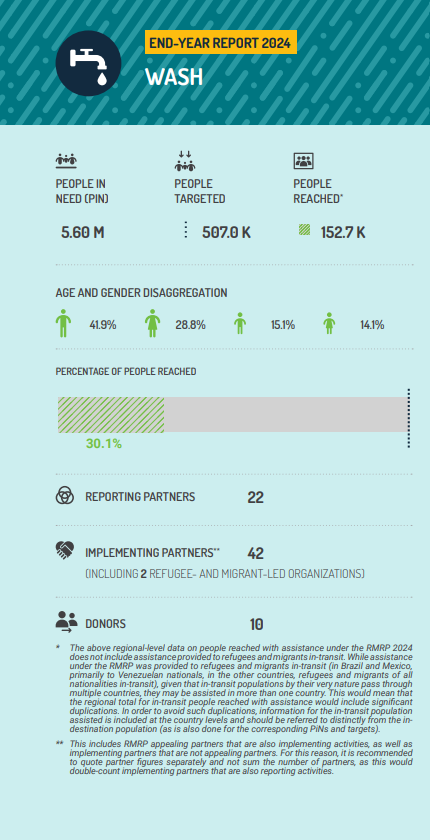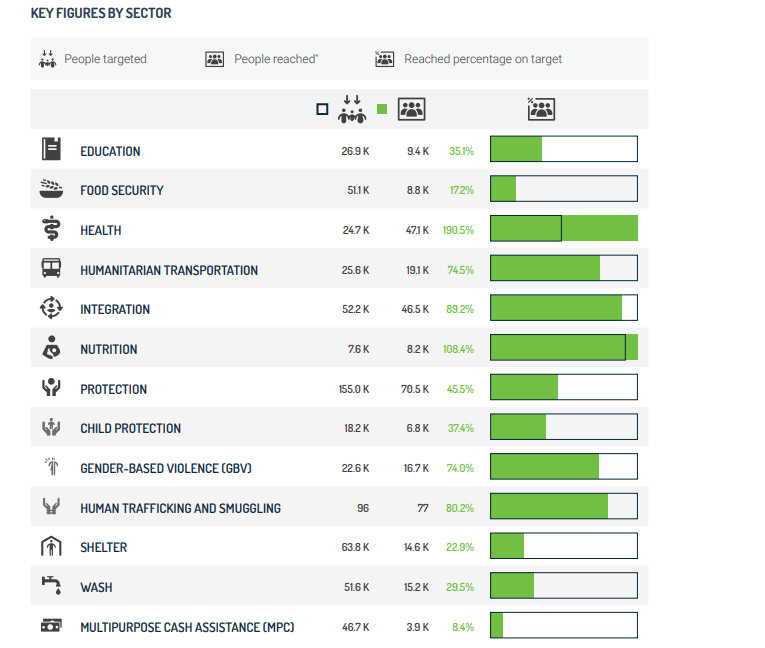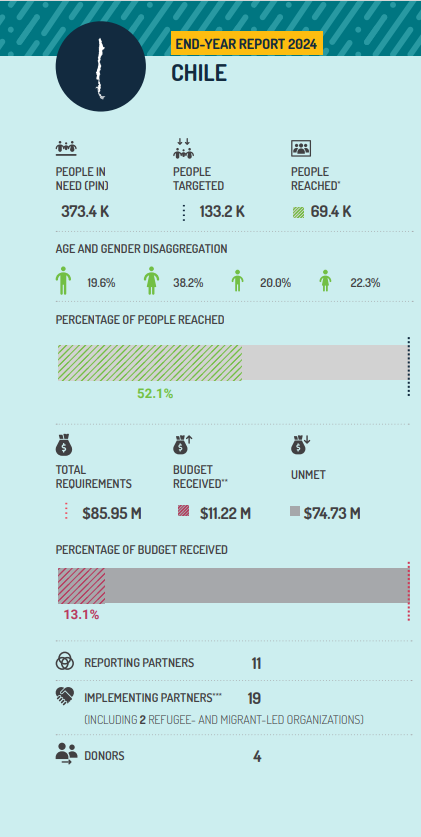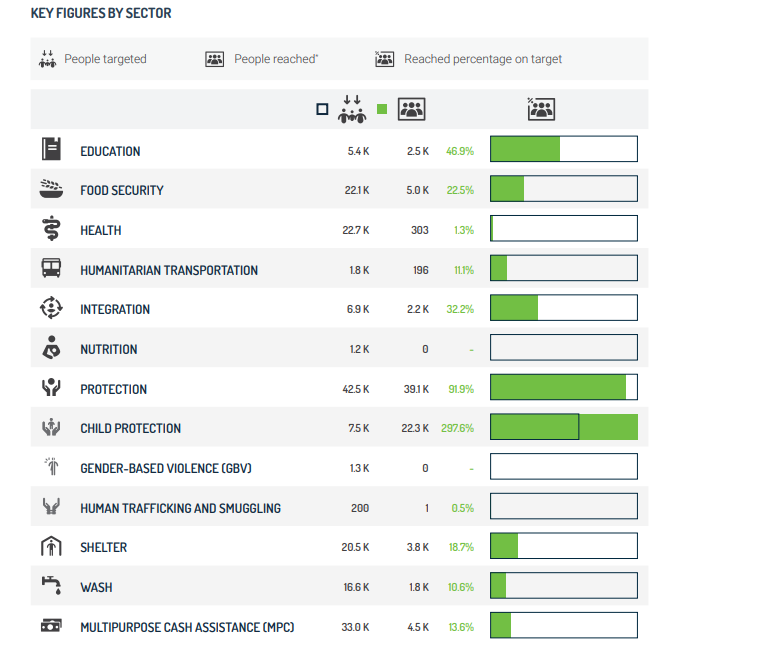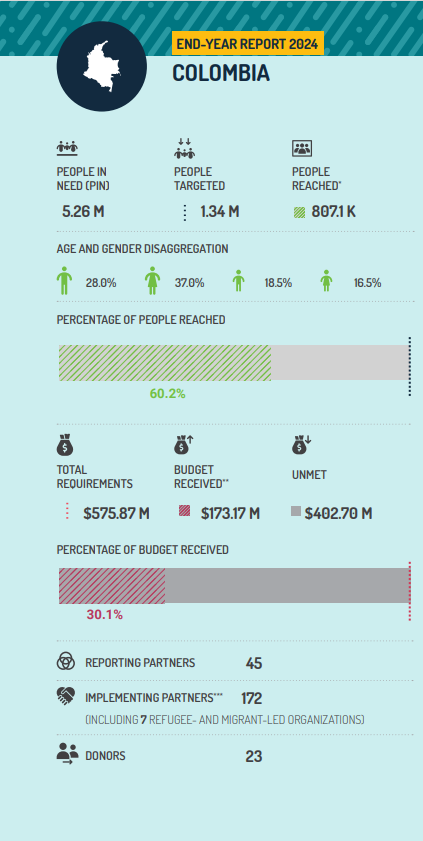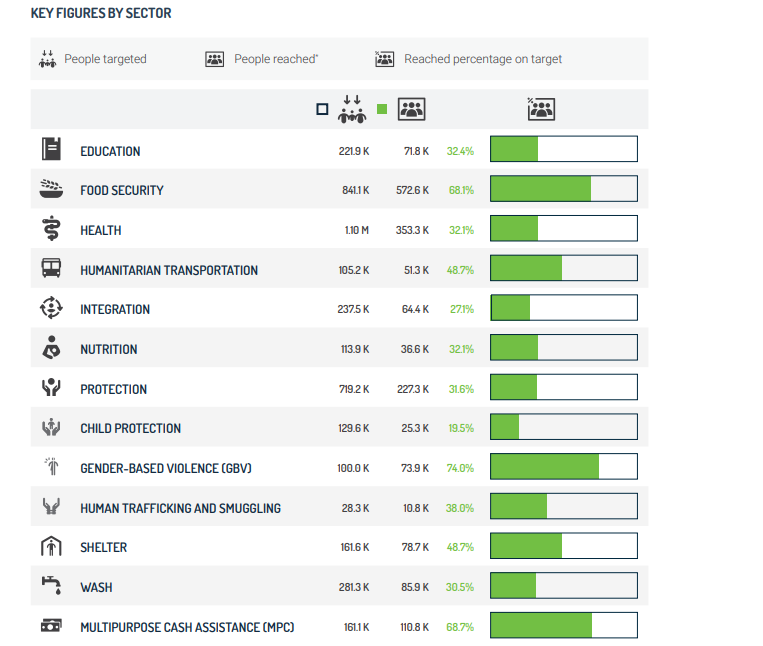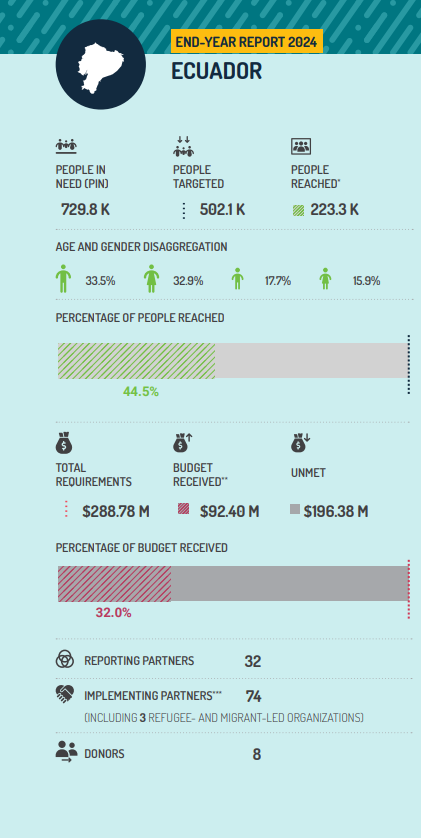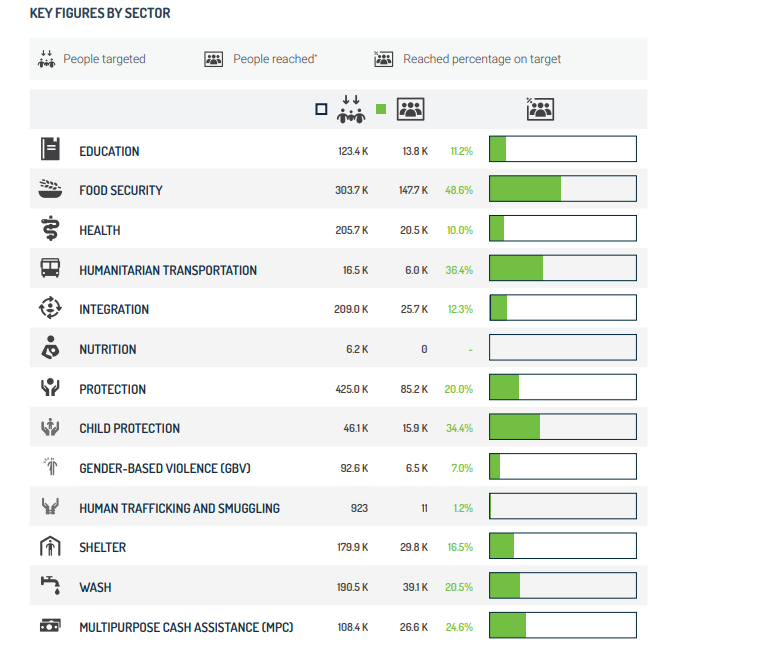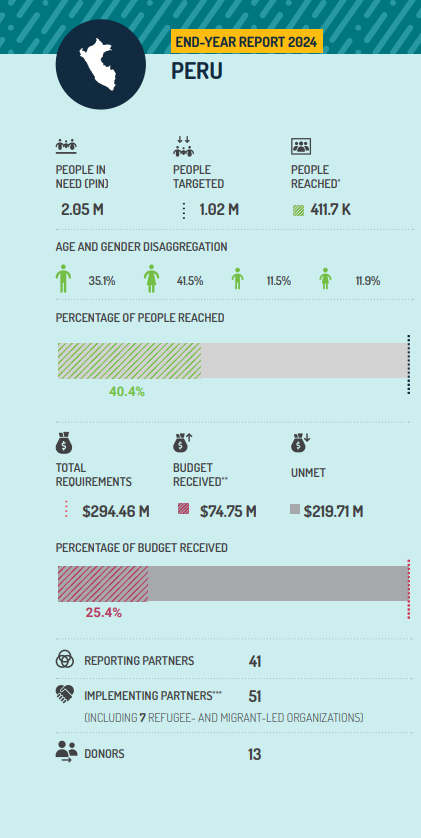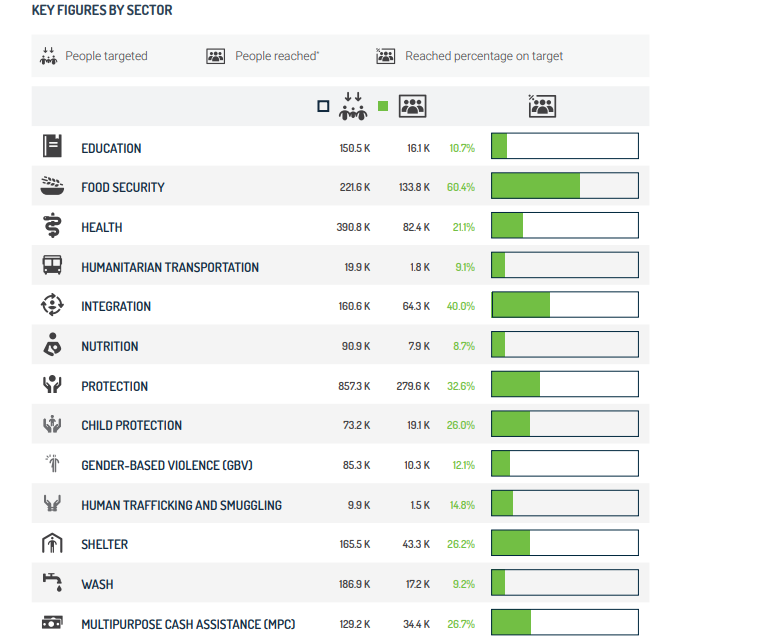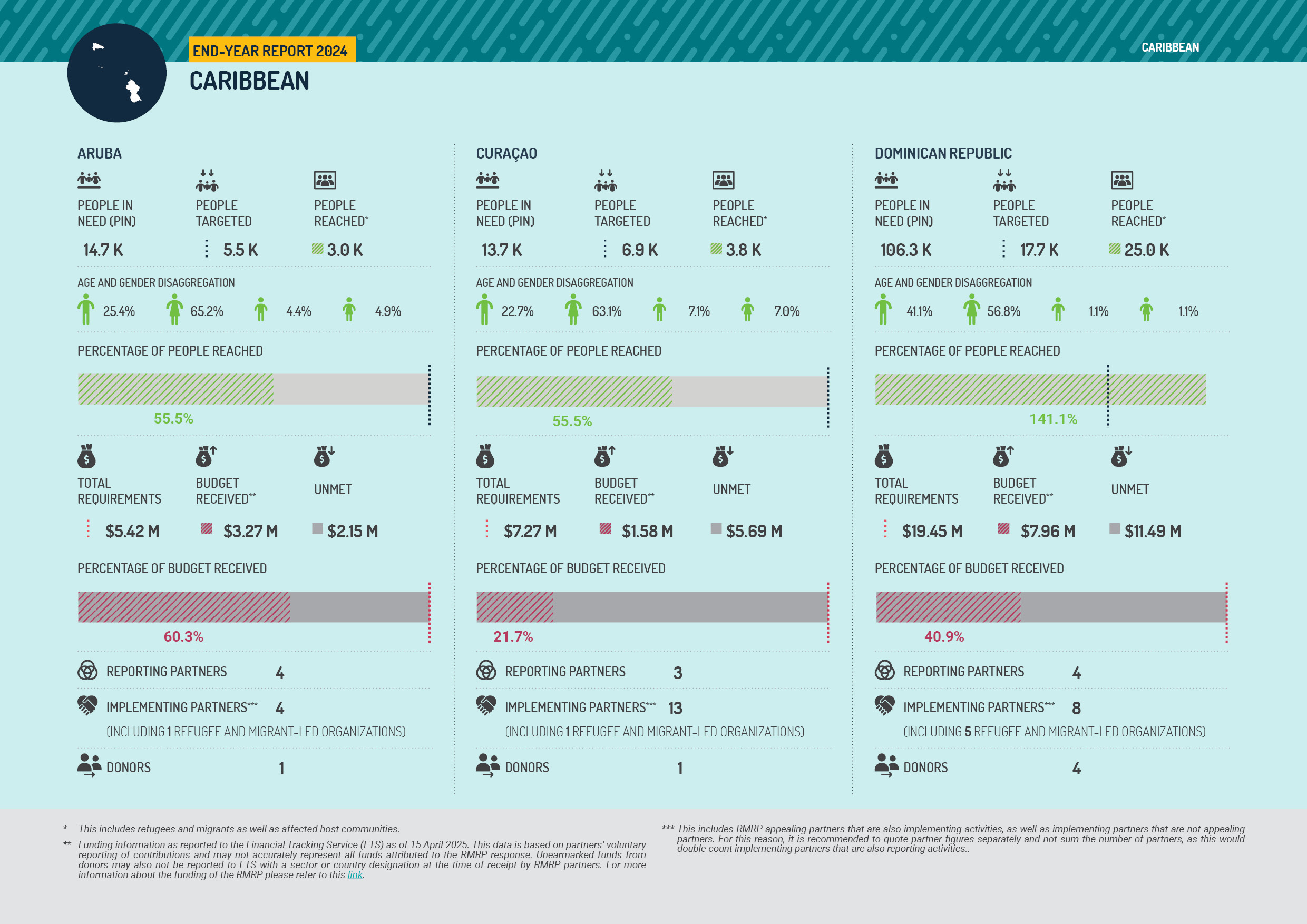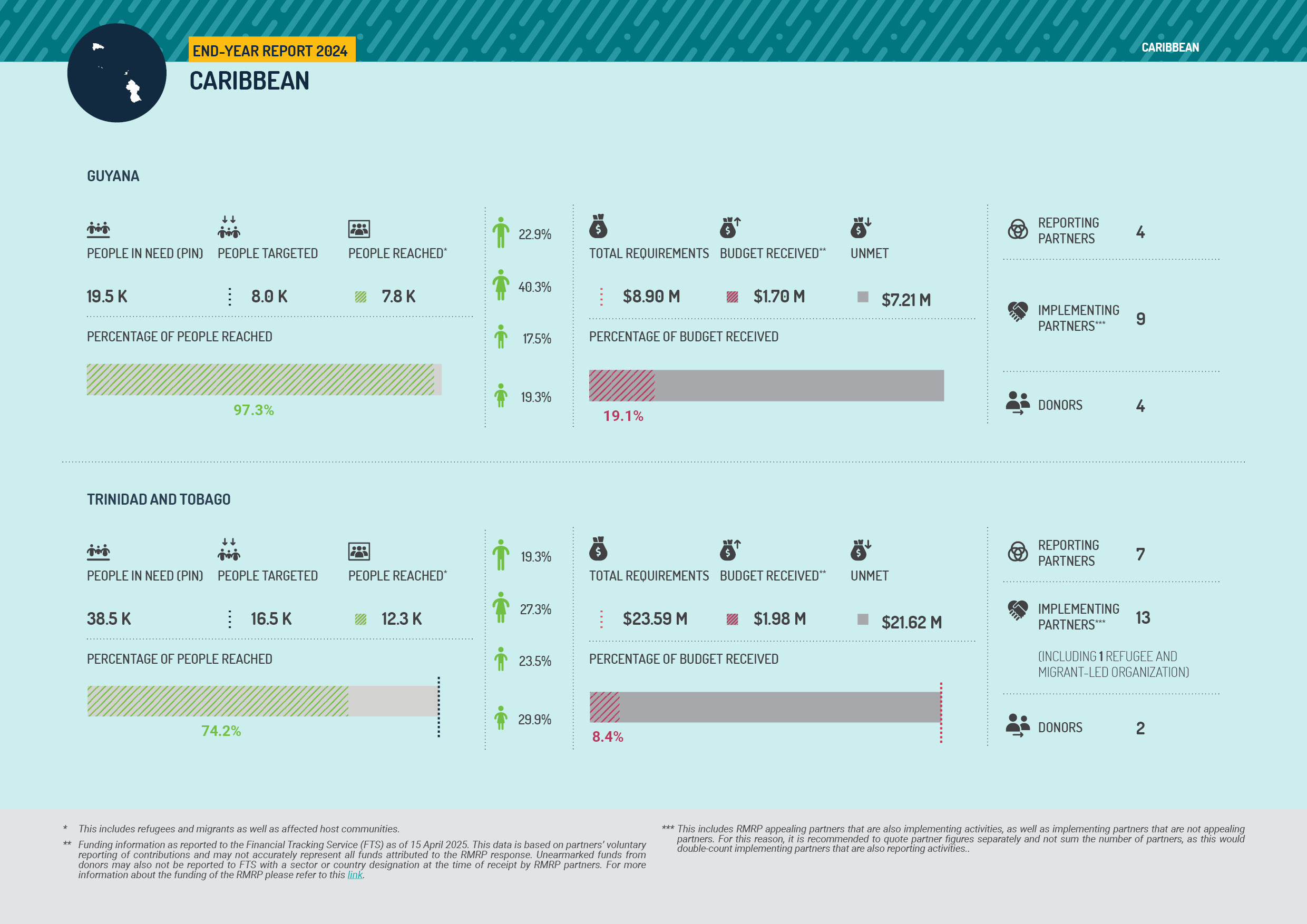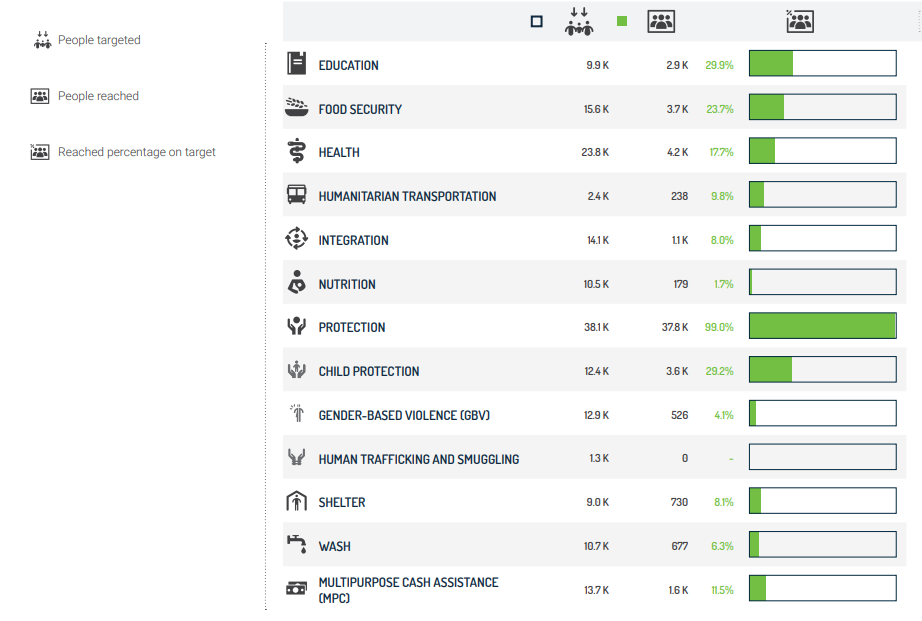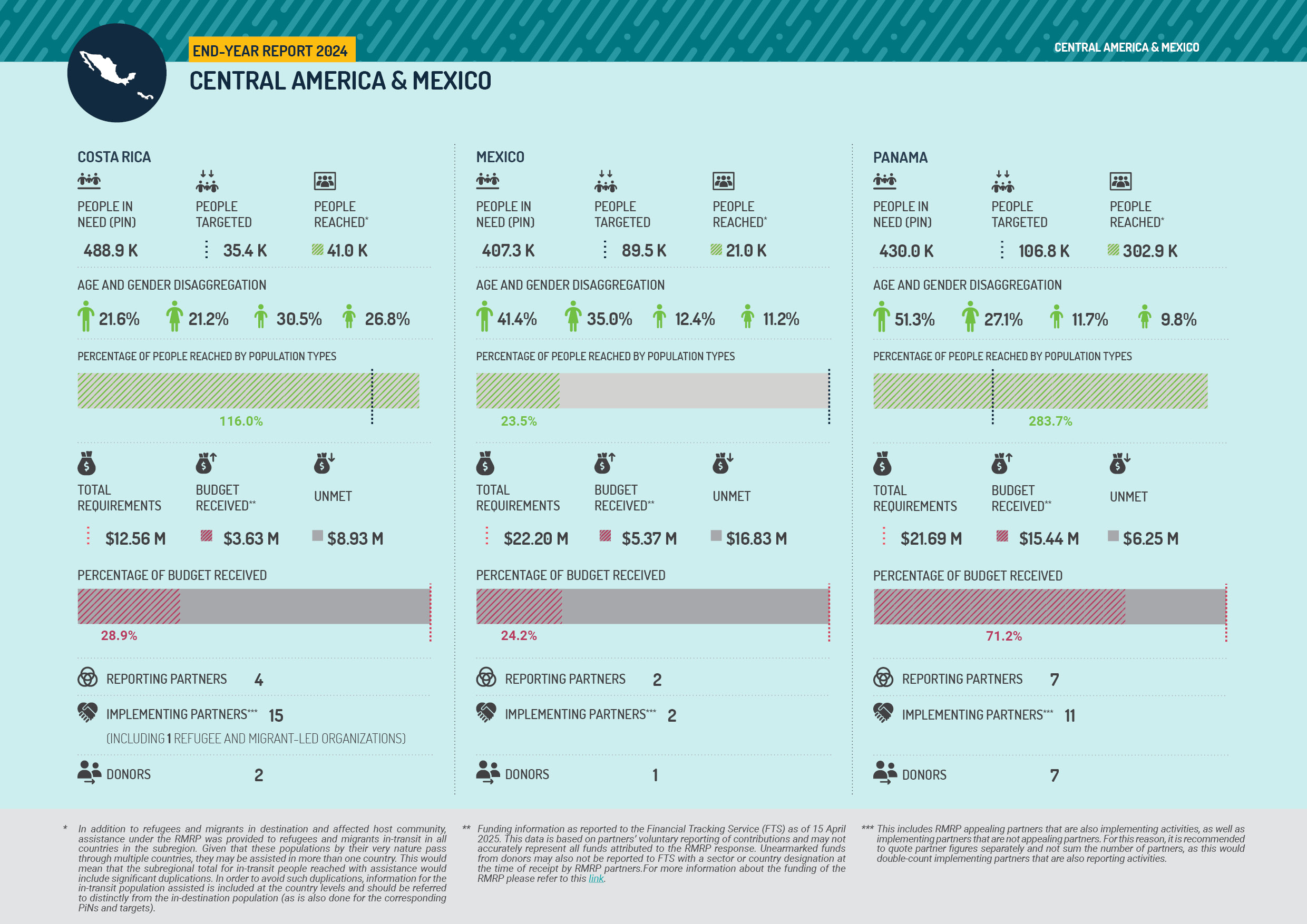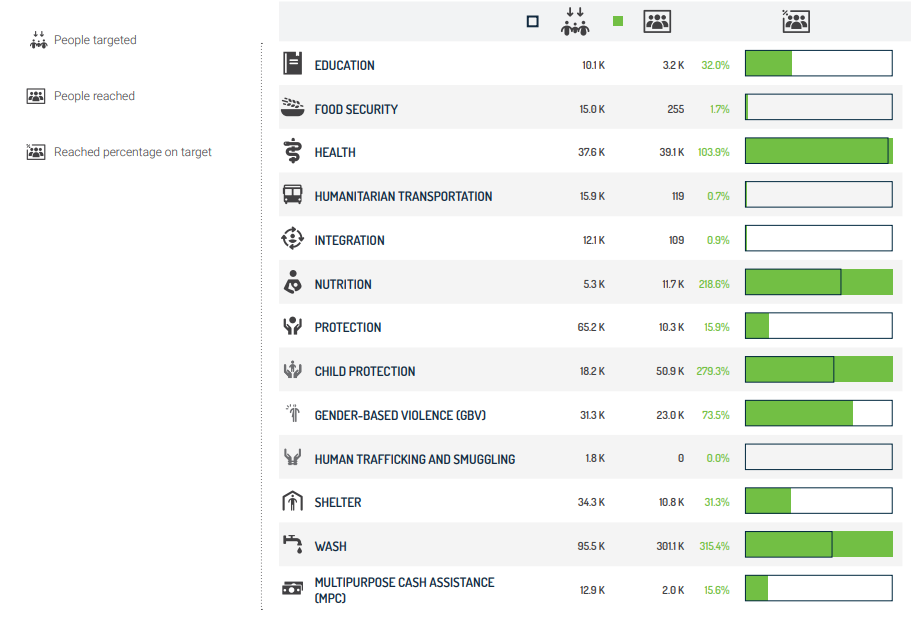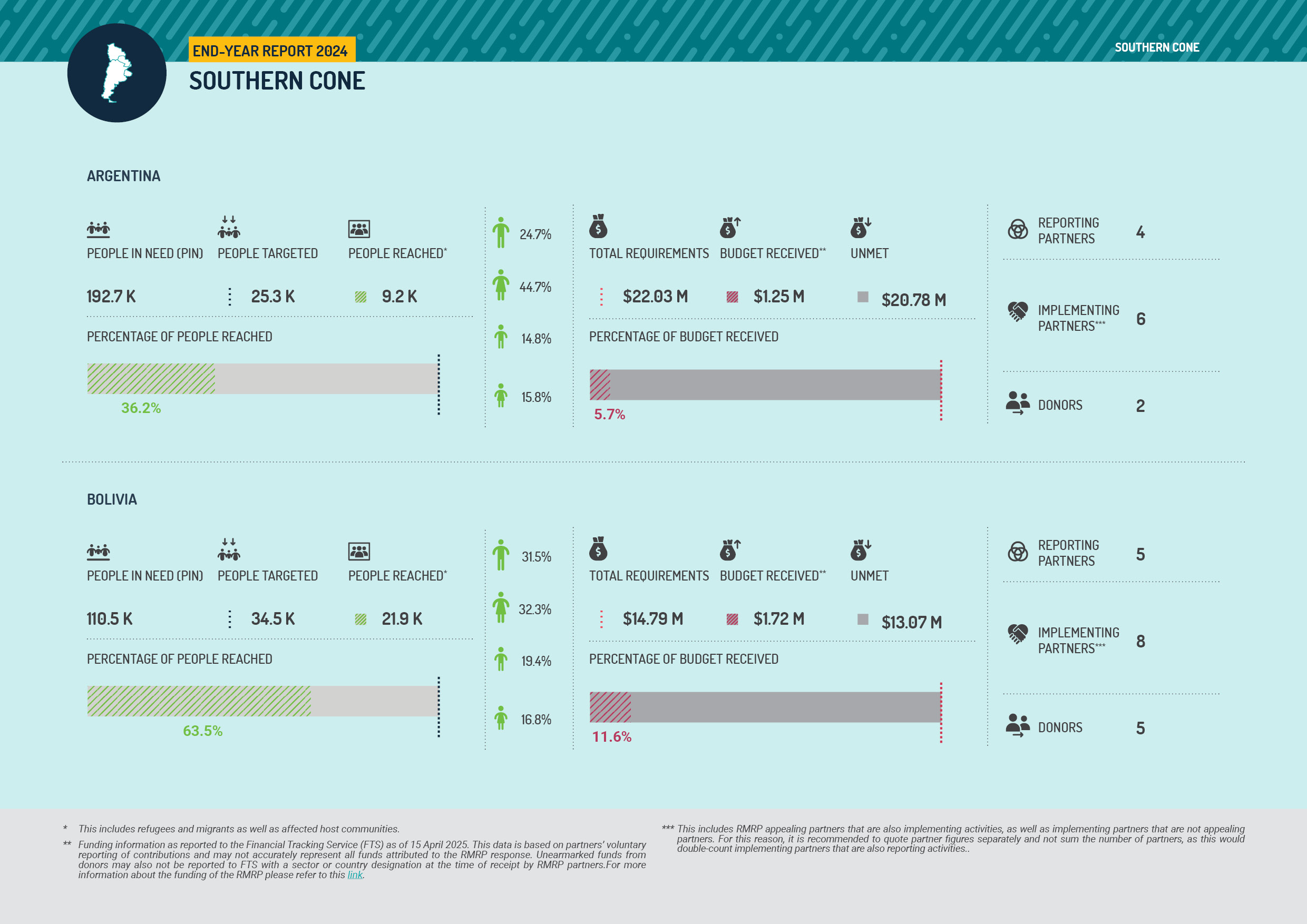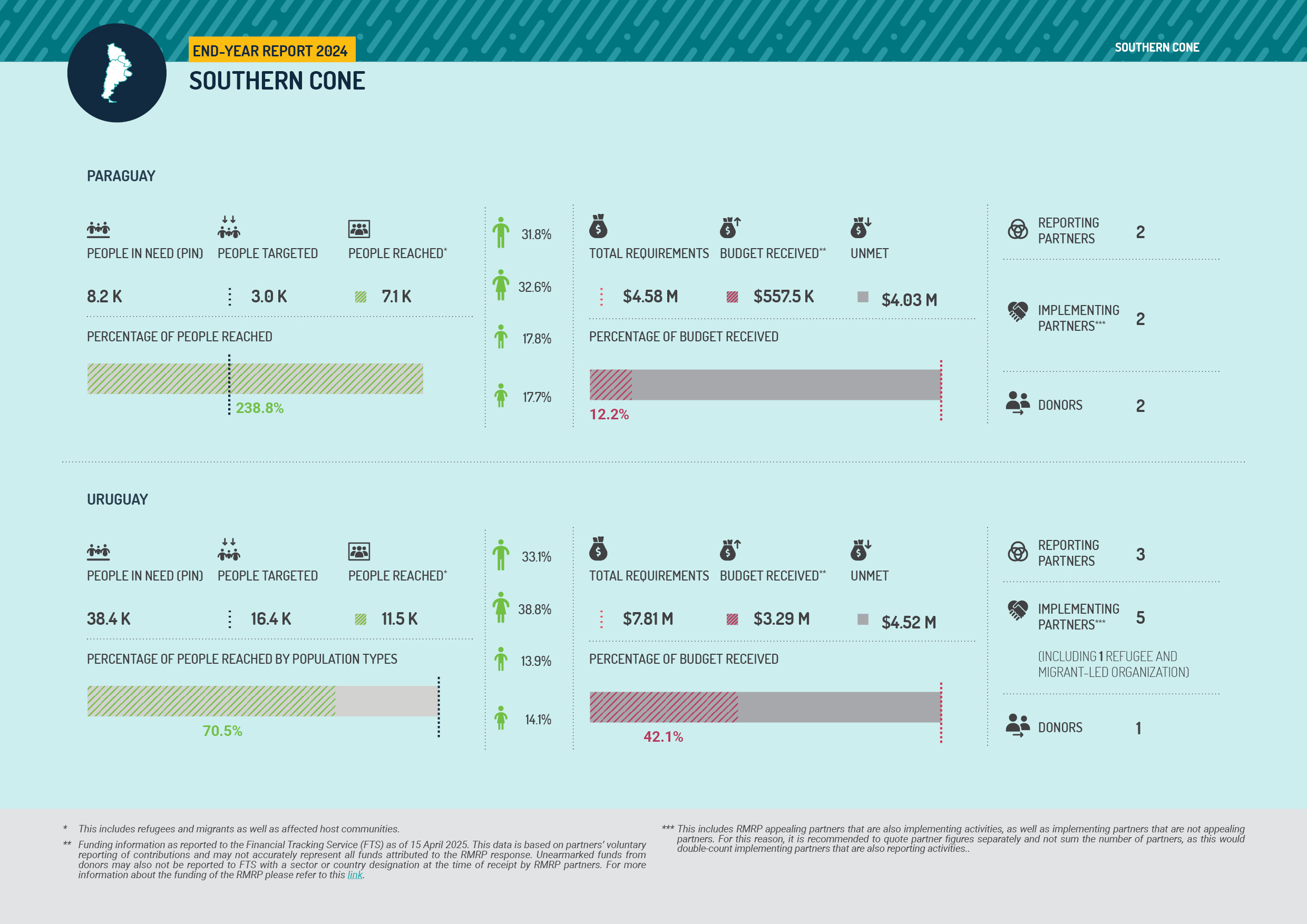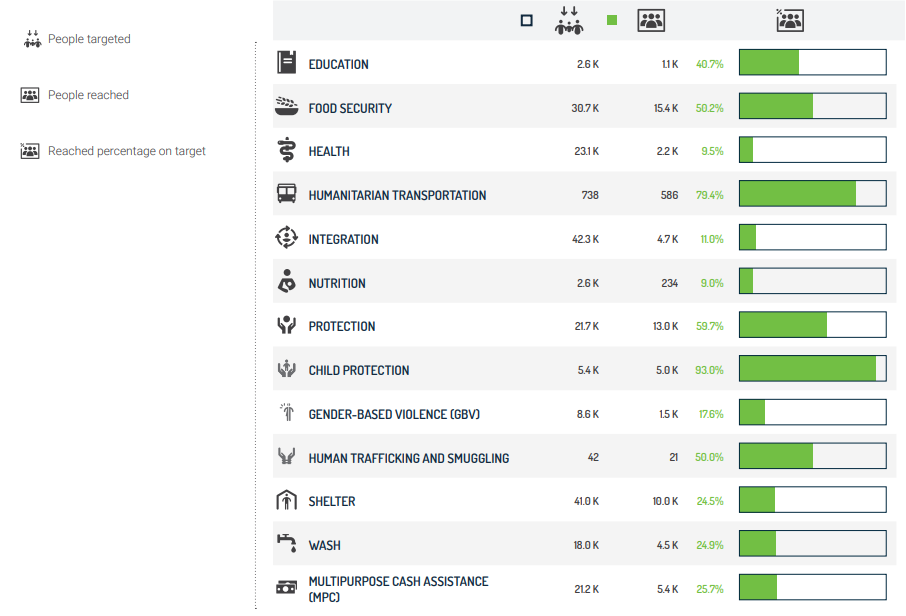RMRP 2024 END-YEAR REPORT
results of THE implementation of the rmrp 2024
PEOPLE REACHED
In 2024, R4V partners reached 1.49 million refugees, migrants, and members of affected host communities across 17 countries in Latin America and the Caribbean (LAC), delivering a wide range of multisectoral assistance. The Regional Refugee and Migrant Response Plan (RMRP) 2024 was implemented by 341 organizations, including UN agencies, national and international NGOs, civil society organizations, academic institutions, government entities, private sector actors, and faith-based organizations. Among them, 47 were led by migrants and refugees. Notably, the share of refugee- and migrant-led organizations participating in the response as appealing partners increased to 64 in the RMRP 2025-2026, up from 46 in the RMRP 2023-2024, reflecting growing localization and leadership by affected communities.

“Thanks to the support of R4V partners, we have been able to rent a place where we can live with dignity. We have also received psychosocial support, which has been essential for understanding the culture of this new country and opening my mind. This support has helped me get to know myself better, feel free, and move forward.”
Jorge (Argentina)

“We have faced difficult times in the Dominican Republic. At one point, my wife and I lost our jobs. Without an income, we fell behind on rent, and our electricity was cut off. But we never lacked God’s provision when it came to food. Organizations provided us with food supplies, and our neighbors also offered their support. That was an immense relief for us.”
Saúl (Dominican Republic)

“Coordinating our schedules in Chile was challenging. The children finished school at 3:00 PM, and we got off work until 6:00. We started our business to have more control over our time. I sell pastries in the mornings and pizza in the evenings, from home. This was possible thanks to the training we’ve received and the oven provided by an organization that supports entrepreneurship.”
Eyasmir González (Chile)

“We seek out people moving to other cities who prefer not to take all their belongings with them. We purchase these items, refurbish them, and resell them. That’s why the support we received to cover our rent from one of R4V’s partner organizations has been so helpful. The money we saved on rent allowed us to reinvest in our business.”
Sergio (Colombia)

“Finding a job in Costa Rica was difficult. This challenge led me to connect with organizations that provided me with training opportunities. I took courses in entrepreneurship and English, which inspired me to support other migrants and refugees like myself—people who deserve empathy.”
Jorge (Costa Rica)

“Running a business requires knowledge in areas such as accounting, marketing, and more. The organizations within R4V have been instrumental in supporting us, offering training, guidance, and continuous assistance, as well as kindness and encouragement. I love the staff of these organizations—they have become like family to me.”
Anyoselin (Ecuador)

“The journey to Peru was difficult, the cold and the nights were challenging. Finding food was also a constant struggle—some days, we could only provide for the children. Fortunately, we encountered organizations that offered us assistance and food, which was invaluable, especially as we faced discrimination along the way.”
Jolfren (Peru)
MONITORING OF THE RMRP 2024
STORIES OF MIGRANTS AND REFUGEES
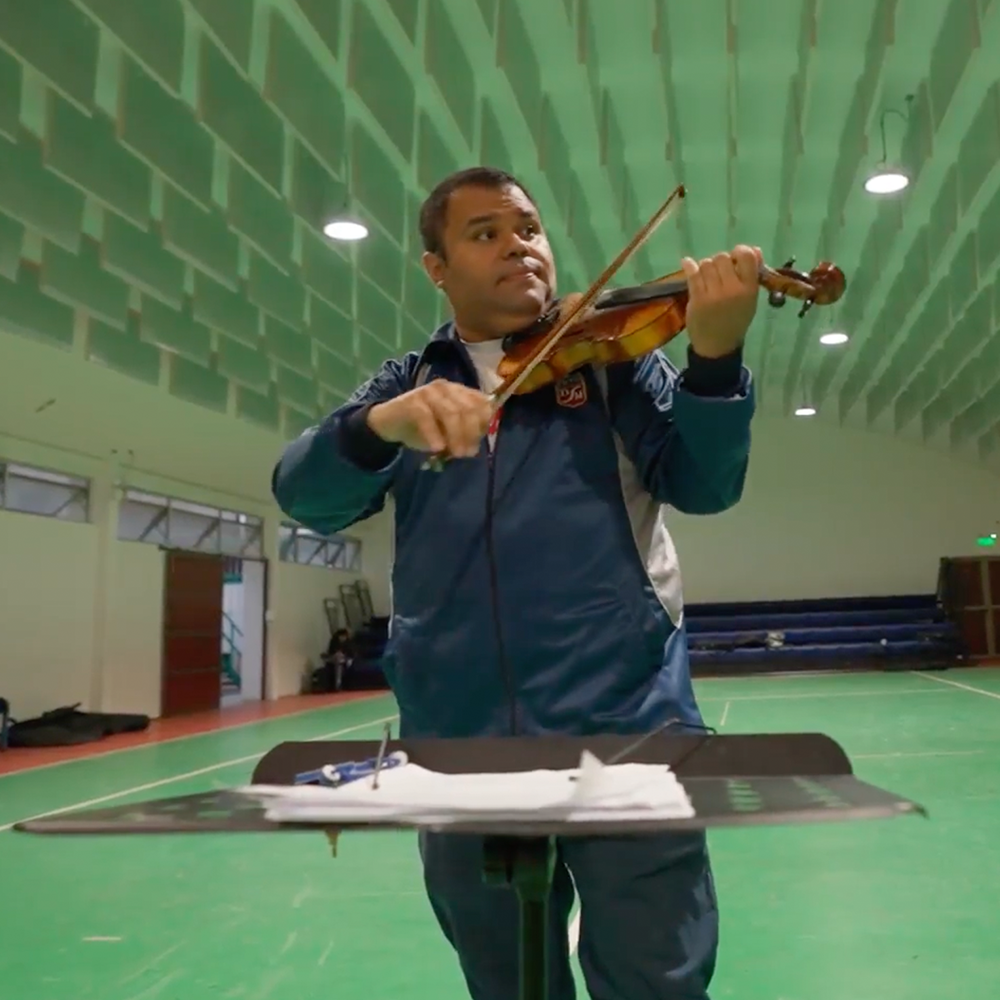
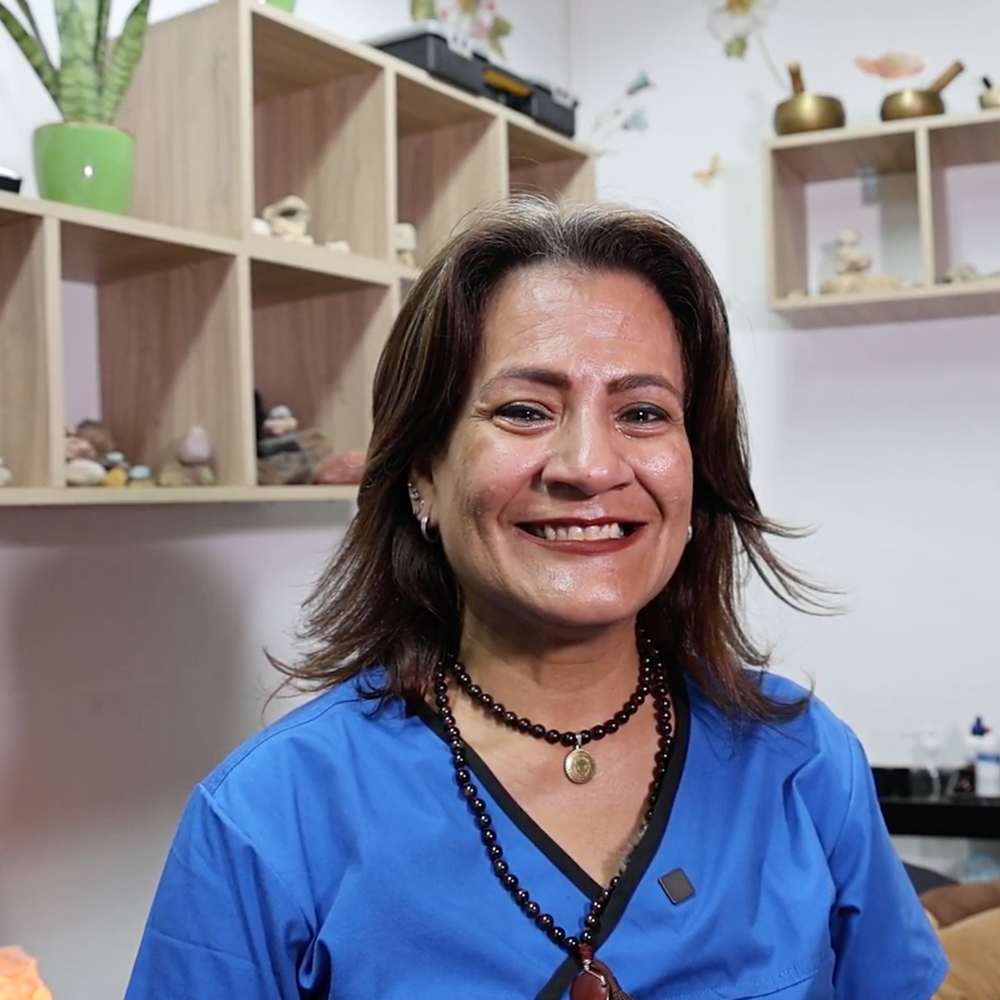
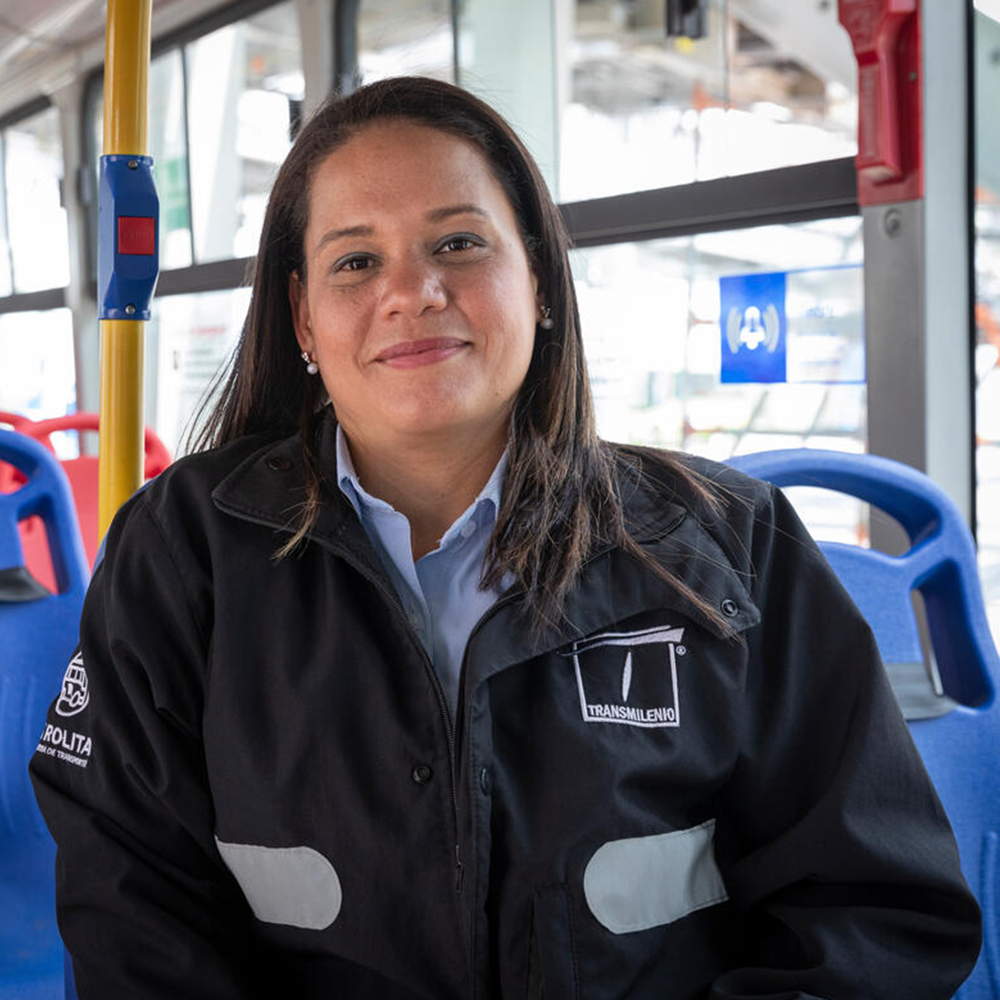
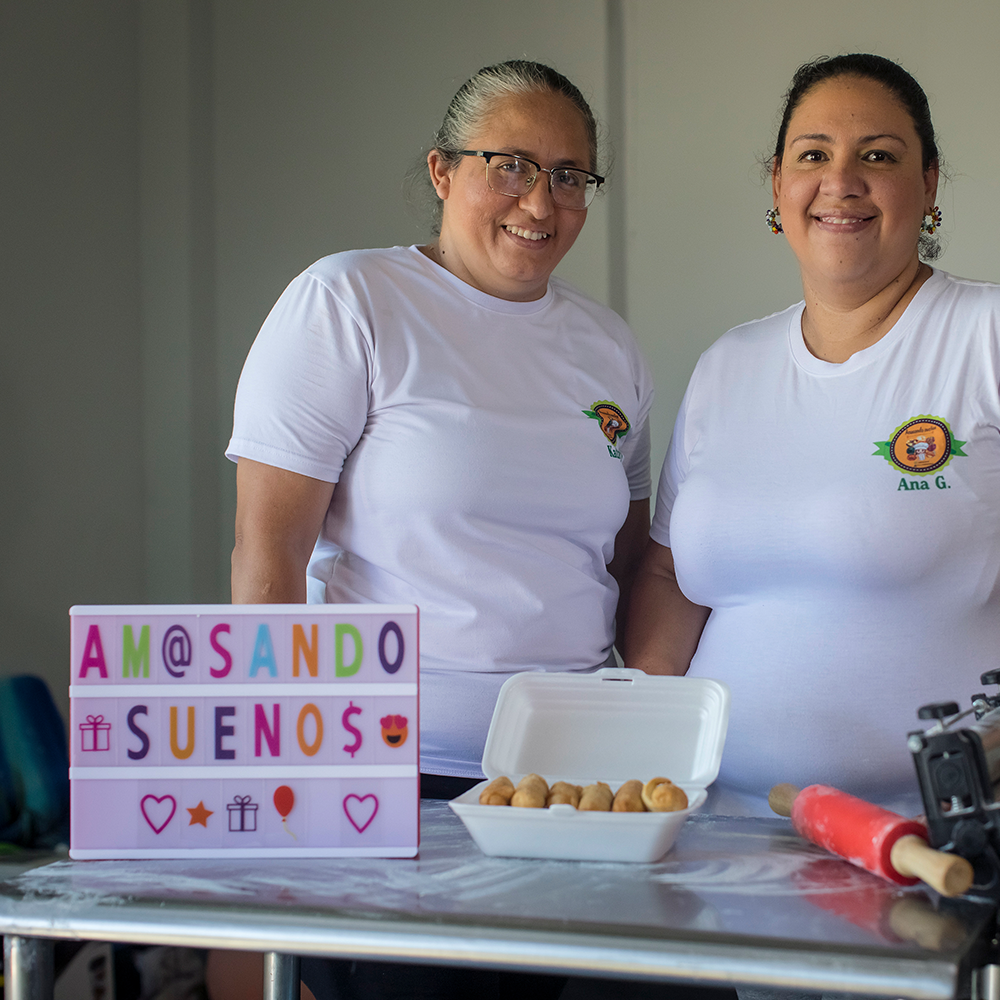
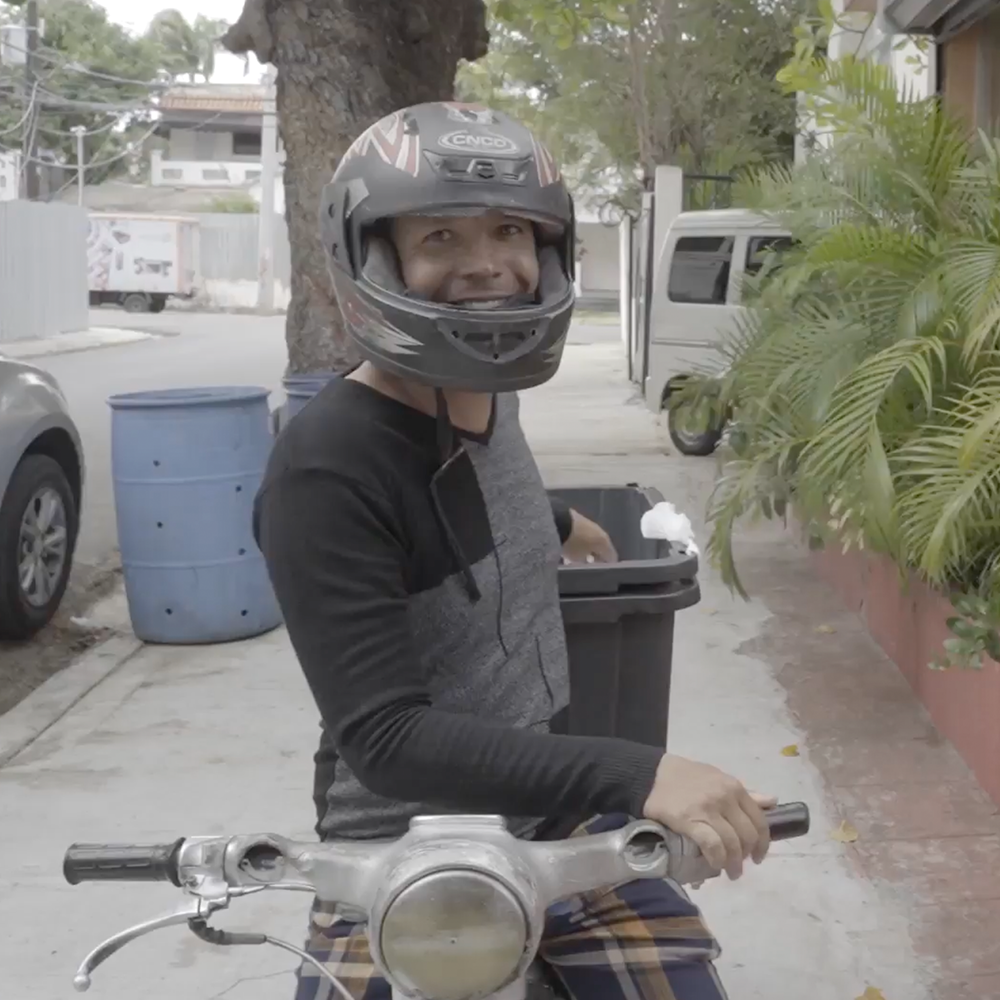
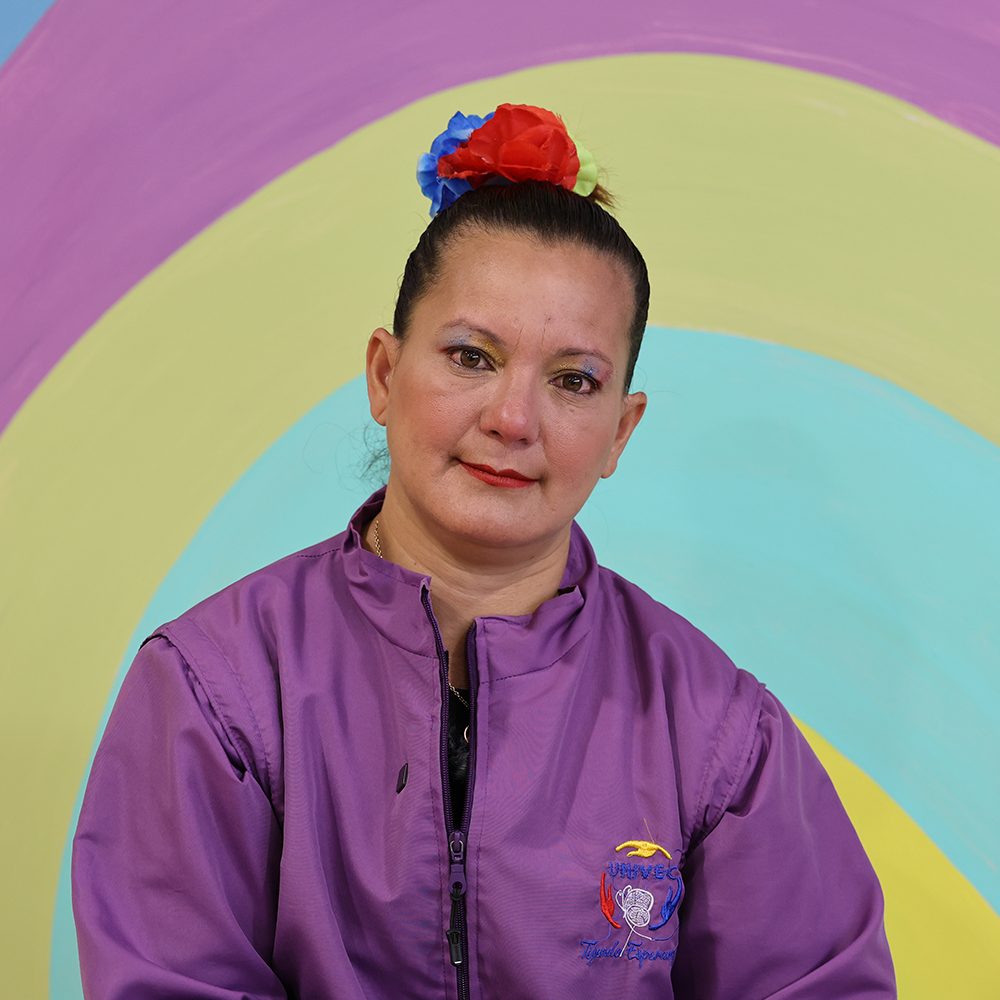
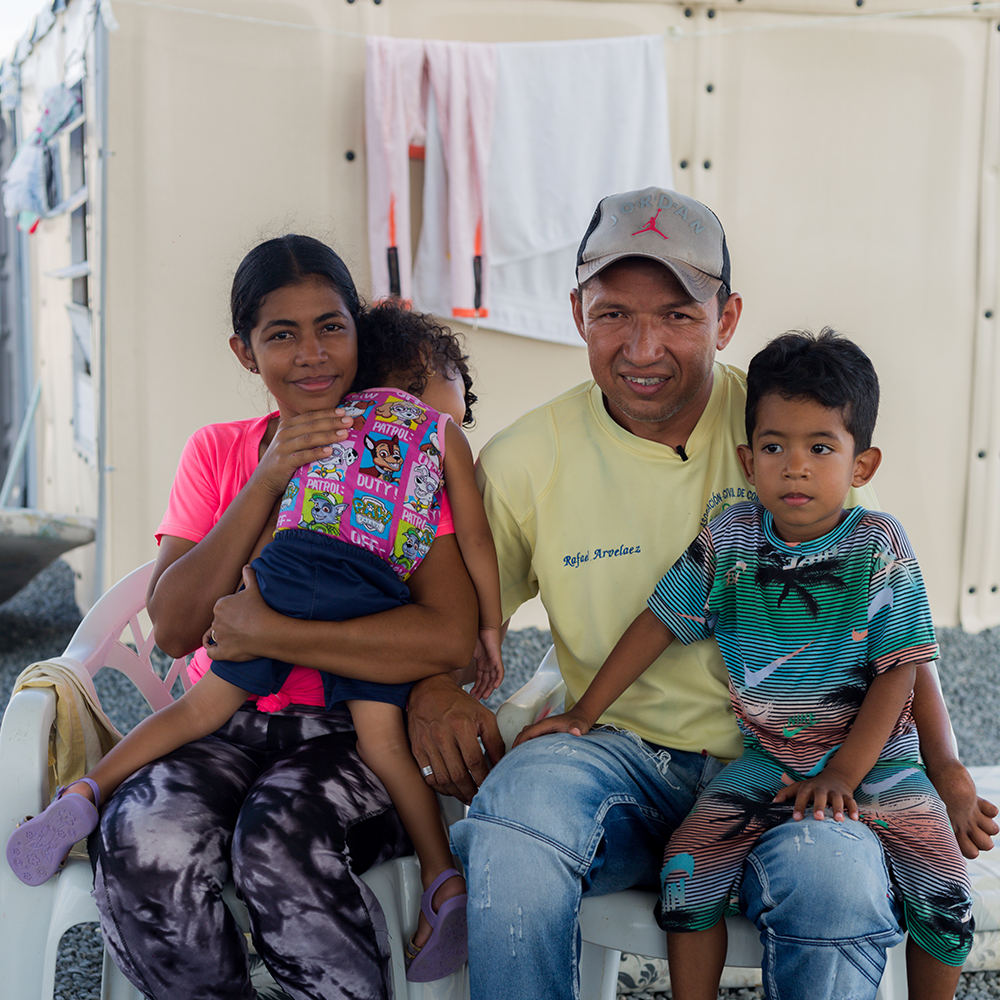
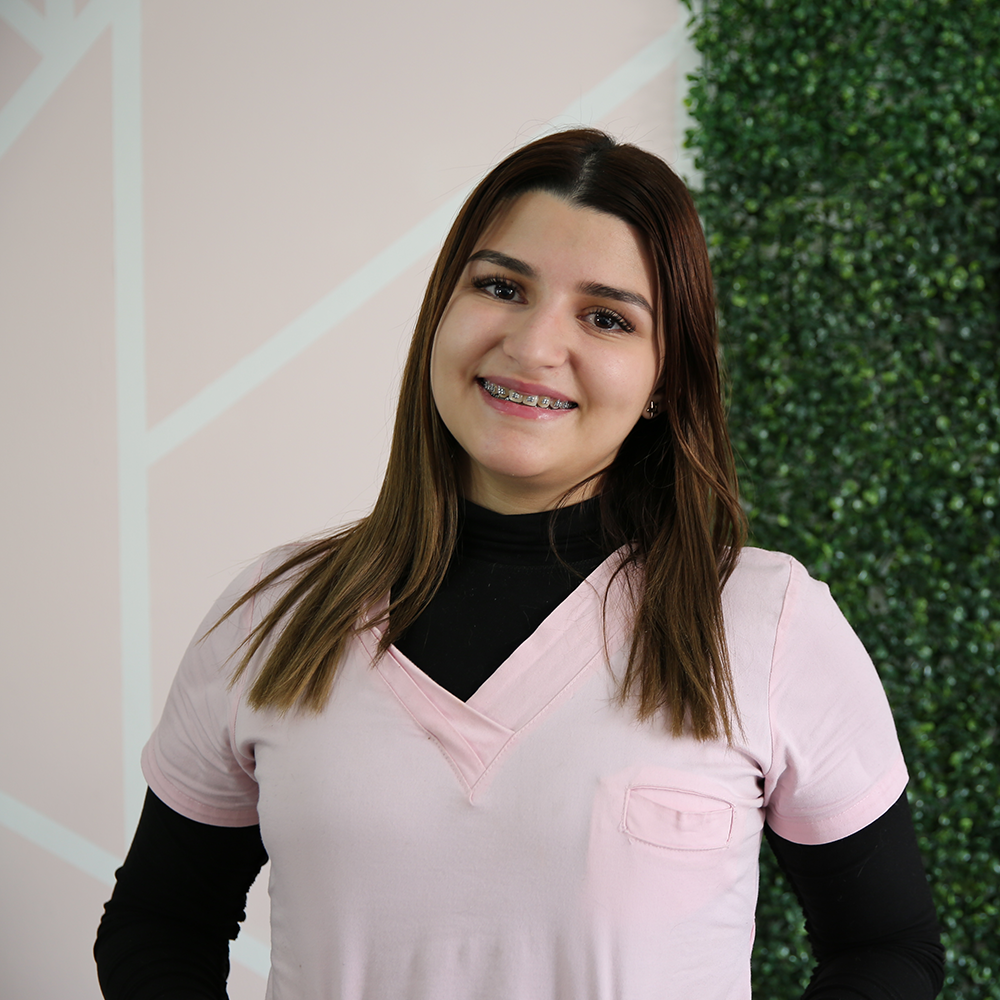
FUNDING OF THE RMRP 2024
Working Groups and Cross-Cutting Themes
Information on R4V, the RMRP and partner organizations
What is R4V?
In April 2018 the UN Secretary-General directed IOM and UNHCR to coordinate the regional response to the situation of refugees and migrants from Venezuela. As a result, the Inter-Agency Coordination Platform for Refugees and Migrants from Venezuela (R4V) was established as a forum to coordinate the response efforts across 17 countries of Latin America and the Caribbean.
What is the RMRP?
The Regional Refugee and Migrant Response Plan (RMRP) has since 2018 served as a strategic regional response plan and advocacy tool to support country and sub-regional operations and to ensure the most pressing humanitarian, protection and integration needs of migrants and refugees in the 17 countries covered by R4V, as well as those of host communities, were met.
The RMRP 2024, an evidence-based response plan, presented operational response priorities, activities, and financial requirements addressing the gaps faced by refugees and migrants in meeting their basic needs. These gaps were identified in the Refugee and Migrant Needs Analysis (RMNA) 2023, which used primary data collection and secondary data analysis across the region.
The following response plan, the RMRP 2025-2026, was launched in December 2024. In 2025, the response plans targets 1.79 million people, including migrants, refugees and affected host communities. A total of 229 partner organizations across R4V countries in Latin America and the Caribbean are included in the appeal.
RMRP 2024 partner organizations
United Nations High Commissioner for Refugees (UNHCR) Adventist Development and Relief Agency (ADRA) Argentine Commission for Refugees and Migrants (CAREF) Comisión Episcopal de la Pastoral de Migrantes e Itinerantes Panamerican Health Organization/World Health Organization (PAHO/WHO) Red de Investigaciones en Derechos Humanos – CONICET (Consejo Nacional de Investigaciones Científicas y Técnicas) HELVETAS Swiss Intercooperation International Organization for Migration (IOM) Munasim Kullakita Foundation United Nations Population Fund (UNFPA) United Nations Children’s Fund (UNICEF) Manos Veneguayas Association Asociación Civil El Paso Jesuit Migrant Service (JMS) UruVene International Labour Organization (ILO) CPUED Idas y Vueltas Association Caritas Bolivia Red Cross Bolivia United Nations Entity for Gender Equality and the Empowerment of Women (UNWOMEN) Mirares Save the Children International (SCI) World Food Programme (WFP) Red Cross Argentina Fundación Scalabrini Bolivia Fundación Quimera HIAS Plataforma de Personas que Ejercen Trabajo Sexual Young Potential Development Ecuador SA (LAB XXI) SOS Children’s Villages Solidarity and Action Asociation Asociación Venezuela en Ecuador AC ActionAid CARE ChildFund International Permanent Human Rights defense Committee (CDH) Kimirina Coorporation Danielle’s Children Fund (DCF) Alas de Colibrí Foundation Foundation of the Americas (FUDELA) Educational Foundation Rada Lunita Lunera Foundation Panamerican Development Foundation Takuna Foundation Tarabita Foundation Terranueva Foundation Institute of Natural and Cultural Heritage (IPANC) Norwegian Refugee Council (NRC) United Nations Office of the High Commissioner for Human Rights (OHCHR) United Nations Development Programme (UNDP) Diálogo Diverso German Development Cooperation Agency GIZ Asociación Civil Lluvia Arcoiris Asociación de Venezolanos en Eloy Alfaro Asociación de Ciudadanos Migrantes Por Venezuela World Bank Development and Self-Management Center International Committee for the Development of People (CISP) COOPI – International Cooperation Foundation Corporación de Desarrollo de Ambato y Tungurahua Red Cross Ecuador Cuso International Caritas Ecuador Fundación Doña Milagros Ending Violence Against Migrants Fondo Ecuatoriano Populorum Progressio Fundación Hermandad Integrada por la Solidaridad del Inmigrante Foundation for the Integration and Development of Latin America (FIDAL) Organized Front of Venezuelans for Service and Assistance Association Fundación Arupo AVSI Foundation CRISFE Foundation Fundación Esquel Fundación Haciendo Panas Fundación MUEVE Fundación Mujer & Mujer Humanity & Inclusion iMMAP Inc. IMPACT Initiatives (REACH) International Rescue Committee (IRC) Las Reinas Pepiadas
Mision Scalabriniana – Ecuador United Nations Programme for Human Settlements (UN Habitat) Plan International RET International Jesuit Refugee Service (JRS) United Nations Educational, Scientific and Cultural Organization (UNESCO) United Nations Office on Drugs and Crime (UNODC) World Vision World Council of Credit Unions Fundación Manos Venezolanas Fundación Honrar la Vida Asociación de Venezolanos y Refugiados en el Estado de Amazonas Associação Venezuelana em Campo Grande Casa Venezuela Irmandade sem Fronteiras Rede Internacional de Ação Comunitária – Interação Associação Venezuela Global Banho de Cidadania – Recife Caritas Rio de Janeiro Serviço Pastoral dos Migrantes do Nordeste Pastoral Service for Migrants National Caritas São Paulo Institute for Migration and Human Rights (IMDH) Jesuit Service for Migrants and Refugees (JSMR) ASBRAD – Associação Brasileira de Defesa da Mulher da Infância e da Juventude Caritas Brazil Caritas Manaus Associação Hermanitos Compassiva Mana Institute Museu A CASA Refúgio 343 IEB – Instituto Internacional de Educação do Brasil Caritas Parana Migrant Service Center (CAM) Fraternity Without Borders Center for Integrated Studies and Programs for Sustainable Development (CIEDS) Fraternity – International Humanitarian Federation Salvation Army Vale da Benção Educational and Charitable Association (AEBVB) Missão Paz Caritas Switzerland Movimiento de Integración y Liberación Homosexual International Federation of the Red Cross (IFRC) Caritas Chile Amigos Migrantes Sin Fronteras ONG Migrantes por el Maule Inmigrante Feliz Association Compromiso Migrante INCAMI – Instituto Católico Chileno de Migración Danish Refugee Council (DRC) Fundación Humano y Libre Asociación de Venezolanos en México ASOCIACION DE EMPRESARIOS VENEZOLANOS EN MÉXICO Asociación de Mujeres Venezolanas en México City of Knowledge Fundación Activados Panamá Fundación Espacio Creativo Joint United Nations Programme on HIV/AIDS (UNAIDS) Panamerican and Caribbean Union for Human Rights Coalición por Venezuela Action against Hunger OXFAM Acción y Desarrollo Sección Peruana de Amnistía Internacional Angeles del Camino Asociacion Proteccion Poblacion Vulnerable Apurimac ETS ASOCIACIÓN DE VENEZOLANOS EN TRUJILLO Centro de Atencion Psicosocial (CAPS) Asociación Caritas Madre de Dios Caritas Peru Ronald McDonald House CCEFIRO Association Centro de Desarrollo Humano CEDRO CESAL CHS Alternativo Consejo Interreligioso del Perú – Religiones por la Paz Red Cross Peru Encuentros SJS (Servicio Jesuita de la Solidaridad)
Asociación Fundación contra el Hambre Perú Foro Salud Callao Hanns-Seidel-Stiftung Instituto de Democracia y Derechos Humanos – Pontificia Universidad Católica del Perú Instituto de Promoción del Desarrollo Solidario Lutheran World Relief MAG-The Bay Movimiento Migrante OCASIVEN Pasos Firmes Programa de Soporte a la autoayuda de personas seropositivas Asociación Quinta Ola Asociación Misioneros de San Carlos Scalabrinianos Si, Da Vida Partners in Health German Sparkassenstiftung Latin America and the Caribbean (DSIK) TECHO Terre des Hommes Suisse Cayetano Heredia University Unión Venezolana en Perú VeneActiva Venezuelan’s International Care Assistance ASOCIACIÓN VENEINTEGRA We World GVC Blumont Centro de Servicios para al capacitación Laboral y el Desarrollo Japan Agency for Development and Emergency Más Igualdad Perú PRISMA Fundación Pro-Integración Inclusión y Participación VeneAruba Solidaria Caritas Willemstad Human Rights Defence Curaçao Salú pa Tur Foundation Venex Curaçao Foundation Asociación Aves Colonia Foundation of Venezuelans in the Dominican Republic (FUNCOVERD) Dominican Institute for Integrated Development Heartland Alliance International (HAI) Fundación Venezolanos en San Cristóbal Globalizate Radio Venezuelan Emigrant Foundation (FEV) Rape Crisis Society of Trinidad and Tobago Living Water Community Caribbean Centre for Human Rights Catholic Commission for Social Justice/Archdiocese’s Ministry For Migrant And Refugees La Casita Hispanic Cultural Centre The Heroes Foundation Chosen Hands (Arts and Wellness Program) ACTED Alianza por la Solidaridad Caritas Germany Red Cross Colombia Diakonie Katastrophenhilfe Lutheran World Federation Halü Bienestar Humano Foundation (HALU) Fundación Operación Libertad Internacional Fundación Venezuela & Colombia Samaritan’s Purse Solidarités International ZOA ASOCIACIÓN ALAS DE LIBERTAD MANOS DE AMOR, BENDICIONES Y GRATITUD Asociación Mujeres Positivas Activas Asociación Deredez por las victimas de frontera connacionales IsraAID Corporación Dios nos Brinda una Segunda Oportunidad Fundación Aires de Esperanza Fundación RadaBer Profamilia Association Corporación Alianza Humanitaria Tricolor De Pana Que Sí Fundación Cultural Simón Bolívar Fundación Sin Frontera Manizales GOAL LLANOVENCOL Malteser International Mercy Corps United Nations Food and Agricultural Organization (FAO) FUNDACION REDHUMANIST Fundación Alianzas Solidarias Fundación Brisas del Norte Fundación Tierra de Paz Welcome Venezuela Americares Foundation MedGlobal
Regional Overview
In 2024, R4V partners reached 1.49 million refugees, migrants, and members of affected host communities across 17 countries in Latin America and the Caribbean (LAC), delivering a wide range of multisectoral assistance. The Regional Refugee and Migrant Response Plan (RMRP) 2024 was implemented by 341 organizations, including UN agencies, national and international NGOs, civil society organizations, academic institutions, government entities, private sector actors, and faith-based organizations. Among them, 47 were led by migrants and refugees. Notably, the share of refugee- and migrant-led organizations participating in the response as appealing partners increased to 64 in the RMRP 2025-2026, up from 46 in the RMRP 2023-2024, reflecting growing localization and leadership by affected communities.
The Refugee and Migrant Needs Analysis (RMNA 2024) identified 4.18 million Venezuelans living in the 17 RMRP countries who continue to face major obstacles in accessing integration, protection, basic services, and dignified living conditions. With 7.9 million Venezuelans having left their country—6.7 million of them residing in the LAC region—governments, host communities, and affected populations are still grappling with considerable humanitarian and integration challenges. In response, R4V partners prioritized both life-saving assistance and inclusive integration efforts, aiming to address urgent needs while laying the groundwork for longer-term solutions. The R4V Platform has also evolved in tandem, adapting strategically and operationally to meet the shifting context.
In the year of 2024, the presidential election in Venezuela led to a renewed wave of uncertainty and heightened tension across the region. Diplomatic relations between Venezuela and several Latin American countries were suspended, and direct flights were halted, further limiting the ability of Venezuelans to access consular services or travel regularly. These developments exacerbated the challenges already faced by refugees and migrants in the region, particularly those seeking documentation, family reunification, or access to protection mechanisms. The interruption of consular services hindered ongoing regularization processes, while the evolving political and security context in Venezuela heightened anxiety and emotional distress among communities abroad. These challenges were further compounded by increasingly stringent migratory measures in the region, which limited regular pathways and led many migrants and refugees to continue seeking access to other countries in search of safety, documentation, and opportunities for integration. Anticipating potential movements and shifts in humanitarian needs, R4V partners worked closely with national authorities to adapt contingency planning and maintain readiness at key border and urban reception points.
Within this complex environment, R4V sectors implemented coordinated responses to address both immediate and structural needs. In the Education Sector, partners worked to uphold the right of refugee and migrant children to access education by facilitating school enrolment and addressing key barriers through the provision of school materials, uniforms and transportation. Despite these efforts, only around 20% of the sector’s target was reached, reflecting underfunding constraints and continued challenges in addressing structural barriers to educational access, including limited school capacity, financial constraints, and language barriers.
In the Food Security Sector, over 690,000 people received direct food assistance, including food kits, hot meals, and food vouchers. In response to rising food prices and household-level vulnerabilities, partners also strengthened community kitchens and supported local infrastructure to improve the resilience of food assistance modalities.
Access to healthcare remained a central pillar of the response. More than 450,000 migrants, refugees, and affected host community members benefited from health services. Partners also supported the resilience of public health systems by contributing medical supplies, promoting vaccination campaigns, and enhancing referral pathways. To ensure access to critical services, including healthcare, legal assistance, and education, the Humanitarian Transportation Sector supported more than 57,000 individuals with local travel, helping to overcome mobility and cost-related barriers.
The Integration Sector reached nearly 192,000 people, with activities focused on strengthening access to the labour market and promoting social cohesion. Efforts included vocational and language training, support for entrepreneurship and skills recognition, and the organization of cultural and community-building initiatives. In a context of financial instability and discrimination continuing to hinder socioeconomic inclusion, these initiatives played a key role in supporting the longer-term integration of refugees and migrants in host communities.
The Protection Sector delivered specialized assistance to nearly 700,000 individuals, addressing risks linked to irregular status, gaps in documentation, and exposure to exploitation and violence. Efforts focused on improving access to legal information, support for regularization processes, and referrals to asylum procedures where applicable. In addition to these cross-cutting interventions, the sector’s three sub-sectors played a critical role in addressing vulnerabilities among specific at-risk groups. Child Protection partners supported more than 87,000 children and caregivers through psychosocial support, case management, and referrals to specialized child protection services, while also working to strengthen national child protection systems. R4V partners in the Gender-Based Violence sub-sector reached over 100,000 people with support through safe spaces, legal and psychosocial assistance, and awareness-raising on prevention and response. Partners also provided capacity-building to national actors and contributed to the development of protocols and survivor-centred approaches. In the Human Trafficking and Smuggling sub-sector, 10,500 individuals were assisted with identification, referral, and access to support services, while efforts to enhance institutional capacity and cross-border coordination were reinforced to more efficiently respond to protection risks along key routes and within urban contexts.
Nutrition Sector partners reached over 51,000 pregnant and lactating women and children under five, providing life-saving interventions such as micronutrient supplementation and nutritional counselling. These actions helped prevent and treat malnutrition and mitigate its long-term impacts on physical development and survival.
Shelter remained a critical sector in the 2024 response, particularly given the high cost of housing and the precarious living conditions faced by many migrants and refugees in host countries. More than 128,000 individuals were supported with both short- and longer-term accommodation solutions, including rental assistance, transitional shelters, and access to collective housing arrangements. In addition to direct assistance, partners worked to improve shelter conditions in informal settlements and emergency shelters and advocated for inclusive housing policies to expand access to safe and adequate housing. The sector also focused on the adaptation of shelter tools and strategies to meet evolving needs, including through coordination with national housing institutions and social services.
In the WASH Sector, over 152,000 people were reached with water, sanitation, and hygiene interventions, aiming to reduce public health risks and improve living conditions, particularly in collective shelters, border areas, and underserved urban neighbourhoods. Partners provided access to safe water, hygiene kits, and sanitation infrastructure improvements in schools, health centres, and temporary accommodations. Hygiene promotion activities also played a key role in supporting individual well-being and preventing disease outbreaks, particularly in densely populated settings or among newly arrived refugee and migrant populations.
Across all sectors, financial support remained an essential response modality, promoting flexibility and dignity in meeting individual and household needs. Around 179,000 individuals benefited from financial support, enabling them to address a range of basic needs in a context of constrained resources and multiple, overlapping vulnerabilities.
In 2024, the R4V Platform strengthened the integration of cross-cutting themes across all sectors of the response, aligning with host government priorities and reinforcing a people-centred and rights-based approach. The Protection from Sexual Exploitation and Abuse (PSEA) Community of Practice supported partners in institutionalizing robust prevention and response mechanisms, including through a consolidated network of focal points in each platform. These focal points played a key role in promoting collective PSEA measures and ensuring adherence to minimum standards. Meanwhile, the Accountability to Affected Populations (AAP) and Communication with Communities (CwC) Working Group expanded capacity-building efforts to support partners in fostering two-way communication and integrating feedback mechanisms that place communities at the centre of the response. Together with R4V sectors, key regional messages were co-developed and disseminated to counter misinformation and provide clear guidance on risks associated with irregular routes and the availability of regular pathways.
R4V also elevated the importance of environmental sustainability in the humanitarian response. As part of the planning process in 2024, a new Environmental Marker was introduced, which laid the groundwork for integrating nature-based solutions and climate resilience measures across the platform’s activities. These efforts aimed not only to mitigate the environmental footprint of operations themselves but also to leverage benefits for host communities and ecosystems—particularly in areas experiencing environmental degradation, such as border zones and urban settlements facing rapid population growth.
The year also saw continued efforts to strengthen evidence-based coordination. In addition to flagship initiatives such as the RMNA 2024 and the RMRP 2024 Update, the Platform generated a series of regular informational products—including Movement Reports, Situational Updates, and Special Reports on emerging crises and evolving situations. Data on people reached and financial contributions were made publicly accessible via the R4V Monitoring and Funding Dashboards, enhancing transparency and enabling partners, donors, and governments to monitor progress across sectors and countries. These tools, alongside broader communication efforts via social media and the R4V.info portal, were instrumental in sustaining awareness and engagement across the region.
To provide a comprehensive summary of the technical and practical aspects of inter-agency coordination in responding to mixed movements situation involving refugees and migrants, the R4V Handbook was also published in 2024. Furthermore, reaffirming its commitment to localization and the meaningful inclusion of migrant and refugee voices, R4V published a Report on the Engagement of Refugee- and Migrant-Led Organizations in the R4V Platform. The report presented key findings and recommendations from consultations with these organizations undertaken in 2024.
For the second consecutive year, the RMRP was implemented under a biennial framework, with an annual update to capture shifting needs and operational realities. For the RMRP 2024, despite significant efforts, the response was significantly underfunded. Only USD 447.3 million has been received, equivalent to 28.2% of the USD 1.59 billion required. Since the RMRP 2022, funds went from covering 50% of the required needs to less than 30%. This chronic underfunding jeopardized the ability of partners to maintain and scale critical services.
Despite a challenging operational and funding landscape, partners reached 1.49 million individuals with multisectoral support, contributing to the stabilization and inclusion of migrants and refugees in Latin America and the Caribbean. These achievements were made possible through the collective efforts of host governments, donors, implementing organizations, and, above all, the resilience and solidarity of the affected populations themselves. The R4V platform remains committed to advancing a response that protects rights, promotes dignity, and recognizes the positive contributions of refugees and migrants to the future of the region.
Patricia left Venezuela unaware that she would never return. As a microbiologist, her work took her to a Conference in Costa Rica, where she was forced to stay after her husband warned her that her safety back home was at risk.
Left alone for nine months while she worked to bring her family over, she had to start from scratch. She first found an empty house to live in, where she cried herself to sleep every night, but a network of Costa Rican friends helped her rebuild her life. “They came with beds, a fridge, a coffee maker, a blender, sheets, towels, clothes…” Patricia recalls. “I had no way to thank them enough.”
When her family arrived, their adaptation was far from easy. Her children faced discrimination at school. Her husband had to learn how to bake since his accounting degree still hasn’t been recognized. Patricia, with determination, perseverance, and the support of organizations, including R4V partners, that helped her structure her business and secure seed capital, has opened her own practice, offering everything from acupuncture to reiki to restore her patients’ health.
Today, after overcoming the immense emotional challenge of starting over, they feel grateful. In Costa Rica they’ve found warmth, stability, security, and freedom: “While we were waiting for our residency, we couldn’t travel. Now, I dream of traveling the world and sharing what I know.”
Miguel Henriquez arrived in Chile with the hope of giving his daughter, Sofía, a better life. Born with a disability, she had not been receiving the care she needed in Venezuela. Miguel made the journey first, but due to changes in visa regulations, he had to endure a seven-month wait before reuniting with his wife and daughter.
His background as a distinguished violin teacher and orchestra conductor and the support of family and friends were the key elements to help Miguel find work at a school. As he settled into this new chapter, he set his sights on an ambitious goal: creating a string orchestra. Today, that vision is not only a reality but a thriving space for social transformation, uniting 80 students from various nationalities and a team of both Chilean and foreign educators. Miguel has been able to follow his passion while inspiring his students and teaching them values such as discipline, teamwork, and respect.
His story is a testament to resilience and the power of art. Through music, he rebuilt his life in a new country, secured the care and education his daughter needed, and made a lasting impact on the community that embraced him. “As migrants, we have crossed a line that someone once drew to divide us. It is our responsibility to contribute so that those divisions disappear for good,” he reflects.
Adriana arrived in Colombia in 2019 with her husband and children in search for a better future, leaving behind her life in Venezuela as a primary school teacher. They crossed the border on foot and traveled through several cities before settling in Bogotá. “We sold food on the street, but many times, it wasn’t enough to cover the rent,” Adriana recalls. Despite the uncertainty and the distance from their loved ones, they never gave up.
Over time, Adriana found a life-changing opportunity through ‘Driving Together’, a program led by the Bogotá Mayor’s Office and an R4V partner organization. The initiative helps refugees and migrants secure formal employment as public transportation drivers.
Although she had never driven a vehicle before, Adriana embraced the challenge and trained to become a zonal bus operator. “I was full of doubt and fear,” she admits, “but I received support every step of the way. We had access to psychosocial assistance, financial aid, professional training, and funding to obtain our driver’s licenses.” Her husband also found work in the same transportation system.
Today, with access to healthcare, education, and labor benefits, the family secures stability and feels fully integrated into the community. With optimism and determination, they continue shaping their future in Colombia, grateful for the opportunities they have received and committed to contributing to the country that has welcomed them.
Although Ana Graciela studied law in Venezuela, at 43, and now living in Peru, she discovered a new path in life through baking and Venezuelan cuisine, alongside her partner, Kathy. Kneading Dreams is a business born from a craving: Ana Graciela wanted tequeños, and Kathy, with her culinary skills, made them to perfection. Inspired by that small success, they invested a small amount of capital, purchased additional ingredients, and launched their business.
Today, Kneading Dreams not only sustains them in Peru but also allows them to support their families in Venezuela. Their workdays begin at 4:00 a.m. and can extend until 11:00 p.m., but every sacrifice has been worthwhile. “Through our food, we’ve managed to touch the hearts and palates of our customers, both Peruvians and Venezuelans,” explains Ana Graciela.
They dream of continuing to grow and establish themselves in Peru, a country that has welcomed them with warmth and made them feel at home. The name of their business reflects their journey: like dough, dreams are shaped with patience and dedication.
Alberto arrived in the Dominican Republic seven years ago with only $100 in his pocket. He traveled with a couple of friends, but none of them knew anyone in the country. When the money ran out, he was left without a place to stay and spent entire days searching for work. Despite the uncertainty, he never gave up, and eventually secured a job in construction, where he had to endure poor working conditions.
As the challenges grew, his friends decided to return to Venezuela, but Alberto chose to stay and keep fighting for a better future. Although it was difficult to remain alone, he was fortunate to meet Rachel, a Dominican-Venezuelan woman whose solidarity ultimately saved his life. “I became seriously ill, suffering from kidney issues and contracting COVID. I almost died,” Alberto José recalls. “She was there for me, without asking for anything in return, as payment for food or rent. Everything she did came from her generous heart.”
Rachel became a motherly figure during this critical time, with her support Alberto José found the strength to recover and continue pushing forward. Today, he has rebuilt his life and works at Rachel’s restaurant, working toward his dream of being reunited with his children, whom he had to leave behind in Venezuela.
At 38 years old, Delismar made the difficult decision to leave Venezuela with her two-year-old daughter, hoping to reunite with her daughter’s father in Ecuador. The journey was five days of anguish and desperation; she set out with little money and few supplies, lacked the necessary exit permit for her baby, crossed violent and dangerous rivers, and encountered hostile individuals who showed no compassion.
Despite holding a degree in nursing, Delismar took on various jobs in Ecuador to support her family after her daughter’s father left for another country shortly after their arrival. Once she gained some stability, driven by her passion for helping others, she launched an initiative to empower the women in her community, many of whom were survivors of gender-based violence.
Her project, Union of Venezuelan, Ecuadorian, and Colombian Women Weaving Hope, provides women with support networks, entrepreneurship and parenting workshops, cultural gatherings, medical brigades, and clothing donations. She also created a children’s library for the community and a football and music school for local youth.
To bring her vision to life, Delismar has received support from humanitarian and development organizations, but above all, she has relied on her unwavering determination, becoming a pillar of strength for an entire community. Her story is a testament to the power of resilience and the role migrants can play as agents of change and hope. “Everyone thinks migration is something terrible, but it’s not,” says Delismar. “I came with a project and promised myself I would see it through. If I had to break barriers, I would.”
Emily and Rafael had to sell their car when they made the difficult decision to leave Venezuela, in search of a better life for their children. It was the only way they could afford the journey to Brazil. After an emotional farewell, their arduous journey began. “The trip was terrible,” recalls Rafael. “The children were crying, they were asking for water, we couldn’t even take them to the bathroom. On top of that, the bus was extremely small and had no air conditioning.”
They found hope in Brazil where they were welcomed with humanitarian support and given access to legal documents, shelter, and essential services. They also received medical care, which was especially critical for Rafael. He lost a leg in Venezuela and needed a new prosthesis—something that had been impossible to obtain back home.
Now, under the government’s Operation Welcome which is supported by R4V partners, they’re waiting for a job placement that will give them the stability they need. They are staying in a shelter while awaiting relocation to a city with job opportunities. Rafael, a former public administrator in Venezuela, is willing to take any job that allows him to provide for his family: “All I need is a decent job so I can give my children a good education.”
Every night, they wonder when they will see their loved ones again, but they are certain they made the right choice. Grateful to Brazil, they have begun learning Portuguese to contribute their skills and hard work to the country that welcomed them. “I don’t understand Portuguese yet, and it’s difficult,” Rafael admits, “but we have to adapt because we know how much we can achieve here.”
Oriana, 22, arrived in Argentina with her family at the age of 17. As a minor in Venezuela, she had never worked, so the search for her first job filled her with anxiety. “A woman asked me to distribute flyers at a shopping mall,” Oriana recalls. “When I returned empty-handed, in the middle of a heavy rainstorm, she was surprised and offered me a job at her beauty salon.”
Although she had to sacrifice her free time to study and work at the same time, that job enabled her to obtain the necessary documents to live in Argentina and learn much of what she now knows about aesthetics. She gained so much knowledge that, one day, she found the courage to become independent and start her own business. “Before I could financially launch my business, I worked hard,” Oriana explains. “I worked extra hours, covered shifts at other locations, and even worked on Sundays.”
She started by offering services at clients’ homes, but eventually, she was able to rent a space for her studio. Thanks to her dedication and the entrepreneurship courses she received from R4V partner organizations, she has successfully established her business. Now, with permanent residency and studies in cosmetology, Oriana continues to expand her business and set new goals. “I love what I do,” she says. “What I love most is seeing my clients happy.”
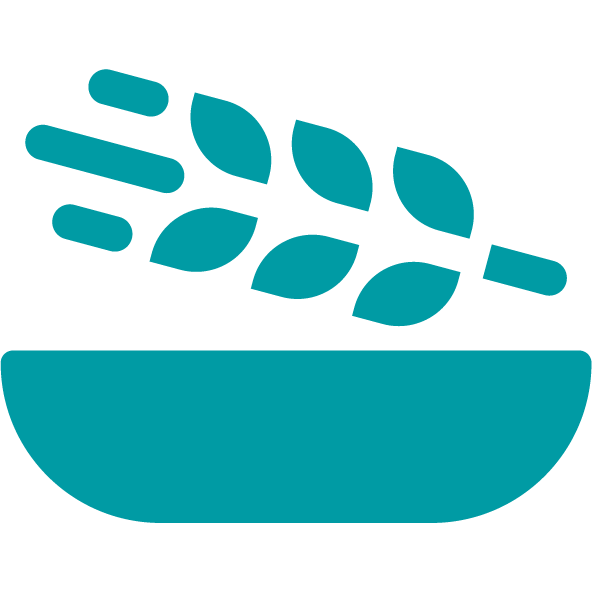
FOOD SECURITY
Situation
In 2024, refugees and migrants in Latin America and the Caribbean faced significant challenges in meeting their basic needs such as sufficient and nutritious food intake. These challenges mostly derived from economic difficulties related to lack of access to formal employment. Some 42% of the 2.79M Venezuelan migrants and refugees in the region and 78% of other nationalities trying to reach one of the 17 R4V countries experienced food insecurity. In Curaçao, over 85% of Venezuelan households faced severe or moderate food insecurity, followed by Peru and Colombia with over 50% of households in the same situation.
The most vulnerable populations included those in an irregular situation, recent arrivals, and people on the move. Among the most affected groups were pregnant and lactating women, children under five, older adults, indigenous populations, and individuals with chronic illnesses.
External factors, such as dependence on imported goods and climate-related events, also impacted food security. In Ecuador and Colombia, the El Niño Phenomenon severely affected key sectors like agriculture, livestock, and fisheries, increasing food prices and limiting access to food intake. Additionally, over two million Venezuelans remained in an irregular situation, with high rates of informal employment, often associated with lower wages and other protection risks.
Economic instability, climate-related events and other challenges forced many refugees and migrants to adopt negative coping mechanisms, including, among others, reducing food intake, prioritizing their children’s nutrition at their own expense, or resorting to begging for survival.
Response
In 2024, the Food Security Sector provided support, through 84 organizations, to 694.2K vulnerable people, including refugees, migrants, and affected members of host communities across 16 countries in Latin America and the Caribbean. A majority of the activities included direct food assistance, in-kind support (including distribution of food kits and hot meals), and or through cash and voucher assistance (CVA) such as food vouchers. Other activities undertaken by Food Security partners included capacity building and targeted improvement of essential infrastructure, such as donation of kitchen equipment in Chile and support to community kitchens in Peru.
Key best practices included developing and disseminating strategic information, establishing monitoring tools, and optimizing interventions. In Colombia, the coordination between the Nutrition and Food Security working groups enabled targeted assistance, which helped strengthen the response and advance the development of minimum standards for emergency care. In the Caribbean, food vouchers were distributed, while in Guyana, in-kind food assistance was delivered to remote communities.
Lessons Learned
For a more effective intersectoral and comprehensive approach for refugees and migrants, the Food Security Sector will enhance coordination with the Integration, Protection, and Health Sectors in 2025. It will also strengthen its coordination with host country governments to advance the inclusion of refugees and migrants in national social protection systems and ensure sustained access to food assistance.
Providing clear, multilingual information on available food assistance programmes and eligibility remains essential. These efforts will ensure a more tailored response that aims to more effectively meet the needs of refugees and migrants.
Finally, provide direct food assistance to refugees and migrants (in-destination, in-transit and stranded) with high level of food insecurity and facing protection risks. This includes distribution of basic food baskets, hot meals, and cash-based transfers.
Cover Photo by: WFP/Guianfranco Murillo

EDUCATION
Situation
In Colombia, Ecuador, and Peru, the three countries hosting the largest Venezuelan migrant and refugee population, the school enrolment process remains an obstacle for many families. In Trinidad and Tobago, access to formal education is even more restricted, leading to the implementation of non-formal educational services to ensure children’s learning. According to the RMNA 2024, in Ecuador, 36% of refugee and migrant children do not attend school due to the inability to pay school fees, while in Peru, 45% face economic barriers related to transportation costs. In 2024, migrant and refugee children and adolescents continued to face significant challenges in accessing to education services, limiting their full exercise of the right to education. Among some of the barriers identified are the lack of documentation, administrative requirements and inability to meet school costs. Also according to the RMNA 2024, at least 32% of Venezuelan children in host countries require educational services, with the figure reaching 42% among in-transit migrant and refugee children. Children in-transit, such as in Central America and Mexico, faced even more severe barriers to accessing education.
Response
During 2024, R4V focused its educational response on three key priorities, benefiting 107K migrants, refugees and host community members. These actions strengthened access, retention, and the quality of education for these populations.
The first key priority was to ensure access to – and retention – in education systems. Argentina, Colombia, Ecuador, Paraguay, Peru and Uruguay provided financial support, distribution of school kits, and academic reinforcement activities to facilitate the integration of refugee and migrant children and adolescents. In Brazil, Chile, Colombia, Ecuador, Mexico and other countries in the Caribbean and Central America, efforts focused on providing guidance on enrolment processes through campaigns and communication channels. In Curaçao, the Education and Protection sectors worked together through national Refugee and Migrant Working Groups. These groups facilitate cross-sectoral planning and implementation, ensuring that protection concerns—such as child safeguarding and regular status—are integrated into education programming.
To support and broaden educational access for children and adolescents engaged in prolonged periods in-transit, the Regional Learning Passport initiative was developed, featuring content adapted to their educational needs. The Educational Route (Ruta Educativa, for its Spanish title) project, implemented in Central American countries, has provided suitable spaces for children in-transit and their families, collected information on their educational needs, and recorded their competency levels through assessments to measure progress along the route.
The second key priority was to promote the recognition, validation, and accreditation of prior learning for children and adolescents. In countries within the Central American Integration System (SICA) and Mexico, the implementation of the PRVA (Regional Policy for Recognition, Validation, and Accreditation) was promoted to reduce access gaps and improve school retention in member countries. The policy improves refugee and migrant children’s access to and continuity in education by recognizing prior learning, even without documentation, and offering inclusive, flexible support. This enables smoother integration into national systems and reduces dropout risks, ensuring children can continue their education without unnecessary repetition or exclusion.
Finally, partners also prioritized strengthening intersectoral coordination. Integration with other sectors, such as protection, humanitarian transportation, and food security, facilitated access to documentation, school transportation, and food to improve school attendance and retention at the national level. Regionally, the GRE-LAC partners supported Ministries of Education in the humanitarian education coordination and response, with 20 active members, ensuring an educational response during emergencies, disasters, and mobility. It also collaborated with regional and global organizations and platforms like REDLAC and others.
Lessons Learned
Challenges persisted throughout 2024. Although several countries made progress in facilitating enrolment, regulatory frameworks remain an obstacle, and documentation requirements in some countries still limited access to and permanence in the education system. The collective strategy adopted by GRE-LAC partners to support countries has shown that effective coordination among NGOs, governments, and education stakeholders is essential for ensuring inclusive education during emergencies. This collaboration enabled a more unified response, maximizes resources, and ensures that no group is left behind
In 2025, the Education Sector will prioritize inclusive capacity-building efforts that actively integrate the voices and needs of the most vulnerable groups, including persons with disabilities and girls. Empowering local communities will be key to ensuring the sustainability and relevance of educational interventions. Additionally, advancing technology and digital tools will be critical for strengthening information management systems, enabling better tracking of learners’ educational journeys, and supporting data-driven decision-making for more effective and equitable responses.
Cover Photo by: UNICEF/KATARINE ALMEIDA
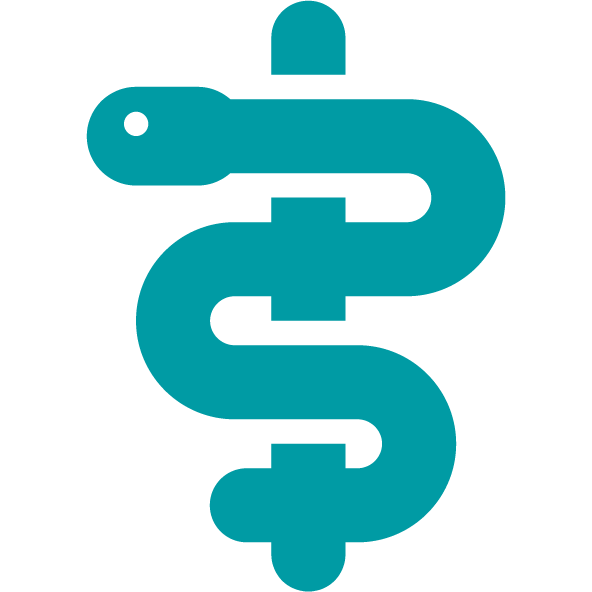
HEALTH
Situation
In 2024, migrants and refugees in the region faced multiple challenges in accessing health care. Rising violence, political instability, and the search for better opportunities fuelled new migratory flows, pushing many to take dangerous routes. These routes exposed people to extreme conditions and increasing health risks, including mental health issues, diseases and injuries. Sexual violence also remained a serious concern, with reported cases rising among those traversing the Darien jungle in the early months of the year.
The RMNA 2024 highlighted that 79% of refugees and migrants in Colombia, 32% in Ecuador and 39% in Panama needed health care while trying to reach another country. For example, access to maternal health care was severely limited for pregnant women.
Access to comprehensive health care also remained limited for migrants and refugees in-destination, due to barriers like limited financial resources, administrative obstacles, irregular status, and fear of discrimination. According to RMNA 2024, 58% of Venezuelan refugees and migrants needed some form health care. In several host countries, health systems faced significant challenges in ensuring timely clinical management, often due to constrained capacity, resource limitations, and competing demands on national services.
Response
In 2024, Health Sector partners coordinated efforts to support migrants, refugees, and host communities, reaching 454.9K people (28% of the target population). A total of 8.5K activities were implemented by 135 organizations, 85% in the form of direct assistance.
Partners prioritized access to health care, capacity building and health promotion, with emphasis on primary health care, SRH, and mental health and psychosocial support (MHPSS). Capacity building sessions targeted health personnel and community actors, covering topics such as mental health first aid, prevention and response to gender-based violence, and maternal care. Most activities focused on facilitating the inclusion of refugees and migrants into national health systems through social security affiliation or other enrolment mechanisms mainly in Colombia, Peru, and Ecuador. In Brazil, Chile, and Trinidad and Tobago, thematic campaigns addressed mental health, disease prevention, and access to health care.
R4V partners continued to improve access to health services. In Peru, partners worked with national authorities to promote temporary coverage under the Comprehensive Health Insurance (SIS, for its acronym in Spanish) for migrants and refugees with specific conditions, such as those living with HIV. In Panama, partners supported the formulation of a plan to strengthen health care for refugees and migrants by identifying challenges, opportunities and strategies, ensuring an inclusive and sustainable approach.
Lessons Learned
During 2024, progress was made in delivering health services for refugees, migrants and host communities. However, challenges in coverage and access persisted, especially the continuity of health services in remote areas and high-mobility contexts. Limited infrastructure and national policies further hindered a comprehensive health response. In 2025, efforts will focus on improving coordination, continuity of care for those on the move, and continue advocating for the integration of refugees and migrants into national health systems.
Cover Photo by: PAHO/ARTURO BARRETO
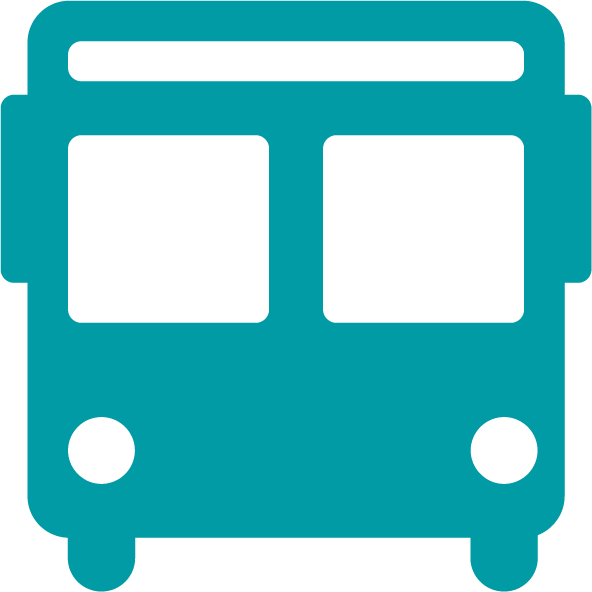
HUMANITARIAN TRANSPORTATION
Situation
In 2024, migrants and refugees faced significant challenges in accessing humanitarian transportation to life-saving and essential services, such as legal assistance, education, employment and healthcare. According to the RMNA 2024, protection risks posed threats to their security and health, exposing them to human trafficking, smuggling, and gender-based violence, particularly for women and girls. Rising transportation costs, especially in urban areas like Lima in Peru, limited access to services like work and education. The lack of valid documentation and regular status compounds these issues, leading to denial of transportation service and charged higher prices in places like Mexico and Curaçao. Additionally, limited resources and information related to safe routes, climatic conditions, potential dangers, schedules, and humanitarian services hindered safe and essential travel.
Response
In 2024, 18 R4V partners carried out in-country humanitarian transportation activities, compliant with national laws, across 11 countries. Over 70% of these activities were led by organizations led by refugees and migrants, highlighting the critical importance of these efforts for Venezuelan migrants and refugees. These in-country and short-distance key humanitarian transportation initiatives provided access to essential services such education for children, humanitarian assistance, shelter, protection services, family reunification, as well as support for regularization and integration programmes.
The response in 2024 underscored the collaboration among partner organizations, with over 95% of the total activities being implemented by local NGOs and faith-based local organizations. This also included providing technical support to local authorities. Furthermore, in order to mitigate the risks associated with irregular movements and the availability of humanitarian and protection services, the sector developed strategies to disseminate essential information. The regional sector also focused on short-distance humanitarian transportation and aims to publish a guidance note on this subject in 2025.
Lessons Learned
Stringent regulations in many R4V countries meant that access to regular transportation options within the countries remained contingent upon having a regular status, thereby increasing the vulnerability of refugees and migrants to criminal groups, including human trafficking and smuggling, robbery, exploitation, fraud, and violence.
Efforts in 2024 focused on disseminating information about the protection risks associated with irregular travel. This was done in coordination with other sectors, such as the Protection Sector and its sub-sectors. A continuous challenge was the need to strengthen advocacy efforts to improve access to in-country safe and regular transportation for migrants and refugees with host governments, donor organizations, media, and other stakeholders, emphasizing the critical role of humanitarian transportation in the region. Therefore, in 2025, the regional sector will focus on the importance of building the capacity of governments and other entities to support these efforts.
Cover Photo by: Milena Ayala/NRC
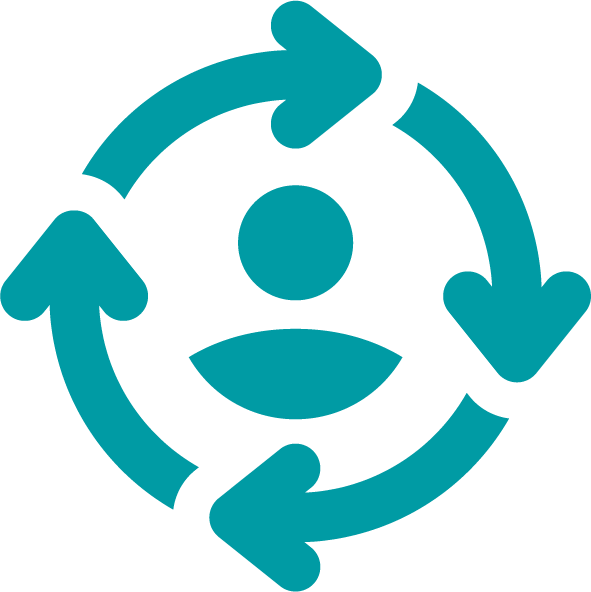
INTEGRATION
Situation
Throughout 2024, refugees and migrants seeking socio-economic integration in Latin America and the Caribbean faced significant challenges, particularly in accessing formal employment, financial services, and social integration. As highlighted in the RMNA 2024, while many Venezuelan migrants and refugees benefit from regularization policies in Colombia, 87% work in the informal sector, — a challenge that also affects over half of the Colombian population — limiting social protection and economic stability. Brazil has seen improvements in social cohesion, with Venezuelans contributing to local economies, yet many still face labour market discrimination. Across the region, financial exclusion is prevalent, with 41% of migrants lacking access to banking services. Rising xenophobia in some countries, such as Chile, Trinidad and Tobago, Brazil and Peru, also hinders integration. These barriers push many unto onward movements, seeking better opportunities in other host countries, often through irregular routes.
Response
In 2024, the Integration Sector focused on strengthening socio-economic inclusion for refugees and migrants through employment access, entrepreneurship, financial inclusion, and social cohesion. Recognizing that regularization alone is insufficient for integration, efforts targeted job placement, vocational training, skills and degree validation, entrepreneurial support, and anti-xenophobia initiatives.
Key initiatives included vocational training in high-demand sectors such as manufacturing, tourism, and the digital and green economies. Job-matching programmes helped connect migrants and refugees with formal employment, with additional support in soft skills, language training, skills recognition, and relocation assistance. For example, in Peru, through the program “Integrando Talentos” more than 200 refugees and migrants (more than 55% women) were able to recognize their professional titles in 2024. Special attention was given to women and youth, addressing barriers like childcare and workplace discrimination. Additionally, technical assistance was provided to Ministries of Labour and Public Employment Services to enhance labour market integration.
Access to financial services remained a challenge, with targeted interventions improving banking access, financial literacy, and credit opportunities. Support for refugee and migrant entrepreneurs included capital support, digital marketing, and direct financial assistance. In Argentina and Guyana, financial inclusion programs empowered women and LGBTQI+ entrepreneurs, helping them expand their businesses.
To combat xenophobia, the sector implemented community-building activities, workplace anti-discrimination programs, and awareness campaigns. Campaigns as “Somos Panas” in Colombia and the serie “Panas” in Ecuador raised awareness and promoted successful inclusion throughout the year.The sector also collaborated with the Protection and Shelter sectors to ensure comprehensive support; a key intersectoral initiative provided policy recommendations for local authorities on socio-economic integration.
Lessons Learned
The Integration Sector faced challenges in supporting refugees and migrants due to restrictive regularization pathways, limiting their access to employment and financial services. Informality in Bolivia, Colombia, Ecuador, and Peru further hindered economic integration. Costly, lengthy degree validation processes in Colombia, the Dominican Republic, and Uruguay restricted skilled workers’ access to formal employment. These barriers have affected the quality and scope of partners’ responses, shifting focus to direct assistance. To promote systemic solution in 2025, efforts will strengthen intersectoral collaboration, engaging local authorities, civil society, and refugee- and migrant-led organizations, as well as working closely with governments to enhance and promote skill recognition, employment programmes, and financial inclusion policies.
Cover Photo by: IOM/GEMA CORTES

NUTRITION
Situation
Pregnant and lactating women, infants and children up to five-years-old have inherently heightened nutrition needs and are most at risk of undernutrition than other population groups. Among migrants and refugees, limited access to health and nutrition services, food, safe drinking water, and unhygienic environments further increases these risks – due to both reduced dietary intake and increased risk of infections.
According to the RMNA 2024, lack of access to a minimum package of services to prevent malnutrition while migrating ranged between 12%-92% of pregnant and lactating women, 65%-80% of caregivers of infants under six months, and 25%-98% of those of children 6-59 months. In addition, infants under six months who were not exclusively breastfed and received infant formula, plain water or juice, ranged between 59%-85%, and children 6-59 months facing child food poverty ranged from 8%-68%.
Response
Access to nutrition services from qualified health personnel to identify and manage malnutrition was the main priority of the Nutrition Sector in 2024. Among nutrition interventions aimed at preventing malnutrition, over 20K caregivers of infants and children 0-23 months were reached with qualified counselling on adequate feeding, and almost 4K children 6-59 months received micronutrient supplementation to prevent vitamin and mineral deficiencies. In addition, more than 64K children 6-59 months received nutritional evaluation to identify child wasting. Among these, almost 3K children identified with severe wasting were admitted for treatment (mostly in Colombia and Brazil).
A second priority of the Sector was the assessment and follow-up of the nutrition situation of refugees and migrants in vulnerable situations. In that regard, the Nutrition Sector supported the development of a digital system designed to create a personal health and nutrition record that can serve to monitor the nutritional status of children under five years old, as well as pregnant and lactating women, and track the nutrition services and interventions they receive across the region. The prototype Contigo, that was built, and field tested, was developed to ensure that health workers at mobile medical units across the country can both access information from previous health and nutrition encounters and update individual records. After the field-testing, it is expected to expand its use to other countries across the region. The overall objective is to have a cross-border case management system that would allow governments and partners to enable continuous nutrition care through a dynamic, longitudinal health and nutrition record, and ensure a patient-centred approach to care for migrant and refugee children and their families.
A third and final priority of the Nutrition Sector was the advocacy for stronger prioritization of nutrition interventions as life-saving interventions. This advocacy was conducted through the creation and dissemination of four videos highlighting the nutrition risks and needs of vulnerable groups (young children, pregnant and lactating woman, and adolescents) and the importance and life-saving impact of nutrition interventions. At the regional level, the Nutrition Sector also collaborated with the Global Nutrition Cluster to deliver a four-session online training to strengthen the integration of a gender perspective in the nutrition response, engaging 40 participants.
Lessons Learned
Limited nutrition capacity at the country level was one of the main reasons behind the low levels of people reached. Among the 17 countries in the R4V response, only ten have an active Nutrition Sector. Also, not all countries with nutrition capacity can provide the full range of nutrition interventions. In some countries, for instance Colombia, the prioritization of the identification and care of undernourished children among efforts of nutrition partners limits the focus on preventive interventions, including adequate infant and young child feeding, such as breastfeeding, in a context of limited resources.
Strengthening the participation of local organizations and governments as key actors in planning and implementing the nutrition response is key to ensure country-level ownership of the nutrition response, its sustainability, and the integration of migrants and refugees in the national systems.
Finally, evaluation of the nutritional status, monitoring, and surveillance of women and children on the move is a challenge as continuity of services was not guaranteed between countries. Likewise, the traceability and follow-up of child malnutrition cases across countries remained a concern. The continued development and scale-up of the digital solution Contigo in 2025 has the potential to address this challenge and enable continuous nutrition care along the routes.
Cover Photo by: UNICEF
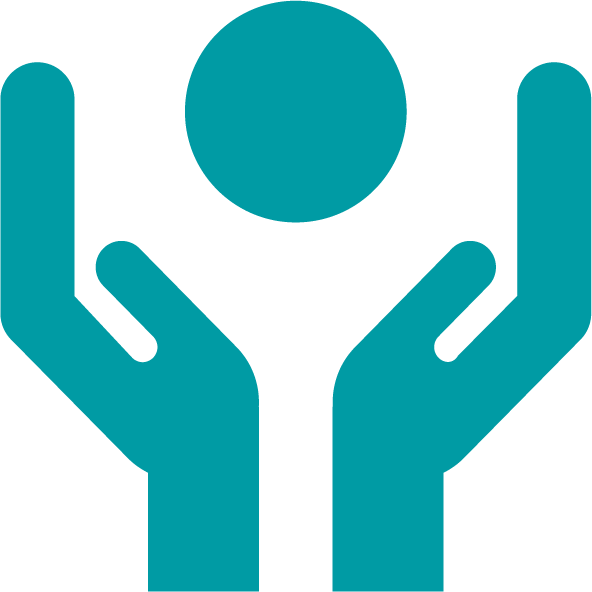
PROTECTION
Situation
Despite over four million Venezuelan refugees and migrants having received regular status in 17 host countries across Latin America and the Caribbean, challenges persisted in terms of long-term regularization and integration. These challenges include high costs, strict entry requirements and changes in asylum laws and procedures. Access to documentation was another challenge, also due to the suspension of diplomatic and consular relations between Venezuela and seven countries in the region after the July 2024 elections in Venezuela.
Internal conflicts and other situations of violence, such as those in Colombia and Ecuador, along with sudden climate events, like floods in Brazil and wildfires in Chile, worsened the protection situation for migrants and refugees. In addition, difficulties in accessing rights became a push factor in the search for safety and opportunities elsewhere. Tighter border controls and increasing administrative and procedural obstacles to safely enter these countries in a regular manner forced many vulnerable individuals in need of protection to seek risky solutions, often times being compelled to depend on smugglers or organized criminal groups to continue with their journeys.
Response
In 2024, 121 Protection Sector partners reached over 701K refugees and migrants. To facilitate access to protection services, regularization pathways, and asylum systems for those in need of international protection, partners prioritized legal assistance and counselling. Legal aid also contributed to prevention of refoulement and assisted those arbitrarily detained. Additionally, partners provided technical support to government authorities to strengthen national asylum systems, such as in Chile, where partners provided technical assistance to the refugee status determination process and contributed to case analysis during sessions of the National Commission for the Recognition of Refugee Status. Protection partners also promoted advocacy interventions for meaningful and effective adoption of public policies aimed at ensuring refugees and migrants have access to regularization pathways in host communities.
Community-based protection activities were carried out to address and create awareness on protection risks. For instance, in Bolivia, activities were implemented to promote peaceful coexistence among communities, or in Trinidad and Tobago and Brazil, where activities focused on enhancing the overall resilience of refugees and migrants. In Peru, partners trained refugees, migrants and members of host communities on psychological first aid assistance and identification, referral and monitoring of community protection cases.
Specialized protection services, including case management and referrals, were strengthened to support individuals at heightened risk. In Colombia, partners strengthened intersectoral protocols for case management and referrals. Capacity-building initiatives with government counterparts in Panama and Costa Rica, and with affected communities, promoted adherence to international protection principles and enhanced prevention and response to protection risks.
Partners continued regional and national advocacy efforts to promote the adoption and implementation of simplified national asylum procedures, aiming to ensure quick and fair access to protection for asylum-seekers and refugees.
At the regional level, the Sector harmonized indicators and questions for protection monitoring exercises implemented by partners, enhancing information sharing and contributing to coherent and comprehensive regional protection analysis. In 2024, participation in regional multilateral processes, such as the Quito Process, and engagement with the Inter-American Commission on Human Rights, reinforced regional common protection messages within these broader forums.
Lessons Learned
The suspension of diplomatic and consular relations between Venezuela and countries in the region severely hampered the implementation of key protection activities, including legal assistance and counselling for access to documentation, regularization and family reunification processes. Strengthened border control measures, including through increased presence of military forces, strict entry requirements and changes in asylum laws and procedures, such as in Argentina and Chile, limited partners’ access and capacity to deliver assistance to vulnerable individuals. Additionally, the outbreak of emergency situations leading to further migration and displacement, like the extreme climate events in Brazil and Chile, severely impacted refugees and migrants and members of the host communities as well as impacting operational capacity of partners to respond. A coordinated response must be reinforced to ensure that protection remains at the core of all partner activities.
Cover Photo by: NRC/KAREN DAVILA
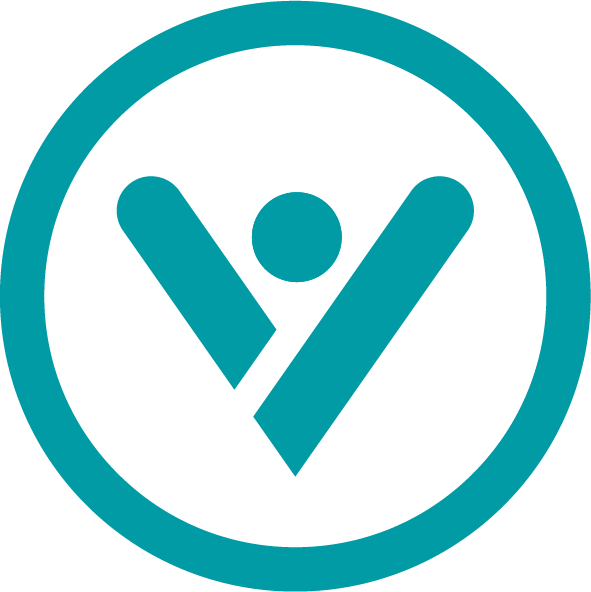
SUPPORT SPACES
Situation and Response
In 2024, 210 Support Spaces were active in nine countries: Argentina, Bolivia, Brazil, Chile, Colombia, Ecuador, Peru, Trinidad and Tobago and Uruguay, providing information, orientation, guidance, basic services and safe referral for refugees and migrants. These Support Spaces are coordinated through a network across the region and are located in key areas to migrants and refugees. In addition, these facilities are context-tailored to provide the best support possible to these populations.
Response
In 2024, The Support Spaces Initiative implemented 231 activities through 11 partners, including three organizations led by refugees and migrants who were involved in 77 activities in three countries. These Support Spaces provide orientation and information on rights and available services, identification of protection cases and safe referrals, and a range of multisectoral services aimed at promoting the dignity, well-being, and protection of refugees and migrants.
Throughout the year, the Support Spaces Initiative continued to coordinate with regional networks, including Red Clamor and the Regional Network for the Protection of LGBTQI+ persons. In June, the Initiative provided capacity-strengthening efforts for partner organizations from the LGBTQI+ Network. These alliances have played an important role in reinforcing a differentiated and diverse approach.
During the second semester, following the safe route’s session of the Quito Process, good practices in the implementation of Support Spaces were presented by state actors from Costa Rica, Colombia and Uruguay. This session, focused on promoting coordinated and responsive protection responses along migration routes, provided a platform for States to share concrete experiences and lessons learned in providing key services to refugees and migrants through Support Spaces. Emphasis was placed on the importance of institutionalizing mechanisms for care, information, and referral, and of promoting dialogue on how to implement the minimum standards outlined in the Toolkit on Support Spaces. As a result, the commitment of States to maintain and expand care and information structures for populations in situations of human mobility was reinforced. Finally, regional coordination with the Quito Process contributes to promoting coordinated and sustainable efforts with State and non-State actors.
Lessons Learned
Amid evolving movement trends and the need for more sustainable strategies for Support Spaces, it is essential to identify synergies with state actors to coordinate responses and harmonize the principles of care for guidance, information and safe referral. By harmonizing efforts and resources, ensuring that care, guidance, information, and safe referral mechanisms are in line with shared humanitarian principles, and working closely with governments, the response can better adapt to dynamic migration flows, institutionalize protection measures, and create durable frameworks that strengthen local capacities and ownership, which ultimately promotes more resilient and sustainable support systems for refugees and migrants.
In 2024, Support Spaces were strengthened through regional frameworks such as the Quito Process and deepened synergies with other regional initiatives, included the exchange of good practices, capacity-building trainings based on the Support Spaces Toolkit, and improved articulation between state and non-state actors. Additionally, deepened synergies with other regional initiatives including Red Clamor and the Regional LGBTQI+ Network facilitated the alignment of protection standards, enhanced referral mechanisms, and ensured more sustainable, rights-based support services for refugees and migrants across the region.
Looking ahead to 2025, the Support Spaces Initiative plans to develop a community guide focused on integration, as well as a comprehensive review of the Initiative.
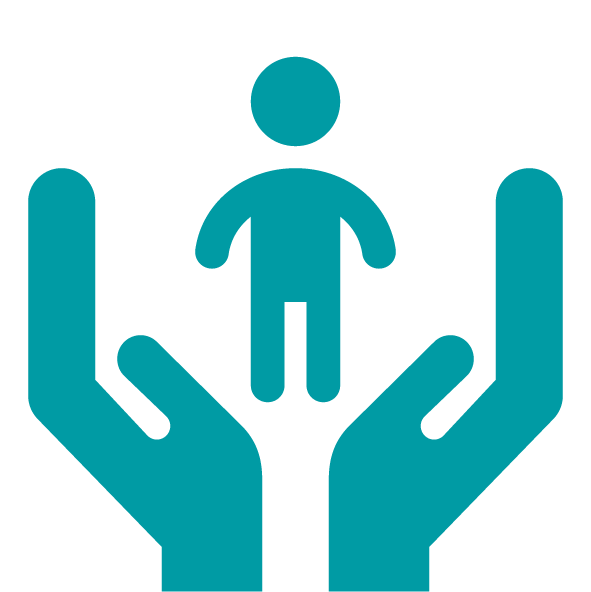
CHILD PROTECTION
Situation
In 2024, as highlighted in the RMNA 2024, refugee and migrant children continued to face severe protection challenges, including violence, abuse, exploitation, trafficking, family separation, and lack of documentation. Unaccompanied and separated children (UASC) are particularly vulnerable due to the absence of caregivers and difficulties in accessing essential protection services.
There are substantial numbers of UASC in several countries across Latin America and the Caribbean, with reports of many, particularly those on the move, spending the night in public or open areas, and generally being exposed to a range of protection concerns (including dangerous border crossings, child labour, and encounters with armed groups; often without being able to access essential services). For instance, in Panama, almost 4,500 UASC crossed the Darien jungle up to November 2024. In Brazil, the RMNA 2024 found that approximately 8% of all the children arriving in Brazil through Roraima were unaccompanied or separated and in Ecuador, 16% of Venezuelan refugee and migrant households had children in this situation.
There was a continued need for migrant and refugee children to access regularization, asylum, and documentation to ensure their protection, integration and access to essential services like education and healthcare. However, high costs, delays in consular procedures, and lack of prioritization were identified as obstacles to this process. As a result, many children remain in an irregular situation, lack documentation and/or are at risk of statelessness.
Response
In 2024, the Child Protection Sub-sector reached 87.1K refugees and migrants across 17 countries, 33.6% of the target population. Of all activities reported, 84% were implemented through direct assistance by 57 partners, including eight refugee- and migrant-led organizations. Core interventions included legal support and orientation, documentation and registration, prevention and response to violence, family reunification support, mental health and psychosocial support (MHPSS), and transitory care for UASC.
Partners also worked closely with national authorities to ensure the identification and referral of children at risk to appropriate services. In Ecuador, for instance, more than 15.8K children were referred for child protection and psychosocial support services, including UASC impacted by forced recruitment by criminal gangs. In the Dominican Republic, child-friendly consultations enabled caregivers and children to identify key challenges in accessing protection services, while in Trinidad and Tobago, interpretation support was provided to facilitate access to national protection mechanisms for Venezuelan children.
At a regional level, Child Protection Sub-sector partners held an event that brought a global perspective to the region, serving as a strategic dialogue to address the risks and protection needs of children and adolescents in humanitarian contexts in Latin America and the Caribbean. This dialogue was held within the framework of the 2024 Annual Meeting for Child Protection Humanitarian Action.
In terms of capacity building, partners supported the development and implementation of the new version of the learning package on Child Protection Minimum Standards, adapting it to the Latin America and Caribbean region. In-person training was delivered to R4V partners, reaching 40 people from across the region (national and International NGOs and other humanitarian actors). Partners also launched the regional directory of child protection services for the care of children, including migrants and refugees.
Lastly, the Sub-sector maintained close coordination with the Quito Process, to advance advocacy efforts for child protection and family reunification matters among the member states of this intergovernmental forum.
Lessons Learned
Regional coordination, contextualized tools, and inter-institutional collaboration strengthened child protection in 2024. Dialogue spaces fostered joint action among humanitarian actors, while adapting global standards to the regional context improved implementation. Coordination through the Quito Process advanced key priorities across Latin America and the Caribbean, like protection for unaccompanied children and family reunification.
Cover Photo by: UNICEF
GBV
Situation
In 2024, refugees and migrants, particularly women and girls, were at risk of gender-based violence (GBV) both in public and private spaces. Irregular migratory routes increasingly controlled by organized crime groups and persistent economic and political instability further increased GBV risks.
According to the RMNA 2024, in Ecuador, 20% of Venezuelan women and girls who were trying to reach another country reported feeling unsafe in relation to GBV risks. In Colombia, this same percentage reached 35% for Venezuelans and 33% for other nationalities. In Peru, women and girls on the move reported being threatened and propositioned for sex in exchange for food and transportation.
A 2024 World Bank study reported that at least two in five women have witnessed some form of GBV while on the move across Latin America. Access to GBV response services remain a critical challenge for them. In fact, 41% of survey participants knew women who had experienced physical, psychological, or sexual violence. This figure, however, likely understates the actual prevalence due to the persistent issue of underreporting.
Response
In 2024, the Regional GBV Sub-sector oversaw the multi-country response, supported national sub-sectors with technical guidance as well as with their coordination efforts, produced technical guidance on GBV risk mitigation and led regional trainings on inter-agency guidance to improve GBV programming. The sub-sector also worked with other sectors to mainstream GBV in their action plans throughout the year. Throughout the R4V countries, partners reached a total of 100.1K refugees, migrants and affected host community members through a range of GBV prevention, risk mitigation and response activities. Efforts focused on providing life-saving services, enhancing the capacity of duty bearers to deliver survivor-centred care, and advancing crucial prevention and risk mitigation initiatives.
The Regional Sub-sector co-facilitated, alongside the leaders of the Sub-sector in Colombia and other actors from Venezuela, a three-stage training of trainers for 24 women-led organizations on Minimum Standards in GBV Programming. Furthermore, the Sub-sector launched an online GBV Case Management in Emergencies course attended by 128 people from 10 countries. Other achievements included supporting the establishment of a network of 22 organizations from 10 host countries working on GBV prevention and response. They received information on funding opportunities; peer-to-peer technical support to produce key messages on protection from GBV; GBV standardization for different operations in the area; and facilitating a training on GBV Guiding Principles and Safe Referrals for 23 NGO staff members in Peru, Colombia and Ecuador.
Additionally, the GBV Sub-sector participated in the Quito Process and Cartagena+40 consultations to advocate for the prioritization of GBV response and risk mitigation in the humanitarian agenda, in inter-governmental agreements on safe migration and for the meaningful participation of women-led organizations.
GBV risk mitigation efforts included collaborating with other sectors. In this sense. a regional workshop on GBV risk mitigation in cash assistance was conducted for Brazil, Peru and Ecuador, resulting in CVA Working Group partners in these countries adopting GBV risk assessment tools in their cash assistance programming and committing to training cash providers on GBV risks as part of their work plans.
Lessons Learned
GBV programmes, throughout 2024, faced significant obstacles in conflict affected areas and those with broad presence, including under direct control of organized criminal and non-state armed groups in parts of Ecuador, Colombia, northern Chile, Guyana and the Brazilian border with Venezuela. Despite these obstacles, progress was made through the expansion of essential services and activities such as mobile safe spaces and brigades, and by building strong partnerships with state authorities, local civil society, and community-based organizations.
In 2025, sustaining GBV interventions will require a stronger focus on the localization of GBV prevention and response putting at the forefront local actors, in particular women-led organizations, while pushing for further government ownership. This would entail also an increased and meaningful inclusion of women-led organizations in decision making fora. These groups are vital for maintaining continued access to refugees and migrants, fostering local ownership and ensuring sustained territorial presence. Strengthening these partnerships is crucial for long-term impact and sustainability in GBV programming.
Cover Photo by: UNHCR
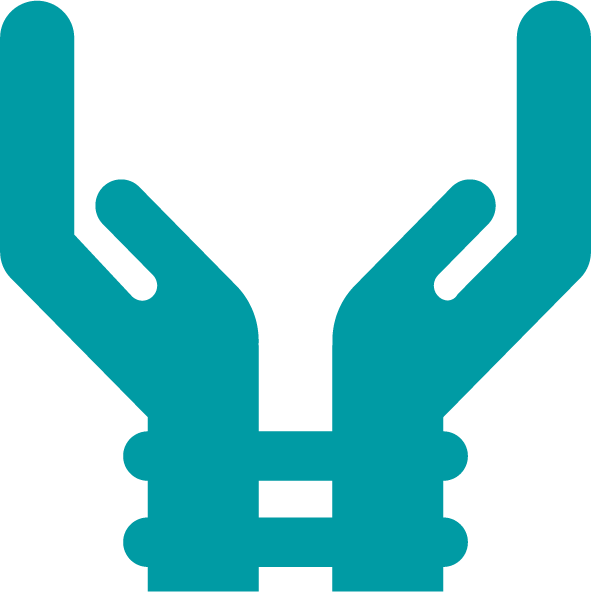
HUMAN TRAFFICKING & SMUGGLING
Situation
Refugees and migrants continue to be at risk of human trafficking and migrant smuggling throughout the region, with many Venezuelans identified as victims of trafficking. In fact, human trafficking has been continuously evolving and specially increasing among refugees and migrants, affecting disproportionately women and girls. According to UNODC’s Global Report on Trafficking in Persons released in December 2024, in Central America and the Caribbean, 52% of all detected victims were girls and 30% women. Out of the total, 62% were trafficked for sexual exploitation, with female victims comprising nearly the entire group—slightly more girls (56%) than women (41%). In South America, women and girls made up 62% of all detected trafficking victims.
In 2022, the most common form of exploitation in South America was trafficking for forced labour (55%), followed by trafficking for sexual exploitation (40%). As for smuggling, risks in the region have increased significantly for migrants and refugees, particularly along the more dangerous routes through the Darien jungle and across Central America and Mexico, largely due to increasingly restrictive migratory policies. According to the Mixed Migration Centre, in 2024 around 30% of women and men on the move used smugglers, especially for transit across countries (88%); in-country transit (64%), as well as food and water and access to communications (30%). As noted in the RMNA 2024, the most vulnerable groups vis-a-vis trafficking include refugees and migrants trying to reach another country or those in an irregular situation, particularly women, unaccompanied or separated children, indigenous and Afro-descendant peoples, persons with disabilities, sex workers, and LGBTQI+ individuals.
Response
In 2024, the Human Trafficking and Smuggling Sub-sector promoted comprehensive responses to both crimes by involving a diverse range of actors. The strategy focused on the “4Ps”: prevention, protection, prosecution, and partnership. In total, the sub-sector reached 10.5K people through 10 partner organizations, three of which were led by migrants and refugees.
Community-based prevention and protection assistance remained central to the sector’s work, supported by direct assistance, regional collaboration, and awareness campaigns. A key focus was also placed on institutional capacity-building to enhance governmental ownership through regional coordination networks.1 Along key migratory routes, partners supported enhanced collaboration to address human trafficking and smuggling of migrants. This included the launch of the first digital Case Management system in the Caribbean for Victims of Trafficking in Trinidad and Tobago, developed together with government stakeholders; the approval process of a new antitrafficking law in Panama; and the establishment of a data collection tool on trafficking in persons for Costa Rica.
The Sub-sector also strengthened coordination with the Quito Process Working Group on Trafficking in Persons. A Consular Guide to assist the relocation of victims of trafficking to third countries was validated during a session on safe routes and protection. For the first time, women’s ministries participated in the session, sharing best practices for addressing trafficking from a gender and intersectional perspective. The ministries of Peru, Chile, and Costa Rica presented innovative approaches to adapting responses to the needs of refugee and migrant women facing exploitation.
Additionally, Quito Process’ Early Identification of Human Trafficking Toolkit was introduced in a training workshop in Argentina, which was also supported by Sub-sector partners. This helped strengthen the connection between development and peace, further strengthening the work carried out within R4V. Sub-sector partners built alliances with the Comprehensive Regional Protection and Solutions Framework (MIRPS) and specialized networks of authorities, such as CORETT, REDTRAM and the Regional Platform to Combat Human Trafficking and the Illicit Smuggling of Migrants (PRETT, for its acronym in Spanish). The Sub-sector also collaborated with other R4V sectors and sub-sectors, including Humanitarian Transportation, Integration, Child Protection, and GBV, to better address the growing risk of gender-based violence—including human trafficking and smuggling — along routes.
Lessons Learned
Challenges in 2024 included adapting the response to evolving dynamics linked to organized crime, including new trafficking routes, reverse north-south movements and rising protection risks. Targeted technical assistance at border points and increased collaboration with other regional networks significantly enhanced the capacity of frontline authorities to detect, identify, and refer cases of trafficking and smuggling. Specialized training, tools, and protocols aligned with international standards improved operational readiness and fostered stronger synergies between border units and central authorities, ensuring more coherent and effective national responses.
Cover Photo by: UNODC/CARLOS BANDEIRA JR.
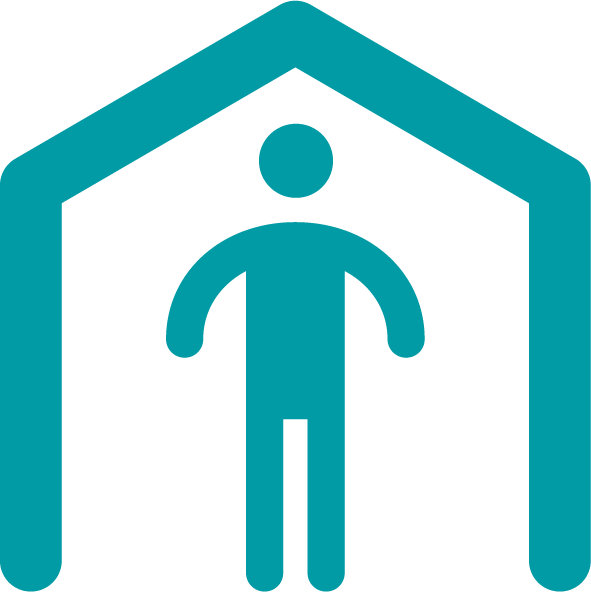
SHELTER
Situation
In 2024, access to shelter remained a top priority for refugees and migrants in the region. Social and physical barriers have exacerbated issues such as homelessness, evictions, overcrowding or inadequate housing, and relocation to peripheral areas or informal settlements. Many migrants and refugees faced compounded challenges due to insecurity, violence, and the impacts of environment and climate events in host territories. As highlighted in the RMNA 2024, approximately 73% reside in rented accommodations, with higher rates observed in Argentina, Ecuador, and Panama. Strict rental requirements, high costs, financial constraints, and the lack of rental subsidies have contributed to precarious living conditions. Around 20% of households are reported to be at risk of eviction or have already been evicted. Meanwhile, emergency solutions such as temporary collective accommodation options were deemed insufficient, with emergency shelters often unable to meet demand due to closures or inadequate infrastructure.
Response
In 2024, the Shelter Sector reached a total of 128.4K people across 17 countries, representing 27% of the target population. Out of the total activities, 83% were implemented through direct assistance by 59 organizations, including nine organizations led by refugees and migrants, and the other were related to capacity building.
Half of activities implemented were on individual shelter solutions, mostly rental programmes such as Housing, Land and Property (HLP) support to minimize the risk of eviction, prevent overcrowding and promote conflict resolution between tenants and landlords. These activities were followed by collective shelter solutions, with partners focusing on improving shelter infrastructure and supporting management through technical assistance and capacity building. For instance, following a storm in Roraima, Brazil, R4V partners together with the government and the military formed a task force to provide dry mattresses, re-establish 650 structures, isolate areas and manage the flow of people.
Other activities included the delivery of non-food items (NFIs), with the distribution of items to deliver daily tasks, such as clothing, sleeping and cooking items. Community infrastructure-related activities were also implemented, with area-based interventions such as in settlements playing a vital role in promoting social and cultural integration and empowering local authorities.
Shelter Sector partners continued to coordinate activities with various sectors, aiming at delivering integrated solutions. The Shelter and the Integration Sectors, published “Strengthening the territorial approach to integration” guidelines that furthered these efforts. Coordination with the R4V Environment Group was enhanced, training shelter partners in both Virtual Environmental and Humanitarian Adviser (VEHA) and Nexus Environmental Assessment Tool (NEAT+) to mainstream environmental considerations into the shelter response. These trainings were conducted alongside REDLAC and the Global Shelter Cluster (GSC), paving the way for further humanitarian architecture alignment in 2025. Additionally, efforts were initiated with the GBV Sub-sector and the WASH Sector, with plans for further guidance to be published throughout the year.
Lessons Learned
Despite the significant challenges refugees and migrants face in accessing shelter—including high rental costs, financial constraints, strict rental requirements, and limited access to housing subsidies, all of which often result in precarious living conditions—important progress has been made in strengthening government commitment and response capacity. This progress has enabled more robust programmatic linkages to social protection schemes and broader development initiatives, thereby advancing and sustaining the inclusion of migrants and refugees within public policies.
For example, in Uruguay the R4V partners worked together with the Government on the implementation of the “Support Program for Socio-Urban Integration of Migrant Populations” (original title “Programa de Apoyo a la Integración Socio Urbana de la Población Migrante”) which aims to promote the social and urban integration of refugees and migrants.
There is growing recognition of the need for more sustainable solutions that are not only embedded within public policy frameworks but also driven by localization efforts and strengthened through increased engagement with the private sector.
Cover Photo by: R4V
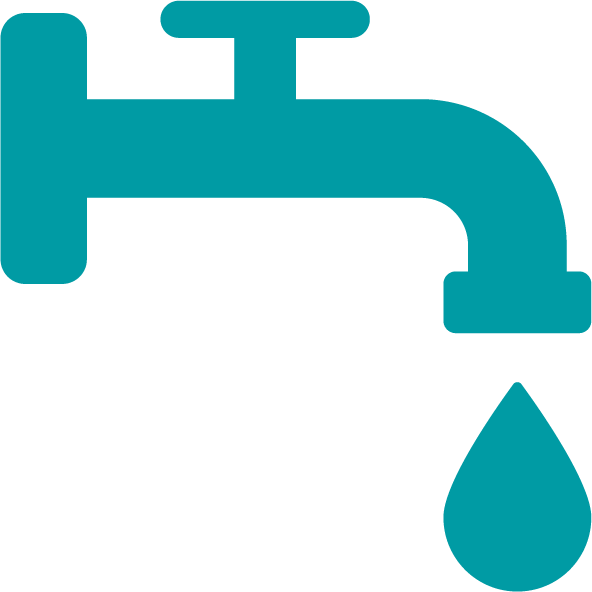
WASH
Situation
The RMNA 2024 demonstrated that life-saving WASH services, particularly access to water, remained one of the primary needs for refugees and migrants trying to reach another country. Four countries – Colombia, Ecuador, Peru and Panama – showed alarming rates of limited or non-existent WASH facilities and services, resulting in unsafe open defecation practices and other health risks such as dehydration and gastrointestinal illnesses among this population.
For migrants and refugees in-destination, challenges in accessing WASH services continued throughout 2024. Although Venezuelan households have access to improved water infrastructure, the supply of water is often insufficient to meet basic needs, as evidenced in Argentina, Ecuador and Peru. This led families to depend on more costly and less reliable water sources. Furthermore, sanitation facilities are often shared with other households or strangers, compromising safety and dignity, while access to hygiene items remains limited due to financial or supply shortages.
High-need areas such as informal settlements, which are often overlooked by local authorities due to regulatory conditions, face significant challenges in accessing adequate WASH services, exacerbating the conditions for refugees and migrants living there. Additionally, the effects of climate change are further intensifying water scarcity in the Latin America and Caribbean region each year, disproportionately affecting migrant and refugee communities, often settled in flood prone or water scarce areas.
Response
In 2024, WASH partners continued to respond to the critical WASH needs of refugees and migrants. The Sector reached over 152K people with 1.39K activities carried out by 42 partners. Part of those reached included migrants and refugees at the Temporary Migrant Reception Stations (ETRMs) in Panama or the Southern Migration Stations (EMISUR) in Costa Rica, where life-saving WASH services were delivered to those in the most vulnerable situations, such as women and children.
The response across the region was largely implemented through direct assistance (91%), encompassing the provision of safe water, sanitation, washing facilities, and hygiene services and items, including menstrual hygiene. At crossing points between Peru/Bolivia and Bolivia/Chile, these services were delivered on both side of the borders in the orientation and attention points (PAO, for its acronym in Spanish). In Brazil, R4V partners worked on joint initiatives with the government, investing in key infrastructure, including the installation of semi-permanent latrines and the improvement of water access in the official shelters.
The model of the “hygiene corners” was successfully scaled up in most R4V countries: hygiene corners are safe spaces where migrants and refugees could choose the hygiene items that were most adapted to their situation (menstruation management, baby diapers, underwear, hand washing or laundry soap, and others).
Longer-term WASH interventions were also implemented. For example, in Huaquillas, Ecuador, R4V partners rehabilitated wells and enhanced the water supply system for host communities, migrants and refugees. Across various host countries, partners also rehabilitated healthcare facilities, schools, and community kitchens. These efforts included distributing hygiene items, filters, and water tanks, coupled with social behavioural change and hygiene promotion campaigns in order to enhance safe water access and treatment in households.
Coordination and response efforts were strengthened through capacity building activities to enhance collaborative WASH response capacity. For instance, in Brazil a WASH technical committee was established with local authorities, and a laboratory for monitoring water quality for host communities as well as migrants and refugees was set up in coordination with the local municipality. Similarly, in Colombia, the Sector developed a Hygiene Promotion in Emergencies Operational Framework to standardize hygiene practices and items for partners, demonstrating the sector’s commitment to leveraging existing capacities and expertise for a more coordinated and effective response.
Lessons Learned
Despite challenges related to costs and maintenance of infrastructure, WASH partners continued providing life-saving WASH services. In 2025, the sector will prioritize lasting solutions in high-need areas, such as informal settlements, which are less likely to receive local authority support to guarantee access to WASH. Effective long-term interventions will further support the integration of local communities, promoting social cohesion and community development.
To enhance the effectiveness and sustainability of WASH services, the sector will continue strengthening local coordination mechanisms This involves establishing clear lines of communication, defining roles and responsibilities, building partnerships and promoting collaboration between WASH actors, R4V sectors, government agencies, and other stakeholders.
Cover Photo by: UNICEF
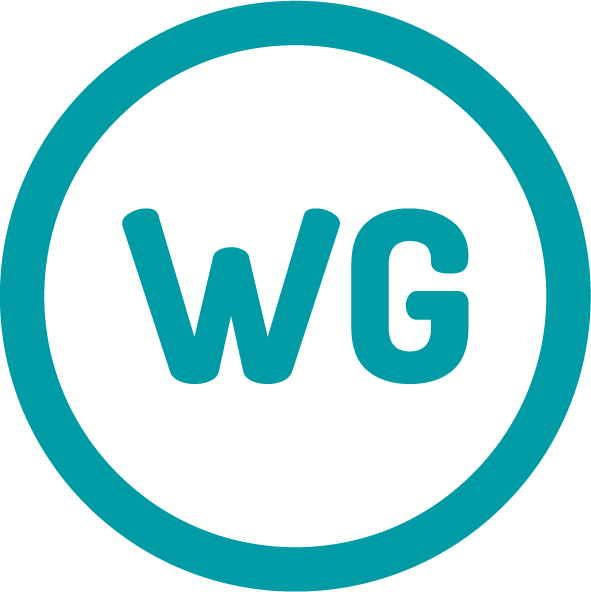
MULTIPURPOSE CASH ASSISTANCE (MPC)
Situation
After six years, the widespread inability of refugees and migrants to generate sufficient income impedes many from meeting their basic needs, accessing services, and exercising their fundamental rights, in turn continuing to undermine their socio-economic integration. Although significant progress was achieved in some countries in providing migratory regularization, refugee recognition and integration opportunities (such as in Colombia), this has not yet translated into comprehensive access to services and rights for the majority of refugees and migrants in the region. In particular of those engaging onward or transit movements, as well largely remain dependent on humanitarian assistance.
To respond to the varied needs, throughout 2023, cash and voucher assistance (CVA) was the preferred modality of assistance among refugees and migrants both in-transit and in-destination – in particular, multipurpose cash transfers. As noted in the RMNA 2023, cash was the preferred response modality of 61% of refugees and migrants in need of food, and of 77% of those in need of housing.
The large majority of CVA implemented in the region is targeted at in-destination refugees and migrants, who are the overwhelming proportion of refugees and migrants in the region. As concerns those in-transit, the RMNA 2023 showed that while 88% of the in-transit population in Colombia reported not having enough resources to cover their basic food requirements, with only 2% having reported receiving cash-based assistance between April and May the same year.
Response
Cash and voucher assistance has been a key response modality to meet basic needs of refugees and migrants in LAC. In 2023, some 30% of the people reached by the overall R4V response received assistance in the form of cash or vouchers. In addition, 257K people (40,7% of the target population) benefitted from multipurpose cash transfers (MPC), 74% of whom were women and children. However, this amount fell far short of the targeted population due to funding gaps for this intervention (15,1% of funds needed were received).
In 2023, the Regional Cash Working Group supported the regional coordination of cash-based interventions, the use of MPC linked with sectoral services, and the strengthening of linkages between humanitarian assistance and social protection to integrate refugees and migrants into national systems. This was done by means of partnering with regional sectors and key stakeholders, promoting inter-country dialogue and information sharing, compiling and disseminating relevant regional knowledge, and capacity-building trainings and workshops. Three capacity-building events worth highlighting are the “Basic Principles of Cash Transfers” and “Cash Transfers and Child Protection,” which trained approximately 50 regional and national actors in Panama and Bogota, respectively. Additionally, the virtual three-day Regional Learning Event “Linking CVA and Social Protection Systems” in Latin America and the Caribbean attracted an average of 90 attendees per session and garnered over 900 views of the recordings.
Lessons Learned
Cash and voucher assistance was unequally distributed across countries, with Colombia and Peru accounting for more than 87% of all CVA. A very small proportion of CVA is provided to in-transit populations, that tend to be in greater need of food and basic services, while being exposed to significant protection and safety risks. The CVA Working Group will continue to coordinate and offer technical assistance to partners in other R4V country platforms, to assess the viability of CVA methodologies outside the larger responses along the Andean Corridor.
Suggestions to improve the coordination and implementation of CVA in the region includes supporting the work on route-based approach to CVA in the region; and continuing to strengthen the linkages between social protection and humanitarian assistance.

ENVIRONMENT
Situation
2024 was marked by a series of extreme weather events across Latin America and the Caribbean, which resulted in loss of lives, displacement, disruption to livelihoods and extensive damage to critical infrastructure, significantly impacting communities. The climate-related impact from the El Niño phenomenon was evidenced in various countries in the region. These included altered rainfall patterns leading to widespread droughts, while, conversely, other areas experienced heavy rainfalls, resulting in flooding, flash floods and landslides, causing fatalities and economic loss. In addition, the region was also impacted by several tropical storms and hurricanes, causing extensive damage and devastation.
Climate variability and extreme weather events placed additional pressure on the agrifood system and food security, affecting community farmers and small-scale producers, as well as vulnerable populations, already facing poverty, inequality or marginalization, including refugees and migrants. These groups are more vulnerable to climate impacts, which exacerbate poverty, limit access to drinking water and increase food insecurity and malnutrition, especially in the aftermath of conflict or climate-related disasters.
Furthermore, large movement of migrants and refugees, along with large-scale humanitarian responses, contributed to environmental strain along key routes and areas of congregation. In the Darien jungle, for example, these movements and responses have led to further deforestation, pollution, and pressure on local ecosystems and Indigenous communities.
Response
Building on the integrated strategy developed in 2023, which reaffirmed R4V’s commitment to operationalizing the Humanitarian-Development Nexus in its activities and response, efforts in 2024 to operationalize this strategy included strengthening capacities for environmentally durable solutions, raising awareness and improving the resilience of both communities and the environment to external shocks and hazards.
In order to attain environmentally durable solutions and reinforce the “do no harm” approach, several capacity building and regional trainings were conducted for R4V partners. In July, a training was held with the Shelter Sector to facilitate the use of the Virtual Environmental and Humanitarian Adviser (VEHA tool). Following this training, a new package of the Nexus Environment Assessment Tool (NEAT+) was developed for the LAC region. Furthermore, a November training grouped the R4V Shelter Sector, the Global Shelter Cluster, IFRC and the UNEP-OCHA Joint Environment Unit. Participants acquired knowledge about the relevance of the NEAT+ for environmental screening and gained practical understanding based on a real case studies.
Finally, the Environment Focal Point led the creation of a new Environmental Marker, presented during the RMRP 2025-2026 activity submission process webinar in August 2024. This marker, as part of the newly integrated strategy, focused on durable solutions by enhancing communities’ and the environment’s resilience to shocks and hazards through a humanitarian, peace and development nexus approach. It measures actions which include Nature-based-Solutions (NbS) and environmental restoration, aiming to address the compound needs of migrants and refugees affected by climate change, violence and conflict. The survey of 261 organizations highlighted the current state of environmental mainstreaming and the strategic implementation.

PROTECTION AGAINST SEXUAL EXPLOITATION AND ABUSE (PSEA)
Situation
In 2024, risks of sexual exploitation and abuse (SEA) continued to be a critical concern across the R4V response. The convergence of humanitarian needs, limited access to protection pathways, and unequal power dynamics between affected populations and service providers can lead to SEA, which often go unreported. Populations on the move, particularly women, girls, unaccompanied and separated children (UASC), other vulnerable groups and those without regular status, remained at heightened risk, especially when navigating unfamiliar systems, while trying to reach another country, or when dependent on assistance to meet basic needs. These risks are compounded by limited availability of services, challenges in accessing regularization, and insufficient awareness about rights and reporting mechanisms.
Findings from the RMNA 2024 and the UN Secretary-General’s PSEA 2024 report point to systemic gaps in SEA prevention and response. Despite ongoing efforts, only half of households in R4V countries receiving assistance reported knowing how to file complaints or feedback about organizations or staff, with knowledge rates dropping to 29% among those on the move. Additionally, more than 1 in 10 surveyed households were unaware that humanitarian assistance is provided free of charge, a figure that increases to 32% amongst those on the move, placing them at significant risk of exploitation. The RMNA 2024 also indicated that misinformation, lack of safe reporting channels, and minimal understanding of the expected behavior of aid workers persist across multiple contexts, including high-risk routes.
Response
In 2024, the R4V PSEA Community of Practice (COP) prioritized strengthening Protection from Sexual Exploitation and Abuse (PSEA) through the identification of SEA risks, investment in partner capacity assessments, tailored capacity-building plans, and leveraging inter-agency collaboration among R4V and United Nations Country Teams (UNCT) technical and senior leadership.
Key achievements emerged from PSEA capacity assessment and strengthening efforts, where partnerships between the COP and four R4V Civil Society partners in Peru, Costa Rica, Ecuador, and Chile proved transformative in how these R4V key responders address SEA. These partnerships led to the development of impactful PSEA organizational measures, such as the development of policy documents, inclusion of SEA clauses in contracts, mandatory PSEA training for personnel, and systematic vetting procedures for recruitment. Partners mapped victim assistance services, ensuring survivors can access lifesaving, survivor-centred support.
Another key achievement was the interagency SEA Risk Assessment conducted in Chile in November 2024, in collaboration with multiple UN entities and the PSEA National Committee. Engaging over 80 migrants and refugees, 28 frontline responders, and 16 representatives from various organizations, the assessment identified key vulnerabilities, risks related to operational modalities of the response, and gaps in reporting mechanisms and support systems for survivors. Collectively, these efforts strengthened PSEA frameworks and can foster safer environments for refugees and migrants.
The COP adapted and launched the “Together We Say No” materials, creating 15 tailored pieces. The regional launch was carried out using art, in a theatre forum format, highlighting various manifestations of sexual exploitation, abuse, and harassment (SEAH) and discussing preventive measures among staff from various R4V organizations, including Regional Directors. This successful format led countries like Ecuador and Peru to replicate the event with national theatre companies.
Lessons Learned
In 2025, implementing strategic priorities on PSEA will be focused on including further financing and support for PSEA-specific activities and tackling inconsistent engagement across platforms and countries due to gaps in dedicated capacity. Local organizations exhibit varying levels of PSEA capacity; therefore, efforts will be concentrated in providing technical support for smaller partners to adapt their internal systems.
A key lesson learned to enhance coordination and maximize resources for PSEA is the pooling of small funds from different partners in the COP, the Gender-Based Violence Sub-Sector, and sectors such as Shelter and Humanitarian Transportation. This collaborative funding approach supported several capacity-building programmes, enhanced technical contributions, and strengthened partnerships, learning, and synergies among R4V partners. Implementing this strategy in the coming year will be essential for further implementation of PSEAH measures and continuing response activities with safety, dignity, and integrity.

ACCOUNTABILITY TO AFFECTED POPULATIONS / COMMUNICATION WITH COMMUNITIES (AAP/CwC)
Situation
Throughout 2024, the operational context in Latin America and the Caribbean continued to shift, driven by evolving movement dynamics, policy changes, and increased enforcement along major routes. These developments impacted how Accountability to Affected Populations (AAP) and Communication with Communities (CwC) were integrated into the response. While there was visible progress in institutionalizing participation and feedback mechanisms in some countries, efforts to ensure consistent and meaningful engagement across the region remained uneven. Many migrants and refugees continued to face barriers in timely, accurate and actionable information. Language, digital exclusion, and limited outreach in rural and border areas contributed to persistent gaps in two-way communication. At the same time, the increasing reliance on digital platforms for both information sharing and access to services highlighted the urgency of addressing the digital divide, especially for groups such as older adults, people living with disabilities, and indigenous populations. Ensuring that communication strategies are inclusive and that feedback mechanisms are used to inform decision-making remains a key challenge and strategic priority for the region.
Response
In line with the RMRP 2024 priorities, the AAP/CwC Working Group focused on three key areas: (1) strengthening localized feedback systems, (2) strengthening inter-agency efforts to apply minimum AAP actions, and (3) promoting inclusive and accessible communication approaches. Throughout the year, several R4V national platforms strengthened and adapted existing community feedback mechanisms by aligning them with global technical AAP standards, while tailoring approaches to fit their specific operational contexts and community needs. In Chile, an inter-agency mission to the temporary facility in Lobitos supported the rollout of a community feedback mechanism designed to collect and respond to the opinions, questions, and suggestions of migrants and refugees, with active involvement from local authorities. The mission included a training session on feedback systems for 58 partners and civil servants, alongside direct consultations with Venezuelan migrants and refugees using the facility, ensuring the approach was context-specific and informed by community input. In Bolivia, over 300 people used established channels to share concerns and suggestions, contributing to more informed programmatic decisions. In Peru, Ecuador and Colombia, partners worked to better connect community feedback with referral pathways and service delivery, helping improve trust and responsiveness on the ground.
In Brazil, the inter-agency U-Report Uniendo Voces continued to serve as a participatory communication tool, engaging a new group of Venezuelan youth volunteers. The platform enabled open dialogue on issues like mental health and climate change, ensuring the centrality of community perspectives in ongoing programming.
At the regional level, the AAP/CwC Working Group collaborated closely with the Protection Sector and Communications Working Group to co-develop harmonized messaging on rights, services, and procedures. Capacity building remained a core component of the response, with briefings and joint training sessions on how to effectively integrate minimum AAP actions into programmes held for the Trinidad and Tobago and Shelter Sector partners.
Additional exchanges were also rolled out in coordination with R4V partners and UN agencies, aiming to strengthen common approaches to accountability and reinforce community engagement practices across the regional platform.
Lessons Learned
In 2024, integration and mainstreaming of AAP continued to face challenges in some national responses, particularly where rapid shifts in migratory policies and operational pressures limited partners’ ability to sustain structured community engagement. In several contexts, digital and language barriers, as well as limited institutional ownership of AAP, reduced the effectiveness of feedback channels. For 2025, the AAP/CwC Working Group will focus on reinforcing coordination at country level, promoting the inclusion of AAP in preparedness and response planning, and expanding the use of context-appropriate, low-tech solutions to consolidate and expand the reach and accountability in volatile and hard-to-reach areas.

COMMUNICATIONS
Situation
In 2024, the spread of harmful disinformation about migrants and refugees intensified across media and social networks, directly affecting their lives and undermining the credibility of organizations working to support them. This surge in disinformation was closely linked to heightened levels of xenophobia, which hindered the integration of refugees and migrants in the 17 R4V countries, resulting in discriminatory hiring practices and significant barriers to accessing housing, as reported in the RMNA 2024.
At the same time, refugees and migrants continued to face persistent challenges due to inconsistent and often inadequate access to reliable and timely information. False and misleading content spreads widely across social media platforms commonly used by them, leaving many vulnerable to fraudulent job offers, human trafficking, and perilous journeys.
Migrants and refugees require accurate information to make informed decisions regarding their safety, regular status, and access to essential services. However, according to the RMNA 2024, three out of four refugees and migrants in Ecuador reported lacking the information and resources needed to navigate their journeys safely. In Colombia, 60% of migrants and refugees moving through the region indicated that they had not received the necessary information about their rights and available services.
Together, the proliferation of disinformation and the lack of trustworthy and accessible information continue to have a profound impact on the protection, inclusion, and well-being of refugees and migrants across the region.
Response
In response to the challenging disinformation landscape described, the Regional Communications Working Group focused on combating xenophobia and promoting social cohesion by improving public understanding of migrants’ and refugees’ realities, emphasizing their contributions to society.
A key achievement within the overall strategy was the digital campaign for the R4V documentary “The Journey That Never Ends”. This documentary highlighted the experiences of four refugee and migrant families in Panama, Ecuador, and Peru. Eight promotional videos and targeted social media messages achieved global reach, generating nearly 5M views, 18M impressions, and close to 190K interactions on ‘X’. On YouTube, the campaign reached nearly 652K viewers and attracted almost 400K new visitors to R4V’s profile.
To put a human face on the experiences of migrants and refugees across the region, R4V produced 12 video stories. These stories reached over 40K people through R4V’s profiles on X and YouTube. Additionally, content missions were carried out in Ecuador and Costa Rica to support public dissemination of human-interest stories.
The Communications Working Group strengthened awareness of R4V’s mission by developing strategies to disseminate and amplify the impact of evidence-based insights into regional needs and priorities while calling for global solidarity. These efforts included 360º communications plans, featuring media outreach, videos, social media content, key messages, newsletters, and real-time coverage of high-level events.
The Communications Working Group also supported R4V’s sectors, national and sub-regional platforms, and the regional team in creating products to communicate key contextual, operational and strategic information and initiatives.
Lastly, public communication messages were prepared in coordination with partners to address political and social developments impacting refugees and migrants, as well as to counter misinformation about the response. Close collaboration with the Regional AAP/CwC Working Group was key in identifying information needs, closing gaps, and supporting refugee and migrant protection in adverse contexts.
Lessons Learned
The greatest challenge for the Communications Working Group was effectively responding to media disinformation and false narratives about migrants and refugees spreading on social media. Tackling this issue requires stronger coordination with communications teams across the region to anticipate emergencies and counter misinformation with positive content, highlighting the contributions of refugees and migrants to host communities.
In 2025, the Working Group will continue to develop accurate and reliable content to counteract negative narratives and highlight the challenges and contributions of migrants and refugees to host communities, ensuring that media, decision-makers, and the public are well-informed. Additionally, it is crucial to underscore the importance of the R4V response in supporting the most vulnerable populations and complementing the efforts of governments in the region.

GENDER
Situation
In 2024, gender inequalities remained a defining feature of the experience of refugees and migrants across the 17 countries of the R4V Platform. According to the RMNA 2024, women, girls, and LGBTQI+ migrants and refugees continued to face intersecting barriers that limited their access to rights, services, and opportunities for integration. Across the region, they were disproportionately affected by inadequate shelter, poor WASH conditions, and limited access to healthcare, employment, education, and protection services.
Increasingly restrictive migratory policies and xenophobia further exacerbated these challenges, hindering social integration for these groups. Women were more likely than men to work in informal jobs and faced greater barriers due to caregiving responsibilities. In Colombia, 79% of refugee and migrant women were in informal employment, and in Brazil, only 21% of working-age migrant and refugee women had access to formal jobs, compared to 42% of men. These disparities reinforced the feminization of poverty, dependency on intimate partners, and exposure to exploitation. Indigenous people, particularly women, faced added discrimination due to language and cultural barriers.
Overcrowded and unsafe shelter conditions exposed women, girls and LGBTQI+ individuals to heightened protection risks. They continued to experience unsafe conditions in public spaces and other daily activities like commuting to school or work. These gendered risks, compounded by xenophobia and stigma, marked the specific needs of these groups this year.
Response
R4V partners incorporated an intersectional gender perspective as a priority in their activities for the RMRP 2025-2026, and in the preparation of the RMNA 2024. This approach considered factors such as age, gender, sexual orientation, ethnicity, and disability, among others, to help bridge gender gaps and empower the most vulnerable population groups—whether those trying to reach another country, engaged in pendular movements, or at their destination. Pregnant women, female head of households, girls, adolescents, LGBTQI+ individuals, and people with disabilities have been at the centre of the RMRP response. As part of these efforts, training on the Gender and Age Marker (GAM) was conducted with partner organizations to further integrate gender, age, and diversity perspectives into R4V responses. Furthermore, the gender and age marker was a prerequisite for all R4V partners when registering activities for the RMRP 2025-2026.
Coordination efforts with the Quito Process Gender Working Group led to a meeting on safe migration routes from a gender perspective, marking the first-time participation of women’s ministries from across the region. The ministries of Peru, Chile, and Costa Rica shared innovative approaches to tailoring responses to the needs of refugee and migrant women on the move.
R4V partners also delivered gender-sensitive life-saving services. Shelters such as Casa de Acogida Esperanza in Uruguay, played a crucial role in supporting women migrants and refugees, including those from Venezuela. These shelters provided refuge, legal guidance, psychological and labour counselling.
Brazil
Situation
In 2024, Brazil’s commitment to welcome migrants and refugees from Venezuela continued to stand out in the region, despite increased pressure on public services in key border and relocation areas. Through the government-led Operation Welcome (Operação Acolhida), Brazil maintained a solutions-oriented approach, while responding to urgent and basic needs, welcoming over 650,000 Venezuelan refugees and migrants by end-2024. Amid Venezuela’s electoral process in July 2024 and its aftermath, Brazil experienced a notable surge in arrivals, particularly in the border city of Pacaraima.
Unlike trends in many neighbouring countries, most Venezuelans arriving in Brazil intended to stay. According to the RMNA 2024, 96% of Venezuelans expressed their intention to remain in Brazil throughout the following year, reflecting their hope for stability and Brazil’s growing role as a destination for durable solutions.
Overall, the political and socio-economic environment in Brazil remained relatively stable, allowing for continued access to documentation, basic services, and local integration opportunities. For many Venezuelans, these developments reinforced the possibility of building a stable future in Brazil. While some continued to face socio-economic challenges, the availability of documentation and inclusive policies enabled many to regularize their status and pursue local integration opportunities rather than engaging in onward movement.
Response
Throughout 2024, the R4V Brazil National Platform’s response shifted strategically toward deepening intersectoral coordination, enhancing inclusive policy engagement, and promoting sustainable integration efforts, with the aim of enhancing complementarity to government-led efforts. The response prioritized strengthening institutional partnerships, enhancing local response capacities, and promoting full inclusion of refugees and migrants into Brazilian society. Rather than focusing solely on humanitarian relief, partners worked collaboratively to lay the groundwork for longer-term resilience and integration.
R4V partners’ interventions in Brazil benefitted some 97.7K refugees and migrants from Venezuela and affected host communities. One of the most notable achievements was the sustained protection response across border and inland areas. The Protection sector facilitated pre-registration and documentation support at border entry points, including for unaccompanied and separated children, in alignment with the CONANDA Resolution guidelines. A tailored case management approach addressed the needs of high-risk groups, such as survivors of violence and children facing severe vulnerabilities, reinforcing Brazil’s protection architecture with a rights-based and child-sensitive lens.
Through coordinated efforts and logistical support from R4V partners, Operation Welcome achieved over 144K voluntarily relocations in 2024, playing a pivotal role in facilitating socio-economic integration and reducing pressure on border regions. In parallel, the job placement modality was scaled up to align relocation with employment opportunities, illustrating a pragmatic link between mobility and livelihoods.
The GBV sub-sector continued to invest in capacity-building for quality case management in humanitarian contexts. A series of online courses, in-person workshops, and technical exchanges strengthened field-level response mechanisms, rendering protection services more survivor-centred and accessible.
Food security and social cohesion emerged as cross-cutting priorities. A joint workshop led by R4V partners and public authorities served as a platform to deepen collaboration on hunger reduction and food assistance, particularly for newly arrived Venezuelan families. These efforts strengthened the national response to acute food insecurity, while also building bridges between host communities and the migrant and refugee population. In 2024, policies such as cash transfers, the redefinition of the food basket, and measures to facilitate access to healthy food at the local level contributed to improvements in food insecurity indicators, complementing a robust nutrition response.
In terms of innovation, the joint mechanism U-Report Uniendo Voces stood out as a best practice in participatory feedback mechanisms. The initiative welcomed a new cohort of Venezuelan refugee and migrant volunteers across the country and continued to serve as a dynamic two-way communications tool. The platform enabled two-way communication among humanitarian actors, refugees and migrants on diverse topics, including mental health, future prospects of Venezuelans in Brazil and climate change, among others, ensuring that programming remained responsive to the voices of those affected.
The Shelter Sector delivered targeted trainings in Shelter Coordination and Camp Management (CCCM) across five northern states (Acre, Amapá, Amazonas, Pará, and Rondônia), equipping shelter teams with operational standards and promoting the establishment of a shelter protection network and a community of practice.
In the area of Integration, partners emphasized community-led resilience by facilitating training sessions and initiatives that empowered refugees and migrants to organize, advocate, and participate in public decision-making. A key example was the active engagement of migrants and refugees in the 2nd COMIGRAR, where they contributed to shaping Brazil’s future national migration, asylum and statelessness policy.
The Health Sector prioritized services for individuals with specific vulnerabilities, including the elderly, people with chronic illnesses, and persons with disabilities. Partners supported intra-state medical transfers within Roraima to facilitate access to specialized care and enhance continuity of treatment for those in need. They also provided pre-natal and maternal healthcare.
The Education Sector promoted inclusive education initiatives by supporting access to documentation for school enrollment, providing school materials, and offering language support for Venezuelan children entering the Brazilian school system. Coordination with local education authorities helped expand reach and reduce drop-out rates, as seen in Boa Vista, where high school age-grade distortion fell 6% from 2023 to 2024.
WASH partners continued to improve water, sanitation, and hygiene infrastructure in reception areas and shelters at the border, particularly in Roraima. In 2024, partners enhanced the availability of safe drinking water, installed gender-sensitive sanitation facilities, and conducted hygiene promotion campaigns in both Portuguese and Spanish.
Indigenous Venezuelans, particularly of the Warao ethnic group, continued to receive targeted support from R4V partners through culturally appropriate protection, food assistance, shelter, and health services. Coordination with state and municipal authorities supported their specific needs and dignified integration pathways, especially in northern Brazil.
Lessons learned
Throughout 2024, the Government of Brazil maintained a strong response through Operation Welcome, and R4V partners continued to complement and strengthen this government-led effort, ensuring a well-coordinated cooperation framework with humanitarian actors on the ground. While meaningful progress was achieved in 2024, the protracted nature of the Venezuelan situation continued to strain Brazil’s systems, particularly in frontline states like Roraima. Protection and Shelter sectors faced growing demands, especially following the floods in Rio Grande do Sul, which halted relocation flights and increased pressure on border services. R4V partners responded by scaling up multisectoral support, yet some sectors faced significant challenges to reach a majority of those in need due to logistical and capacity constraints.
After over seven years of sustained response efforts, signs of fatigue are emerging among both R4V Platform partners and government coordination structures. Mechanisms initially designed for short-term emergencies now need to be adapted to address the realities of long-term integration. In 2025, coordination will prioritize strengthening complementarities between humanitarian actors and government systems, investing in local capacities, and fostering joint planning with municipalities and communities, aiming to maintain a sustainable, inclusive, and impactful response.
Cover Photo by: Glenna Gordon/Save the Children
Chile
Situation
The evolving socio-political developments in both Chile and Venezuela have notably influenced the dynamics of refugees and migrants, shaping movement patterns that reflect broader regional trends and evolving policy frameworks. Chile’s enactment of Law No. 21.655 established a new admissibility process in the country, narrowing access to refugee status, while developments vis-a-vis the diplomatic relations with Venezuela hindered legal documentation and consular support for Venezuelan migrants and refugees.
Over the past year, more stringent border security measures have been implemented through the extension of the Critical Infrastructure Law and advancements in the Integrated Border System (SIFRON, by its Spanish acronym) project. A bilateral agreement between Chile and Bolivia now enables the immediate reconduction (“reconducción” in Spanish) of individuals of all nationalities apprehended within 10 km of the shared border, returning them to Bolivia through official crossings after biometric registration by Chilean police. This initiative may considerably impact vulnerable populations, particularly refugees and migrants without documentation, potentially pushing them to seek more remote and dangerous routes. This development takes place in a broader context of increasing deportations, with 1,091 people deported in 2024, up from 946 in 2023.
In December 2024, the Chilean government announced plans to assess a limited regularization process for foreign nationals registered in the biometric registration system implemented by the National Migration Service. Targeting those with labour or family ties in Chile, the initiative remains under discussion, leaving many uncertain regarding their regular status and access to rights and basic services.
Response
In response to the challenges faced by Venezuelan refugees and migrants in Chile, R4V implemented a coordinated humanitarian strategy across multiple sectors. In 2024, 69.4K refugees and migrants from Venezuela, along with affected host communities, received assistance to address urgent needs and promote long-term inclusion. As border controls became more strict and regular pathways limited, many individuals faced increased risks and barriers to access essential services. This situation underscores the importance of enhanced coordination between national, regional, and local authorities. R4V’s Working Group for the northern region, working in Tarapacá (GTRM, for its acronym in Spanish), has been pivotal in fostering this collaboration, engaging with government entities and civil society to improve access to vital services and strengthen protections for vulnerable populations.
Protection remained a core pillar of the response, with 39.1K refugees and migrants receiving legal assistance, documentation support, and psychosocial counselling. To address challenges related to the implementation of restrictive policies, R4V partners strengthened case management and referral mechanisms and maintained protection monitoring at key border points. The Child Protection Sub-sector reached over 22,000 individuals through case management, psychosocial support, referrals to specialized services, safe spaces, and care for unaccompanied and separated children. Additionally, the GBV Sub-sector conducted GBV prevention workshops to increase awareness of rights and available support services for individuals at-risk of gender-based violence.
Amid ongoing integration challenges related to lack of regular status and barriers to the recognition of professional qualifications, R4V partners focused on promoting economic inclusion and social cohesion for refugees and migrants. This was achieved through vocational training, entrepreneurship programmes, and collaborations with the private sector to improve access to formal employment. In Santiago, entrepreneurship training programmes helped migrants and refugees to develop sustainable livelihoods, improving their economic opportunities and financial stability.
To adopt a holistic approach, R4V partners collaborated with national institutions to facilitate access to labour competency certification, including in non-traditional sectors like renewable energy. Engagement with both public and private sectors continued to be strengthened through support for the “Sello Migrante” and “Compromiso Migrante” initiatives, which promotes the labour inclusion of refugees and migrants by recognizing inclusive employers and fostering institutional commitment. In northern regions, R4V partners worked closely with local authorities to implement community development initiatives that foster peaceful coexistence, including intercultural events and workshops that empowered community leaders to design and implement local projects.
In the Shelter Sector, R4V partners strengthened coordination with civil society organizations to provide emergency accommodation and rental subsidies, stabilizing living conditions for 3.8K vulnerable individuals. Additionally, more than 4.9K individuals received food assistance through in-kind food kits or e-cards for local markets. In education, R4V partners engaged with regional education authorities to support the implementation of the Policy for Foreign Children and Students by providing technical assistance and monitoring progress toward policy objectives. At the same time, education interventions supported the transition of more than 2.5K children and adolescents into the formal education system, including through the provision of learning materials.
R4V partners also expanded efforts to ensure refugees and migrants could access essential services, including WASH and healthcare. The distribution of water containers and hygiene kits offered lifesaving support to individuals and families facing severe economic hardship. To improve healthcare access, partners strengthened community outreach initiatives. Additionally, mental health interventions provided crucial socio-emotional support to refugees and migrants.
Lessons Learned
Discrimination and xenophobic rhetoric have continued to escalate, further exacerbating the challenges faced by refugees and migrants, particularly those in an irregular situation. In 2024, negative public discourse around human mobility became increasingly visible, particularly during regional and local elections. In this context, pathways to regularization became more limited, and more restrictive measures were applied under the Migration Law and the Asylum System. In response, R4V partners intensified advocacy efforts with national authorities, launched awareness campaigns, and strengthened protection mechanisms, while emphasizing the necessity for evidence-based narratives that highlight the positive contributions of migrants and refugees in Chile’s economy and society.
Ensuring refugee- and migrant-led participation was essential for a people-centered response, with their involvement in the 2024 JNA strengthening community ownership. Moving forward, efforts will focus on institutionalizing participation and improving coordination for a more effective response in 2025. Nevertheless, substantial work remains to be done in 2025 to effectively reshape the prevailing narrative.
Colombia
Situation
In 2024, the Government of Colombia established new measures to regularize Venezuelan migrants and refugees, including a special permit for caregivers of children and youth (PEP Tutor) and the V-Visa. The latter applied to all Venezuelans who arrived in the country before 4 December 2024 in an irregular situation. Additionally, the Single Registry of Venezuelan Migrants was reopened until 30 January 2026, for those unable to register earlier due to force majeure, allowing them to belatedly apply for the Temporary Protection Status (TPS) for Venezuelans.
In terms of integration, the unemployment rate among Venezuelan refugees and migrants in Colombia for 2024 was one percentage point lower than the previous year. However, 78% of economically active Venezuelans, or four out of every five were in the informal sector in 2024. Furthermore, throughout 2024, almost 1M people were affected by conflict and climate related disasters. Forced displacement and confinement events impacted more than 313.6K people (a 57% increase from 2023). Territorial disputes and attacks on civilians escalated by the end of the year in the Catatumbo sub-region bordering Venezuela, where approximately 42K Venezuelans reside, due the flaring up of hostilities between three non-state armed groups.
Despite this instability, Colombia remained a key crossing country for both southward and northward movements. Throughout the year, movements of Venezuelan migrants and refugees increased compared to 2023, despite maintaining a negative balance with more exits than entries. 935.7K people entered the country in 2024 (+13% compared to 2023), while departures from the country rose by 8% (2024: 1M vs. 2023: 997.4K). In contrast, departures to Central and North America through the Darien jungle decreased by 39% (2024: 201.9K vs. 2023: 328.6K), mainly due to strict migratory measures implemented by countries in the region.
Response
In 2024, partners of the National R4V Platform in Colombia (GIFMM, for its acronym in Spanish) assisted approximately 807.1K people (60% of the target) through 172 organizations. Most activities were in the form of direct assistance (83%), followed by capacity strengthening (8%). As part of these efforts, the Protection Sector reached 227.3K people. Activities included support to regularization campaigns, extending outreach to rural areas; organization of trainings on the special permit PEP Tutor; provision of legal assistance; institutional capacity building to assist refugees and migrants affected by conflict; and organization of the National Protection Meeting with Territorial Protection Coordination Focal Points.
GBV Sub-sector partners focused on prevention activities, case management, and the strengthening of government response, reaching nearly 73.9K migrants and refugees. The sub-sector published technical documents such as the report on the “Situation of Female-Headed Households in Migratory Contexts”. Additionally, 15 organizations led by women from Colombia and Venezuela were trained on the identification and management of GBV cases, strengthening localization within the sub-sector.
The Health Sector contributed to the 2025-2030 Migration and Health Public Policy, incorporating specific protocols for refugees, migrants, and Colombian returnees. Resources were allocation to strengthen border healthcare services, reaching over 22K people, with provision of medications, general medical care, mental health consultations and psychosocial support, prenatal care and/or monitoring, and maternal health case management. The Salud en la ruta App was also launched to help healthcare access by migrants and refugees while on the move.
The Integration Sector reached 64.4K people through services that promote financial inclusion, entrepreneurship and employability. Integration services and activities included financial fairs where refugees and migrants accessed banking institution services; business fairs in Arauca and Valle del Cauca that allowed entrepreneurs to showcase their products, build relationship with suppliers, and connect with potential private sector buyers. Partners also conducted trainings and provided competency-based certifications for migrants and refugees. The sector also strengthened its participation in the Interinstitutional Committee for the Financial Inclusion of Migrant Populations and contributed to the development of the 2024-2026 Strategic Plan of the Subcommittee on Socioeconomic Integration and Assistance to Migrant Populations.
The WASH Sector reached 85.9K migrants and refugees (58% girls and women) trough activities such as water supply, distribution of critical hygiene items and implementation of strategies to promote key hygiene, sanitation, and disinfection practices. Achievements include the joint monitoring of household water treatment filters, which enhanced filter user guidance; and the operational framework for hygiene promotion in emergencies that set the standards for the distribution of water purification tablets in the Darien region.
The Education Sector assisted nearly 60K refugees and migrant children. The sector focused on assisting children to gain access to the school system, school enrolment, retention, distribution of educational materials, and regularization. Technical assistance was provided to local education authorities to support the enrolment of children whose caregivers hold a Temporary Protection Permit (TPP) and are eligible for the PEP Tutor. This assistance helped education authorities, who manage enrolment data for TPP holders, identify and enrol children in school. The support also included familiarizing authorities with Decree No. 1209 of 2024 and facilitating coordination with Migración Colombia to identify eligible Venezuelan parents or caregivers for the Special Stay Permit.
Food Security Sector partners provided in-kind food assistance, including ready-to-eat meals and food kits, especially in Necoclí and Turbo. Food packages and financial support, such as value vouchers, were provided to refugees and migrants to support their immediate nutritional needs while on the move, reaching over 572.6K people.
The Nutrition Sector reached approximately 36.6K people, prioritizing nutritional screening to detect acute malnutrition in children aged 0 to 59 months, and the provision of micronutrient supplements for pregnant and lactating women.
The Shelter Sector assisted 78.7K people with temporary and medium to long-term housing solutions, including rental support and community and housing infrastructure improvements. The sector provided technical assistance to the government’s response strategies for refugees and migrants in-transit, in working in coordination with the Ministry of Equality.
The Humanitarian Transportation Sector reached 51.3K people by providing local transportation for access to essential goods and services, as well as transportation to support family reunification within the country. Coordination with the government led to strengthening its transportation response plan.
Finally, as a cross-cutting theme, the PSEA Taskforce began adapting the SEARO Index to Colombia by selecting and analysing local information sources to develop a tool to assess the risk of SEA in the country. The Protocol for Assistance to SEA victims was shared to enhance inter-agency response, and technical assistance was provided to strengthen the capacities of UN system entities and partners. This Task Force as promoted SEA risk analysis exercises among its partners to strengthen this area. According to the 2024 annual survey on the implementation of PSEA standards in Colombia, 27 organizations in the country (including UN agencies and NGOs) implemented mechanisms to measure, identify, and mitigate SEA risks.
Lessons Learned
In 2024, inter-agency collaboration and resource optimization played a key role in reaching the target population. Strengthening coordination mechanisms, particularly through the integration of monitoring tools (345W and 5W), has proven essential to streamlining information, reducing duplications, and enhancing process efficiency while maintaining the integrity of existing monitoring frameworks. Planning workshops in 19 departments further enhanced preparedness for the 2025-2026 response plan, highlighting the importance of sustained collaborative efforts.
In Protection, there remains a need to strengthen coordination between the GIFMM and the Humanitarian Country Team and enhance community-based protection approaches and improve advocacy. In Health, adopting a regional approach remains crucial to addressing mixed movements, strengthening cross-border collaboration, and promoting knowledge-sharing among governments, humanitarian actors, and affected communities, with an emphasis on expanding the response beyond primary care.
Cover photo by: Aldeas Infantiles SOS
Ecuador
Situation
In 2024, Ecuador faced a sharp uptick in violent crime and expanding presence of organized crime groups, leading the government to declare an “internal armed conflict” in January. Throughout the year, several states of emergency were imposed in several provinces with a high presence of migrants and refugees, including Guayas, Manabí, El Oro, Esmeraldas, Santa Elena and Orellana. R4V (GTRM) partners reported internal and cross-border movements of refugees and migrants as well as members from the host community due to increasing levels of insecurity.
Additionally, environmental disasters in addition to an energy crisis disrupted the stability and mobility of many families. From September to December, an energy crisis resulted in power outages of 7 to 14 hours daily, impacting economic activities and the livelihoods of migrants and refugees, as well as limiting the hours of operation of R4V partners and government institutions responsible for social services.
In April, the regularization process for the VIRTE visa ended, granting regular status to more than 95.7K Venezuelans. Nevertheless, according to the RMNA 2024, 70% of the Venezuelan population remained in an irregular situation. The closure of all Venezuelan consular services in Ecuador in the beginning of April also made it more difficult for Venezuelans to update and obtain identity documents. In August, President Daniel Noboa announced a new regularization process, called VIRTE II, for those who had initiated but were unable to complete the previous VIRTE process.
Response
In 2024, partners reached over 223K people with assistance, including over 47K members of host communities. The Protection response directly supported access to asylum and regularization for Venezuelans and other nationalities in an irregular situation: more than 259K people were registered through the VIRTE process, of whom 95.8K obtained a VIRTE visa.
Child protection risks increase, including forced recruitment, as did difficulties with humanitarian access, due to insecurity in territories with organized crime groups. Several organizations gathered information on the needs of children and adolescents in human mobility and host communities affected by forced recruitment and internal displacement. R4V partners identified and referred children at risk, including those unaccompanied and separated, for specialized protection services and psychosocial care, reaching more than 15.8K children.
Thirty-eight safe spaces for GBV survivors and victims of trafficking were strengthened with improved infrastructure and added personnel; humanitarian workers and leaders of community-based organizations received PSEA training in 10 provinces; and more than 6.4K women and girls received services including legal, psychosocial and victim integration support.
Health assistance was concentrated in key border areas (Tulcán, Lago Agrio, Huaquillas) and main urban centres (Quito and Guayaquil), reaching over 20K people with health interventions. The Ministry of Public Health received technical support to improve 17 public health centres.
The Education Sector focused on improving access to the national education system (reaching 2.7K people with support for enrolment of refugee and migrant children) and improving school permanence through comprehensive and quality learning (reaching 10.7K people). Partners trained 4.9K teachers and officials and delivered school kits to 2.3K children.
The Integration Sector provided access to income-generating opportunities, technical promotion and the creation of spaces for social cohesion, reaching 25.7K people in 2024 (including 12.7K host community members and 14.3K women). Activities included providing technical and financial assistance to facilitate economic inclusion, training public and private officials, and supporting entrepreneurship initiatives.
The Food Security Sector reached 147.7K refugees, migrants and host community members with assistance. The sector prioritized direct food assistance, including meals provided through shelters and food kitchens as well as food vouchers, harmonizing different food assistance programmes to increase their efficiency, and strengthening food security strategies.
The shelter response reached 29.8K people through the efforts of 22 partners in 26 municipalities. Support included infrastructure and other improvements to temporary shelters, rental support for the population in destination, and the delivery of non-food items (NFIs).
The Humanitarian Transportation Sector reached 6K people with assistance, including safe transportation to enable family reunification within the country and reduce protection risks, and daily transportation within cities or interprovincial transportation to access essential services, especially health, employment and consular services.
Some 39.1K migrants, refugees and host community members received WASH assistance. The sector prioritized hygiene services, distribution of water and establishment of hydration points, access to toilets, distribution of hygiene items, and improvement of WASH facilities in shelters.
Multipurpose financial support reached 19.9K refugees and migrants with a single delivery and 9.9K people with several deliveries. Sectoral financial support was a key assistance modality used by the shelter, integration, protection, health and food security sectors, to assist people with food purchases, rent payments, costs associated with medicine and health services, regularization and documentation procedures, recertification of foreign degrees, and seed capital for small businesses.
Lessons Learned
As lessons learned for 2025, particularly due to other emergency humanitarian scenarios that converge with the response to migrants and refugees, R4V will work to strengthen cooperation with other coordination mechanisms at the national and local levels – including with the UN system and with national and local government institutions – in the face of limited resources, funding and presence in territories.
Good practices to continue in 2025 include initiatives organized jointly with OCHA and the Humanitarian Country Team, such as local workshops on humanitarian access and the national Working Group on Humanitarian Access, coordination with the local and national Secretary for Risk Management, and capacity-building with refugee- and migrant-led organizations.
Cover photo by: Diana Diaz/UNHCR
Peru
Situation
In 2024, political and socioeconomic developments significantly impacted refugees and migrants. Peru hosted 1.66M Venezuelans, representing the second-largest host country for Venezuelan nationals globally. By December 2024, more than 539K refugee status applications were reported by the Peruvian Government, though this number is under review and expected to decrease. While regularization efforts in recent years have enabled over 416K individuals to regularize their status, significant challenges continue to hinder their full integration.
Increased crime rates fuelled public concerns, and some groups used media to induce xenophobic sentiments. Legislative changes tightened control measures, ending previous flexibility in the application of entry requirements for vulnerable individuals or family reunification cases. These changes also included sanctions for accommodation providers who fail to report their clients’ migratory status, and expedited expulsions for foreigners in an irregular situation. These measures, along with limited regularization pathways and discriminatory attitudes, complicated the integration of approximately 600K Venezuelans in an irregular situation and encouraging them to proceed to other countries.
The severance of diplomatic ties with Venezuela in July 2024 further disrupted civil processes, compounding existing challenges. As highlighted in the RMNA 2024, socioeconomic barriers also persisted, including limited formal job opportunities, as well as the continued rise of discrimination and xenophobia, all of which hindered integration efforts.
Response
In 2024, 51 organizations of the R4V Working Group in Peru (GTRM, for its acronym in Spanish) provided direct support to 412K individuals, including 362K migrants and refugees and 50K affected host community members. The sectors assisting most people were protection, food security, health, and integration. The main intervention methods were direct assistance (81%), campaigns (9%), and capacity building (5.5%). The main areas of intervention were Lima (211K people reached), Tumbes (62K), Tacna (34K), La Libertad (19K), and Arequipa (19K).
Thirty-three partners advanced protection outcomes reaching 280K people with orientation on access to rights and services, such the asylum system, migratory regularization, and legal assistance. Capacity building activities were organized for public authorities on child protection, international refugee protection, human trafficking, and others. The Ombudsperson Office took on the co-leadership of the Protection Sector, becoming the third state institution to join the leadership of R4V sectors. To support the Ministry of Foreign Affairs’ data validation process of asylum-seekers, the sector disseminated information and ensured the availability of legal assistance services for asylum-seekers. Over 900 people participated in activities developed for community-based protection across 14 provinces in Peru.
Twelve partners of the Food Security Sector provided direct assistance to 133K beneficiaries through food kits, hot meals and vouchers. Health Sector advocacy led to the inclusion of foreigners with tuberculosis and HIV in the national insurance system. Twenty-seven partners provided direct assistance to 82K people, offering primary healthcare consultations, mental health services, prenatal and perinatal care, and facilitating access to the healthcare system. Almost 90 health facilities were equipped, and high epidemic risk disease surveillance processes were improved in Callao, La Libertad, Lima, Tacna, and Tumbes.
The Integration Sector supported 64K individuals with training programmes for access to decent work, labour rights guidance including recruitment processes, technical and financial support for migrant and refugee entrepreneurs and academic qualification recognition. The Shelter Sector assisted 43K beneficiaries with accommodation and essential domestic items. The WASH sector has provided training to nearly 500 government representatives to support the national institutions to assist migrants, refugees, and members of host communities to reduce infection risks, improve sanitation and hygiene practices.
Education programmes reached 15K refugees and migrants, guiding children and their families on the enrolment process in formal schools. Approximately 25 schools received support through the provision of supplies and infrastructure, including the construction of ramps to allow students with disabilities adequate access to the facility, promoting access to safe spaces and strengthening peaceful coexistence.
Local R4V platforms coordinated with counterparts in neighbouring countries for joint response activities and establishing cross-border referral pathways for unaccompanied children, refugees and migrants searching for documentation, and those in a vulnerable situation in need of support. In Tumbes, at the border with Ecuador, a contingency plan was developed for potential increases in arrivals resulting from the elections in Venezuela. A new local platform was created in Desaguadero for better cross-border coordination with Bolivia. In Tacna, the local platform organized monthly health and protection service fairs with all members of the GTRM to facilitate access to services for migrants and refugees.
In 2024, the Peru GTRM member organizations expanded from 113 to 133, including 15 more organizations led by Venezuelan refugees and migrants.
Lessons Learned
With only 4% of Venezuelans possessing a valid passport, the end of previous flexibility in entry requirements for vulnerable individuals or family reunification has increased risks for these groups. In 2025, R4V partners will continue advocating for the reinstatement of humanitarian exceptions.
Legislation penalizing foreigners in an irregular situation, coupled with limited regularization pathways, hinder integration and risk potential increases in new movements to other countries (and thus further exposure to protection risks). R4V partners will continue supporting regularization efforts and advocating for legislation that facilitates refugee and migrant integration.
Discrimination and xenophobia further impact access to services and impact integration. Negative stereotypes hinder migrants and refugees’ access to livelihoods opportunities, employment, and services. In response, R4V partners will continue promoting access to rights, dignified livelihoods, and peaceful coexistence.
Cover photo by: Plan International
Caribbean
Situation
In 2024, over 200K Venezuelan migrants and refugees were estimated to be living in the five countries of the Caribbean sub-region. Strict visa requirements, particularly in Aruba, Curaçao, the Dominican Republic, and Trinidad and Tobago, resulted in many refugees and migrants using irregular and dangerous sea routes, increasing their vulnerability to trafficking, exploitation, and abuse. Most Venezuelan migrants and refugees in the sub-region remain in an irregular situation due to lack of regularization opportunities, hampering socio-economic integration. Many Caribbean nations also lack formal asylum systems, complicating the situation for those needing international protection.
In 2024, the Caribbean Community (CARICOM) made strides in addressing mixed movements by developing a joint framework for a regional migration policy. This framework, supported by R4V partners, seeks to leverage the benefits of migration by promoting access to employment while contributing to economic growth.
In Aruba, despite closed air borders with Venezuela, a revision of work permit policies removed some barriers for migrants and refugees who regularly entered to obtain one-year work permits, addressing labour demands in the tourism sector and enabling regularization of status.
In Curaçao, the National Policy on Trafficking in Persons was published in October, following the country’s move from Tier 3 to Tier 2 in the U.S. Trafficking in Persons Report. The policy aims to raise awareness of trafficking in persons, strengthen organizations that support victims, improve services for victims, and ensure accountability for perpetrators.
In the Dominican Republic, the suspension of diplomatic relations with Venezuela in July 2024 resulted in the closure of the Venezuelan embassy, halting consular services such as passport renewals and visa applications, and intensifying challenges for the Venezuelan community.
Guyana maintained a humanitarian approach by offering free, renewable stay permits and access to essential public services, regardless of migratory status. However, difficulties in accessing work permits and formal employment continued to expose Venezuelans to exploitation and abuse.
Meanwhile, in Trinidad and Tobago, amendments to the Immigration Act in 2024 allowed Venezuelan children registered under the 2019 Migrant Registration Framework (MRF) to access public education. Despite this, only 60 children were enrolled in the primary education system by the end of 2024, while more than 8K children of 18 different nationalities remained excluded. Meanwhile, the government’s counter-trafficking efforts continued, with the nation recording its first human trafficking conviction, sentencing the trafficker to 15 years.
Response
In 2024, R4V partners continued to provide life-saving humanitarian, protection, and integration assistance to those facing the greatest needs. Sectors with the largest number of people reached in 2024 included protection, health, food security, child protection, and education.
Ensuring protection for migrants and refugees remained a key focus across the Caribbean. Partners advocated for enhanced access to regular status and legal protection, particularly in Aruba, Curaçao, the Dominican Republic, and Trinidad and Tobago. They provided direct legal assistance and counselling to refugees and migrants, raising awareness of their rights through information hubs, workshops, and information sessions. In the Dominican Republic, partners supported those initially registered under the 2021 Normalization Plan for Venezuelans (PNV) to access different types of permits. In Guyana, a Women Lawyers Association booklet on Guyana’s laws was translated into Spanish and disseminated, covering topics such as gender-based violence, domestic abuse, child support, child protection, immigration, and labour laws to increase awareness of legal rights among Spanish-speakers. In Trinidad and Tobago, partners provided legal representation to seek alternatives to detention and challenge deportation orders. Furthermore, partners trained government officials on international refugee protection principles, human rights, and asylum frameworks. The first digital Case Management system in the Caribbean for victims of trafficking was developed in collaboration with R4V and government stakeholders in Trinidad and Tobago. Monitoring detention centres, advocacy against refoulement, and fostering community networks to reduce exploitation risks were integral across the sub-region.
Ensuring access to healthcare remained a top priority, especially for those in an irregular situation unable to access public healthcare, particularly in Aruba and Curaçao. R4V partners provided primary healthcare, mental health and psychosocial support (MHPSS), and other forms of health services through direct assistance. Vouchers were provided for medical care and medications for specific health needs. In Trinidad and Tobago, R4V partners continued advocacy to improve access to healthcare for refugees and migrants. Given the limitations established by the 2019 Non-National Policy which restricts the type of treatment refugees and migrants can receive in the health centres, partners provided holistic case management for serious medical conditions, including MHPSS. Additionally, peer navigation and support were provided to support access to services like medication and medical exams.
Food assistance remained critical, with food vouchers enabling access for the most vulnerable, including women, children, and the elderly. In remote areas of Guyana, in-kind food distributions ensured access to food and other essential items. In the Dominican Republic, food vouchers and cash assistance helped improve access to food and healthcare. In Trinidad and Tobago, food vouchers for nearby supermarkets were provided to vulnerable refugees and migrants, including those in remote rural and coastal areas.
In 2024, partners provided specialized child protection services to Venezuelan children and their families, including referrals for MHPSS, translation services, and assistance with legal and emergency needs. Efforts were made to prevent and protect children from sexual abuse and exploitation. In Trinidad and Tobago, Spanish-English interpretation support was provided at the state child protection agency, Children’s Authority of Trinidad and Tobago (CATT), to support refugee and migrant children’s adoption, supervised visits, and placement in care arrangements. Partners also provided psychosocial support and other specialized services to children in need through child-friendly spaces. In the Dominican Republic, participatory consultations with children and caregivers analyzed challenges and opportunities for access to protection services. Additionally, partners continued with best interest procedures to facilitate children’s access identity documents such as birth certificates and passports.
Partners continued to support children and families in accessing education and childcare services, including enrollment support, school kits and supplies. Language classes for Dutch, Papiamento and English were provided for children in Aruba, Curaçao, Guyana, and Trinidad and Tobago. In Trinidad and Tobago, efforts continued to ensure access for children to education following the government’s announcement in July 2023, although most remain excluded from public schools. R4V partners facilitated alternative education pathways and language training for those without access to public education.
Finally, promoting integration was central to partners’ response in 2024. This included advocating for access to regular stay and work permits, providing vocational training, and fostering social cohesion through language programmes and anti-xenophobia campaigns. In Trinidad and Tobago, partners provided skills training, mentorship, and livelihood opportunities for women and youth. In the Dominican Republic, workshops for information hubs and civil society organizations were held along with the Labour Ministry to improve knowledge and the quality of information for the Venezuelan workforce.
Lessons Learned
Various experiences in the Caribbean sub-region underscored key lessons in 2024. Collaboration with and among governments and other key stakeholders to develop and improve policies not only improved the overall response to the refugee and migrant situation in the sub-region but also allowed for sharing of experiences and best practices among key stakeholders, as showcased by the changes to the work permit policy in Aruba and progress towards developing a common policy framework among CARICOM members.
Furthermore, in 2024, R4V partners collected primary data across all sectors and sub-sectors through direct surveys with the Venezuelan population in the five Caribbean sub-regional countries. Direct consultations and quantitative data collection with the affected population helped improve the quality of response efforts by partners in the sub-region through the ability to tailor programmes based on the specific needs identified.
Cover photo by: Gema Cortez/IOM
Central America and Mexico
Situation
Over 300K migrants and refugees crossed the Darien jungle from Colombia to Panama in 2024, representing a 42% decrease compared to the previous year. Children made up about 20% of this population, including nearly 4.5K travelling unaccompanied or separated. According to Panamanian authorities, 55 persons died while crossing the Darien jungle in 2024, though the actual figure is likely higher as many cases go undetected. Similar trends were observed in Mexico, where R4V estimates indicate a decline in the overall number of Venezuelan refugees and migrants entering the country in 2024. Despite this decrease in arrivals, migrants and refugees faced significant security risks along their journeys, including kidnappings and extorsion, according to R4V partner monitoring and media reports.
Though largely underreported for various reasons, including lack of awareness of how to report, fear of the authorities and/or retaliation, and the desire to continue one’s journey, violence, in particular against women and girls, remained another critical concern. An R4V partner reported more than 500 survivors of gender and sexual violence, with most cases being against women and girls, in the Darien in 2024. Among migrant and refugee women in Mexico, 34% perceived sexual violence as the main threat they face in the country, followed by trafficking (20%), psychological violence (17%) and physical violence (17%).
The new administration in Panama took office on 1 July 2024, implementing various measures to curb northbound movements, including restricting routes in the Darien jungle and imposing fines for individuals entering the country irregularly. On 1 July 2024 – it’s first day in office – the Panamanian government signed an agreement with the U.S. to address irregular northbound movements, including through increasing deportations of those entering Panama irregularly. At the same time, private buses continued to transport refugees and migrants directly from Panama to Costa Rica under an agreement between these two countries. Furthermore, the suspension of diplomatic relations between Venezuela and several countries in the region, including Panama and Costa Rica, affected Venezuelans’ access to consular services and air travel between Panama and Venezuela.
In 2024, the Government of Costa Rica held the Pro Tempore Presidency of the Quito Process, continuing to advance coordination between governments of the regional response to movements in the region. On 12 June 2024, the government of Costa Rica adopted Decree 44501-MGP, which modified several provisions of Decree 43.810-MGP reforming refugee regulations to better align with international standards. One of the key amendments was related to reinstating work permits for asylum-seekers.
Venezuelans with the intention to remain and integrate in all three countries faced limited options to access regular status. Alternative regularization processes in Costa Rica and Panama ended in 2024, while in Mexico, requesting asylum remained the only option.
Response
In 2024, R4V partners complemented and supported government efforts in the three sub-regional countries – Panama, Costa Rica and Mexico -, prioritizing assistance to those with the greatest needs. Sectors with the largest percentage of people reached against established targets in 2024 included WASH, child protection, nutrition, health, and gender-based violence (GBV).
R4V partners reached the greatest number of beneficiaries with life-saving WASH support. Across the three countries, assistance was largely provided to those with the most pressing needs, such as women and children in temporary shelters, and included the distribution of hygiene kits with essential personal items such as soap, hand sanitizer, menstrual hygiene products, and toilet paper. Furthermore, partners in Costa Rica supported government-led shelters through small-scale repairs to facilities to ensure access to safe drinking water and sanitation.
R4V partners also prioritized support for children, especially unaccompanied and separated children, through child protection activities. In Costa Rica and Mexico, R4V partners provided training to local authorities, institutions, and partners, focused on child protection norms and key strategies to prevent violence against children. In Panama and Costa Rica, R4V partners established safe spaces for children within government-led temporary shelters which provided support services, referrals, information for the prevention of violence and child rights compliance, learning, psychosocial support, and legal aid.
In Panama, R4V partners provided lifesaving nutrition and maternal and child health services to children under five years, pregnant and lactating women, largely in temporary reception stations. Institutional capacities were strengthened to provide nutrition and maternal child health services with an emphasis on identifying cases of malnutrition in children under five years in the Darien.
Life-saving health assistance was delivered by R4V partners to the most vulnerable in Panama and Costa Rica, including primary medical care in temporary shelters, as well as first-level psychosocial care. For Venezuelans in-destination in Costa Rica, partners supported access to medical insurance and public healthcare.
R4V partners across the sub-region continued to work to prevent, combat and respond to the increasing number of cases of GBV. This included awareness sessions, psychosocial support, and other preventive measures in temporary shelters. Partners provided assessments, specialized care, and referrals for GBV survivors to facilitate access to justice and support networks. In addition, local authorities were trained on GBV prevention, mitigation, and response in Panama and Mexico.
Furthermore, partners delivered education, shelter support, as well as general protection assistance such as legal aid and referrals.
Lessons Learned
Effective coordination and collaboration among various stakeholders were essential for maximizing the efficiency and impact of humanitarian efforts in 2024. In Mexico, the political transition to a new federal government in September 2024 resulted in the discontinuation of reporting of official figures on the number of people on the move in the country for the last quarter of 2024. R4V partners relied on secondary data and partner monitoring to identify migration trends and needs of the population to guide humanitarian actions.
In Panama, the success of R4V’s primary data collection exercise – Joint Needs Assessment (JNA) – carried out for the RMNA 2024 was driven by a strategic partnership with a Venezuelan-led partner organization, which provided valuable expertise and access to the Venezuelan population. The partner provided key leadership in implementing field surveys with Venezuelans living in Panama to gather information on needs and challenges faced by this population. This marked the first joint effort since 2018 to collect primary data on this population.
Similarly, Costa Rica’s R4V platform conducted its first JNA for the Venezuelan population, leading to a workshop with R4V partners to analyze the results and needs identified. This initiative resulted in better-aligned RMRP activities to address identified needs. Deeper coordination with the UN Resident Coordinator played a crucial role, culminating in Costa Rica’s first dedicated chapter in the RMRP to outline the planned national response. Key takeaways from these experiences include the importance of resource allocation, strategic partnerships, and close coordination with key stakeholders.
Cover photo by: R4V
Southern Cone
Situation
In 2024, while the Southern Cone recorded significant progress in terms of regularization, protection and integration of migrants and refugees in communities, economic instability in Argentina and Bolivia and the deterioration of security conditions, mainly for transit populations through Bolivia, aggravated the challenges for the most vulnerable persons and families of refugees and migrants. Mobility dynamics in the sub-region generally maintained previous trends, with Argentina and Uruguay as the main destination countries and Bolivia as a key transit point, mostly towards Chile.
According to official data, in 2024, the four countries issued more than 630K residence permits -with a large number granted under permanent categories- to Venezuelans and more than 14K to Colombians, Ecuadorians and Cubans, some of the main nationalities arriving or transiting in the sub-region. Likewise, 6K Venezuelans were recognized refugees, and 5.9K asylum claims were pending of decisions, while other 25K were asylum seekers mainly from Cuba in Uruguay but also from Colombia and Ecuador.
Argentina continued to host most refugees and migrants in the sub-region. The protection framework was reinforced with the implementation of the Special Regime for Migratory Regularization for Venezuelan nationals, which eased documentary requirements for entry and residence, including processing with expired passports. From September 2024 until the end of the Special Regime, 7.5K residence permits and 22.5K other visas were granted, reaching 30K in total. At the same time, legislative changes in districts with significant migrant and refugee populations, along with reductions in social policies, have created barriers to accessing fundamental rights such as healthcare. These challenges are further exacerbated by persistently high inflation and rising unemployment, which specially impact vulnerable individuals and families.
Uruguay experienced the highest proportional increase in the refugee and migrant population in the sub-region, driven by its socio-economic stability and protection measures such as the Rootedness Residency Program and the Plan for Prima Facie Recognition of Refugee Status. With support from R4V, significant progress was made in implementing the National Integration Plan, and a comprehensive housing resource guide was developed to facilitate access to accommodation for refugees and migrants.
Bolivia continued to grapple with socio-political instability and rising inflation, further compounded by an environmental crisis triggered by widespread forest fires and floods across multiple departments throughout the year. These challenges, along with a growing number of highly vulnerable individuals moving through its territory to reach another country, intensified humanitarian concerns. The expansion of criminal networks further heightened protection risks, particularly for those attempting to cross into Chile via the Pisiga-Colchane border. Meanwhile, access to regularization remained limited. In a positive development, Ministerial Resolution 001/2024 was introduced to facilitate the enrolment of migrant and refugee children and adolescents, helping to safeguard their right to education despite ongoing adversities.
Finally, Paraguay overall context was marked by political and economic stability, with a relatively low influx of migrants and refugees, primarily from Venezuela. Overall, a proactive approach to refugee protection was implemented at the policy level, notably the granting refugee status to most Venezuelans residing within its borders.
Response
In 2024, R4V Southern Cone partners reached 49.8K people with various types of assistance within the framework of the RMRP, representing over 60% of the target population. In line with the needs identified in the RMNA 2023, the response prioritized interventions aimed at ensuring protection and fostering effective integration. Additionally, efforts were dedicated to providing urgent humanitarian interventions, particularly in the sectors of food security and shelter, with a specific focus on border points and the growing population moving through Bolivia to reach another country.
R4V partners provided protection assistance focused on improving access to documentation, child protection, and the prevention of GBV. In Argentina, legal advice and training on rights were prioritized, along with support for promoting migratory regularization initiatives through information sessions, audiovisual materials, and personalized counselling. In Bolivia, partners assisted nearly 3K refugees and migrants with legal counselling to obtain documentation and access protection systems. They also provided information on risks along migratory routes and available services, as well as organized group discussions on regularization and protection regulations. In Uruguay and Paraguay, workshops on migratory regularization for officials were conducted. In Uruguay, support was also provided for the dissemination of Rootedness Residency Program and prima facie refugee status through informational sessions and audiovisual materials.
The Integration Sector reached directly over 4.6K people through activities aimed at improving access to employment and the economic stability for refugees and migrants, with many more benefiting indirectly from training sessions, awareness campaigns, and other initiatives. Support was provided to entrepreneurs through seed capital and trade fairs. Efforts were also strengthened in degree and skills certification both in terms of advocacy with key governmental and professional bodies, as well as to provide direct support to obtain required documentation, cover fees, etc. In Bolivia, entrepreneurship training and social inclusion activities were promoted, while in Uruguay and Paraguay, job fairs, employability workshops, entrepreneurship courses as well as advisory services facilitated access to employment. Efforts to combat discrimination and xenophobia were strengthened through workshops for government officials and journalists to promote greater social cohesion and a positive narrative on refugees and migrants.
Health Sector partners continued their efforts to improve access to healthcare by covering medical consultations and medications. In Argentina, comprehensive health outreach events were organized. In addition, workshops on intercultural approaches in healthcare targeted local professionals. Advocacy and capacity-building efforts addressed regulations and policies restricting migrant and refugee healthcare access. In Bolivia, medical assistance was provided for children and their families, while in Uruguay, psychosocial support and universal health insurance enrolment were facilitated. In Paraguay, partners provided financial support to cover medical consultations and medications.
In education, partners in Bolivia integrated a working group established with the Ministry of Education to support the implementation of the Ministerial Resolution 001/2024. This led to increasing outreach with the families with children as well as disseminating the information on the resolution among schools in cities with a higher proportion of migrants and refugees. In Paraguay, Argentina and Uruguay school kits, including school supplies, and school clothing, were distributed.
To address the widespread deficit in access to adequate housing, the Shelter Sector provided temporary and medium-term solutions for 10K refugees and migrants. Solutions included financial support and temporary accommodation in Argentina (Buenos Aires and main border areas); in Montevideo, Uruguay; and La Paz, Bolivia. In Uruguay, transitional housing was offered in major destination cities for those recently arriving, along with rental support. Also in Uruguay, a workshop on access to rental housing was carried out jointly with the Ministry of Housing and a comprehensive guide with resources was published, following the workshop recommendations. In Paraguay, partners provided financial support to cover temporary and long-term housing in Asunción and Central. In Bolivia, warm clothing kits and aid were distributed in locations such as Pisiga and El Alto, together with WASH interventions such as the distribution of hygiene kits and potabilization tablets
Food security assistance was provided to 15.4K people. In Argentina, food kits were distributed in Buenos Aires, Córdoba, Misiones, and Jujuy; and in Bolivia, in La Paz, Beni, Cochabamba, and Santa Cruz. In Uruguay and Paraguay, food and vouchers were distributed in border regions and major destination cities. Additionally, the Nutrition Sector in Bolivia provided specialized assistance to lactating women and children under five, reaching over 200 people. This included the provision of nutritional supplements and specific micronutrients tailored to their needs.
In 2024, the Southern Cone Sub-regional Platform recorded an increase in partner participation and strong engagement of government representatives in all four countries. Additionally, the Platform strengthened sector structures and co-leaderships in Argentina, Bolivia, and Uruguay, assigning leadership roles to specialized organizations, including UN agencies, NGOs, and CSOs.
Notably, in Argentina, migrant- and refugee-led organizations have taken on greater leadership roles in key sectors, such as Integration, Education, Health and Basic Needs. They have played a crucial role in advocating with the government, disseminating regularization measures, providing training and supporting communities, assessing needs, degree and skills certification, and coordinating with regional actors.
Lessons Learned
In a context of limited funding across the sub-region, one of the main challenges for R4V partners was the effective implementation of medium- and long-term integration programmes. Additionally, changes in governmental structures and high turnover in government agencies in countries such as Argentina and Bolivia, represented an additional challenge vis-a-vis the continuity of policies, agreements on protection and integration as well as the effective coordination with key governmental counterparts. In 2024, the Platform initiated efforts to strengthen coordination mechanisms with provincial and municipal authorities (Buenos Aires Province and various local governments of Buenos Aires in Argentina; Canelones and Montevideo in Uruguay; Santa Cruz in Bolivia), particularly in areas where interventions are implemented, to ensure a sustainable, and locally adapted response.
Cover photo by: R4V
Venezuelan family on the move after being evicted from their house in Soacha, Colombia. © NRC/Nadège Mazarserger
Your content goes here. Edit or remove this text inline or in the module Content settings. You can also style every aspect of this content in the module Design settings and even apply custom CSS to this text in the module Advanced settings.


